RICHMOND’S ROSE: HANNAH WADDINGHAM ON TED LASSO ’S LAST HURRAH TITLE MATCH: CREDITING THE CREWS BEHIND THE CREDITS PLUS: JASON SEGEL + SHERYL LEE RALPH + UTKARSH AMBUDKAR + GABRIELLE DENNIS + EBON MOSS-BACHRACH
team up to revive the detective procedural for the 21st Century with Peacock’s Poker Face

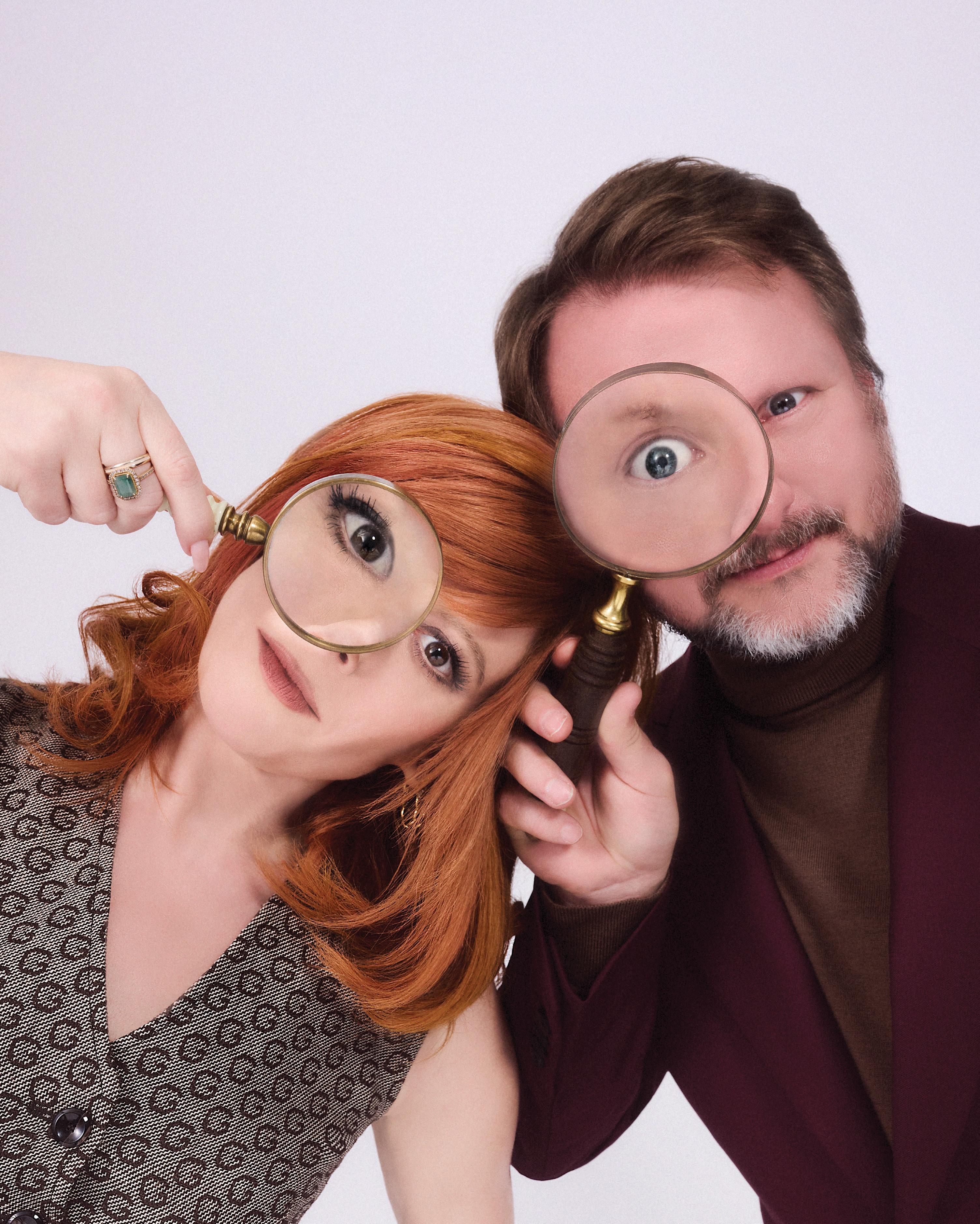
MAY 31, 2023 / EMMY PREVIEW
LIE SPY
Natasha Lyonne and Rian Johnson
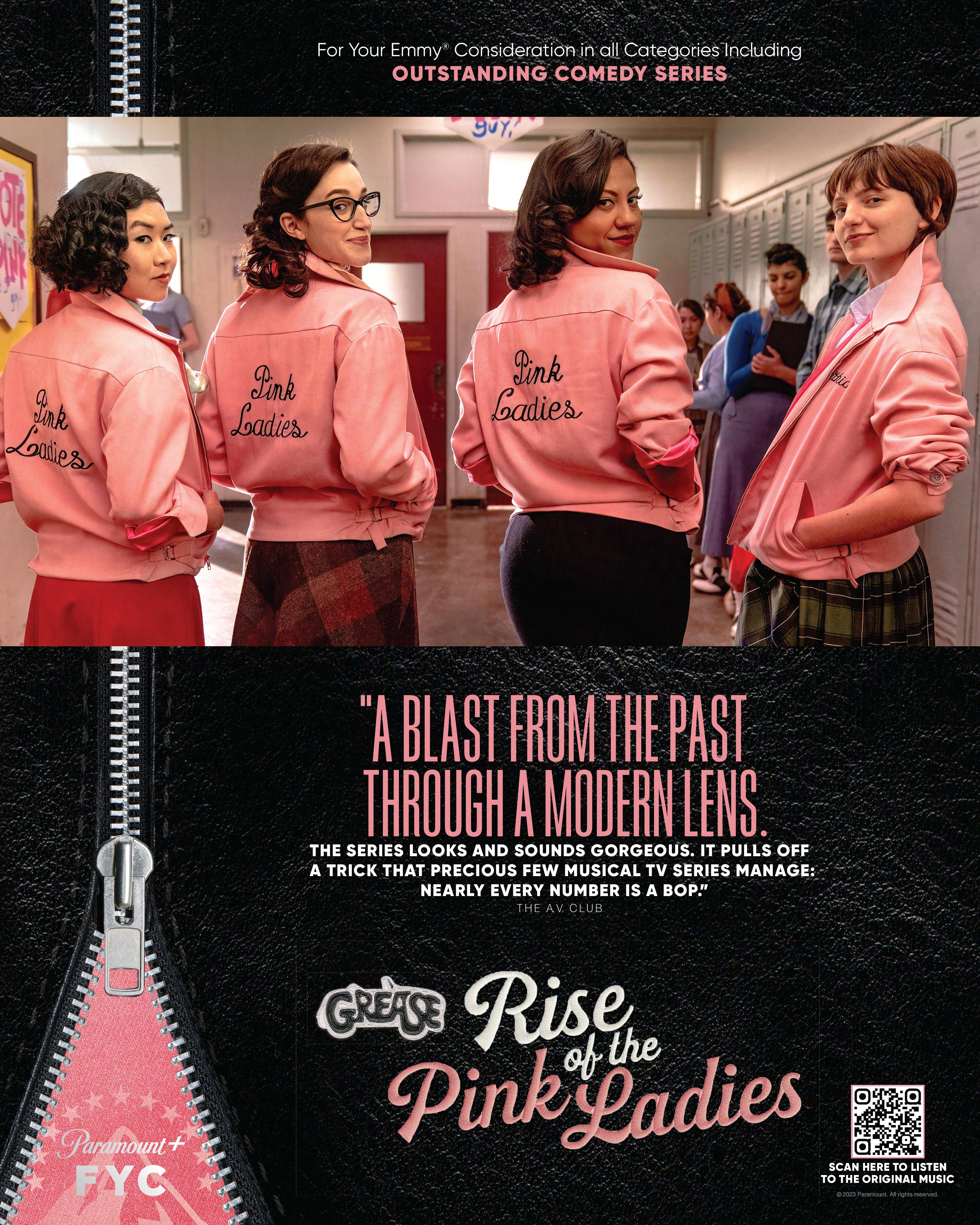
PRESIDENT Stacey Farish
EXECUTIVE AWARDS EDITOR
Joe Utichi
VICE PRESIDENT, CREATIVE
Craig Edwards
SENIOR AWARDS EDITOR
Antonia Blyth
TELEVISION EDITOR
Lynette Rice
FILM EDITOR
Damon Wise
DOCUMENTARY EDITOR
Matthew Carey
CRAFTS EDITOR
Ryan Fleming
PRODUCTION EDITOR
David Morgan
EDITORIAL ASSISTANT
Destiny Jackson
DIRECTOR, SOCIAL MEDIA
Scott Shilstone
DIRECTOR, EVENTS
Sophie Hertz
DIRECTOR, BRAND MARKETING
Laureen O’Brien
EVENTS MANAGER
Allison DaQuila
VIDEO MANAGER
David Janove
VIDEO PRODUCERS
Benjamin Bloom
Jade Collins
Shane Whitaker
DESIGNERS
Catalina Castro
Grant Dehner
SOCIAL MEDIA COORDINATOR
Natalie Sitek
DESIGN/PRODUCTION COORDINATOR
Paige Petersen
CHIEF PHOTOGRAPHER
Michael Buckner
PUBLISHER
Kasey Champion
SENIOR VICE PRESIDENT, GLOBAL BUSINESS
DEVELOPMENT & STRATEGIC PARTNERSHIPS
Céline Rotterman
VICE PRESIDENT, ENTERTAINMENT
Caren Gibbens
VICE PRESIDENT, INTERNATIONAL SALES
Patricia Arescy
VICE PRESIDENT, SALES & EVENTS
Tracy Kain
SENIOR DIRECTOR, ENTERTAINMENT
Brianna Corrado
DIRECTOR, ENTERTAINMENT
London Sanders
DIRECTOR, DIGITAL SALES PLANNING
Letitia Buchan
ACCOUNT EXECUTIVE
Michael Bronstein
SENIOR DIGITAL ACCOUNT MANAGER
Cherise Williams
SALES PLANNER
Luke Licata
SALES ASSISTANT
Daryl Jeffery
PRODUCTION DIRECTOR
Natalie Longman
DISTRIBUTION DIRECTOR
Michael Petre
PRODUCTION MANAGER
Andrea Wynnyk
CO-EDITORS-IN-CHIEF Nellie Andreeva (Television)
Mike Fleming Jr. (Film)
AWARDS COLUMNIST & CHIEF FILM CRITIC
Pete Hammond
COLUMNIST & INTERNATIONAL EDITOR-AT-LARGE
Baz Bamigboye
EXECUTIVE MANAGING EDITOR
Patrick Hipes
EDITORIAL DIRECTOR & BOX OFFICE EDITOR
Anthony D’Alessandro
SENIOR EDITOR, LEGAL & TV CRITIC
Dominic Patten
SENIOR MANAGING EDITOR
Denise Petski
MANAGING EDITOR
Erik Pedersen
DEPUTY MANAGING EDITOR
Tom Tapp
TELEVISION EDITOR
Peter White
INTERNATIONAL EDITOR
Andreas Wiseman
BUSINESS EDITOR
Dade Hayes
EDITOR-AT-LARGE
Peter Bart
FILM CRITIC & COLUMNIST
Todd McCarthy
EXECUTIVE EDITOR
Michael Cieply
SENIOR FILM WRITER
Justin Kroll
CO-BUSINESS EDITOR
Jill Goldsmith
LABOR EDITOR
David Robb
POLITICAL EDITOR
Ted Johnson
INTERNATIONAL TELEVISION CO-EDITOR
Max Goldbart
INTERNATIONAL FEATURES EDITOR
Diana Lodderhose
INTERNATIONAL BOX OFFICE EDITOR & SENIOR CONTRIBUTOR
Nancy Tartaglione
INTERNATIONAL TELEVISION CO-EDITOR
Jesse Whittock
INTERNATIONAL INVESTIGATIONS EDITOR
Jake Kanter
ASSOCIATE EDITOR & FILM WRITER
Valerie Complex
BROADWAY AND NEW YORK NEWS EDITOR
Greg Evans
ASSOCIATE EDITOR
Bruce Haring
CONTRIBUTING EDITOR, ASIA
Liz Shackleton
ASSOCIATE EDITOR, TV
Rosy Cordero
SENIOR INTERNATIONAL FILM CORRESPONDENT
Melanie Goodfellow
FILM REPORTER
Matt Grobar
INTERNATIONAL FILM REPORTER
Zac Ntim
TELEVISION REPORTER
Katie Campione
NIGHTS AND WEEKENDS EDITOR
Armando Tinoco
PHOTO EDITOR
Robert Lang
DEADLINE.COM
Breaking News Follow Deadline.com 24/7 for the latest breaking news in entertainment.
Sign up for Alerts & Newsletters
Sign up for breaking news alerts and other Deadline newsletters at: deadline.com/newsletters
VIDEO SERIES
The Actor’s Side
Meet some of the biggest and hardest working actors of today, who discuss their passion for their work in film and television. deadline.com/vcategory/ the-actors-side/
Behind the Lens
Explore the art and craft of directors from first-timers to veterans, and take a unique look into the world of filmmakers and their films. deadline.com/vcategory/ behind-the-lens/
The Film That Lit My Fuse
Get an insight into the creative ambitions, formative influences, and inspirations fuelling today’s greatest screen artists. deadline.com/vcategory/ the-film-that-lit-my-fuse/
PODCASTS
20 Questions on Deadline
Antonia Blyth gets personal with famous names from both film and television. deadline.com/tag/ 20-questions-podcast/
Scene 2 Seen Valerie Complex offers a platform for up-and-comers and established voices. deadline.com/tag/ scene-2-seen-podcast/
Crew Call Anthony D’Alessandro focuses on the contenders in the below-the-line categories. deadline.com/tag/ crew-call-podcast/
CHAIRMAN & CEO
Jay Penske
VICE CHAIRMAN
Gerry Byrne
CHIEF OPERATING OFFICER
George Grobar
CHIEF FINANCIAL OFFICER
Sarlina See
CHIEF DIGITAL OFFICER
Craig Perreault
EXECUTIVE VICE PRESIDENT, BUSINESS AFFAIRS & CHIEF LEGAL OFFICER
Todd Greene
EXECUTIVE VICE PRESIDENT, OPERATIONS & FINANCE
Paul Rainey
EXECUTIVE VICE PRESIDENT, OPERATIONS & FINANCE
Tom Finn
EXECUTIVE VICE PRESIDENT, PRODUCT & ENGINEERING
Jenny Connelly
MANAGING DIRECTOR, INTERNATIONAL MARKETS
Debashish Ghosh
EVP, GM OF STRATEGIC INDUSTRY GROUP
Dan Owen
SENIOR VICE PRESIDENT, SUBSCRIPTIONS
David Roberson
SENIOR VICE PRESIDENT, PROGRAMMATIC SALES
Jessica Kadden
SENIOR VICE PRESIDENT, DEPUTY GENERAL COUNSEL
Judith R. Margolin
SENIOR VICE PRESIDENT, FINANCE
Ken DelAlcazar
SENIOR VICE PRESIDENT, HUMAN RESOURCES
Lauren Utecht
SENIOR VICE PRESIDENT, BUSINESS DEVELOPMENT
Marissa O’Hare
SENIOR VICE PRESIDENT, CREATIVE
Nelson Anderson
SENIOR VICE PRESIDENT, LICENSING & BRAND DEVELOPMENT
Rachel Terrace
VICE PRESIDENT, ASSOCIATE GENERAL COUNSEL
Adrian White
VICE PRESIDENT, HUMAN RESOURCES
Anne Doyle
VICE PRESIDENT, REVENUE OPERATIONS
Brian Levine
HEAD OF INDUSTRY, CPG AND HEALTH
Brian Vrabel
VICE PRESIDENT, PUBLIC AFFAIRS & STRATEGY
Brooke Jaffe
HEAD OF INDUSTRY, TECHNOLOGY
Cassy Hough
VICE PRESIDENT, SEO
Constance Ejuma
VICE PRESIDENT & ASSOCIATE GENERAL COUNSEL
Dan Feinberg
VICE PRESIDENT, MARKETING, STRATEGIC SOLUTIONS GROUP
Denise Tooman
HEAD OF LIVE EVENT PARTNERSHIPS
Doug Bandes
VICE PRESIDENT, AUDIENCE MARKETING & SPECIAL PROJECTS
Ellen Deally
VICE PRESIDENT, GLOBAL TAX
Frank McCallick
VICE PRESIDENT, TECHNOLOGY
Gabriel Koen
VICE PRESIDENT, BUSINESS INTELLIGENCE
Greta Shafrazian
VICE PRESIDENT, E-COMMERCE
Jamie Miles
HEAD OF INDUSTRY, TRAVEL
Jennifer Garber
VICE PRESIDENT, ACQUISITIONS & OPERATIONS
Jerry Ruiz
VICE PRESIDENT, PRODUCTION OPERATIONS
Joni Antonacci
VICE PRESIDENT, FINANCE
Karen Reed
VICE PRESIDENT, BUSINESS DEVELOPMENT
Katrina Barlow
VICE PRESIDENT, INFORMATION TECHNOLOGY
Kay Swift
VICE PRESIDENT, HUMAN RESOURCES
Keir McMullen
SOCIAL MEDIA Follow Deadline
Facebook.com/Deadline
Instagram.com/Deadline Twitter.com/Deadline
YouTube.com/Deadline TikTok.com/@Deadline
HEAD OF AUTOMOTIVE INDUSTRY
Matthew Cline
VICE PRESIDENT, STRATEGIC PLANNING & ACQUISITIONS
Mike Ye
VICE PRESIDENT, PRODUCT DELIVERY
Nici Catton
VICE PRESIDENT, CUSTOMER EXPERIENCE & MARKETING OPERATIONS
Noemi Lazo
HEAD OF INDUSTRY, PERFORMANCE MARKETING
Scott Ginsberg
VICE PRESIDENT, ASSOCIATE GENERAL COUNSEL
Sonal Jain
DEADLINE HOLLYWOOD IS OWNED AND PUBLISHED BY PENSKE MEDIA CORPORATION
CALL SHEET
First Take
4 HANNAH WADDINGHAM: Why the Ted Lasso star and 2023 Eurovision host is the very height of fashion.
8 QUICK SHOTS: Toni Ireland twists the knife on Traitors and Carl Herse writes Barry’s final act.
10 BLOOD WORK: Emmy documentary contenders discover that crime pays. 14 THE ART OF CRAFT: Production designer Mark Scruton kept things spooky and altogether ooky for Wednesday’s Nevermore.
Cover Story
18 JUST ONE MORE THING: Poker Face creator Rian Johnson and star Natasha Lyonne channel the spirit of Colombo to breathe new life into the classic TV mystery of the week.
Dialogue
Craft Services
52 CREDIT WHERE IT’S DUE: The title designers carving a new creative path from known entities.
Contenders TV Portrait Gallery

58 At Deadline’s biggest television event of the season.
Flash Mob
70 SOUND & SCREEN TV: The Deadline team highlights the best and brightest in music.
ON THE COVER: Natasha Lyonne and Rian Johnson photographed by Andrew Zaeh exclusively for Deadline.
34 GABRIELLE DENNIS 36 JASON SEGEL 40 EBON MOSS-BACHRACH 44 SHERYL LEE RALPH 48 UTKARSH AMBUDKAR
MICHAEL BUCKNER FOR DEADLINE

F T I A R K S E T
 By Lynette Rice
How Hannah Waddingham went from the stage to the locker room in Ted Lasso
By Lynette Rice
How Hannah Waddingham went from the stage to the locker room in Ted Lasso
QUICK SHOTS 8 | EMMY DOCUMENTARIES 10 | THE ART OF CRAFT 14 4 DEADLINE.COM/AWARDSLINE APPLE TV+/DAVID M. BENETT/GETTY IMAGES
Go ahead, gals—crush on Hannah Waddingham. She’s used to it by now.
Ever since the English actress debuted in 2020 as Rebecca Welton on Apple TV+’s Ted Lasso, Waddingham has achieved rock star status among viewers (particularly the female ones) who think she’s as much, if not more, of a baller than her players at AFC Richmond.
“It is quite common for me to receive lovely messages from women all over the world,” Waddingham says. “And I tell you, it makes my day, especially when people on the street go, ‘Sorry, can I just say thank you?’ Yep. You can absolutely say that. I’m going to take it all in.”
In fact, Waddingham has become something of a secret weapon on Ted Lasso , which just wrapped its third (and possibly final?) season on the streamer. Although Jason Sudeikis’s portrayal of an aw-shucks college football coach from Kansas has everyone
second-guessing whether nice guys actually do finish last, Rebecca’s journey from broken-hearted divorcée to self-assured owner of a Premier League soccer club has become the most appealing part of the comedy from Bill Lawrence, Joe Kelly and Brendan Hunt.
And if you think Ted Lasso is just a show about a bunch of goofballs kicking around a soccer ball, think again.
“Obviously, we have magnificent women in the writers’ room. But in terms of female empowerment, we have staunch feminists in the men who write Ted Lasso,” says Waddingham, who became the third actor on the show, behind Sudeikis and co-star Brett Goldstein (Roy Kent), to win an Emmy in 2021. “We all come out about female empowerment, and I think that’s valuing the equality that there should be between men and women.”

Up until she took over the fictitious front office of AFC Richmond, Waddingham worked primarily as a stage actress on London’s West End and Broadway. As the daughter of opera singer Melodie Kelly, Waddingham’s exquisite set of pipes helped her land roles in musicals like Spamalot, A Little Night Music and Into the Woods, along with a small role in the 2012 film Les Misérables. “It was utterly satisfying,” recalls Waddingham about her career up until that point, which included three nominations for the prestigious Laurence Olivier Award for Best Actress in a Musical. “But it was missing that nth degree.”
That finally came in 2014 when Waddingham auditioned for Septa Unella, a sanctimonious, bell-ringing shrew who shamed Lena Headey’s Cersei Lannister in Season 5 of Game of Thrones . Lucky for Waddingham
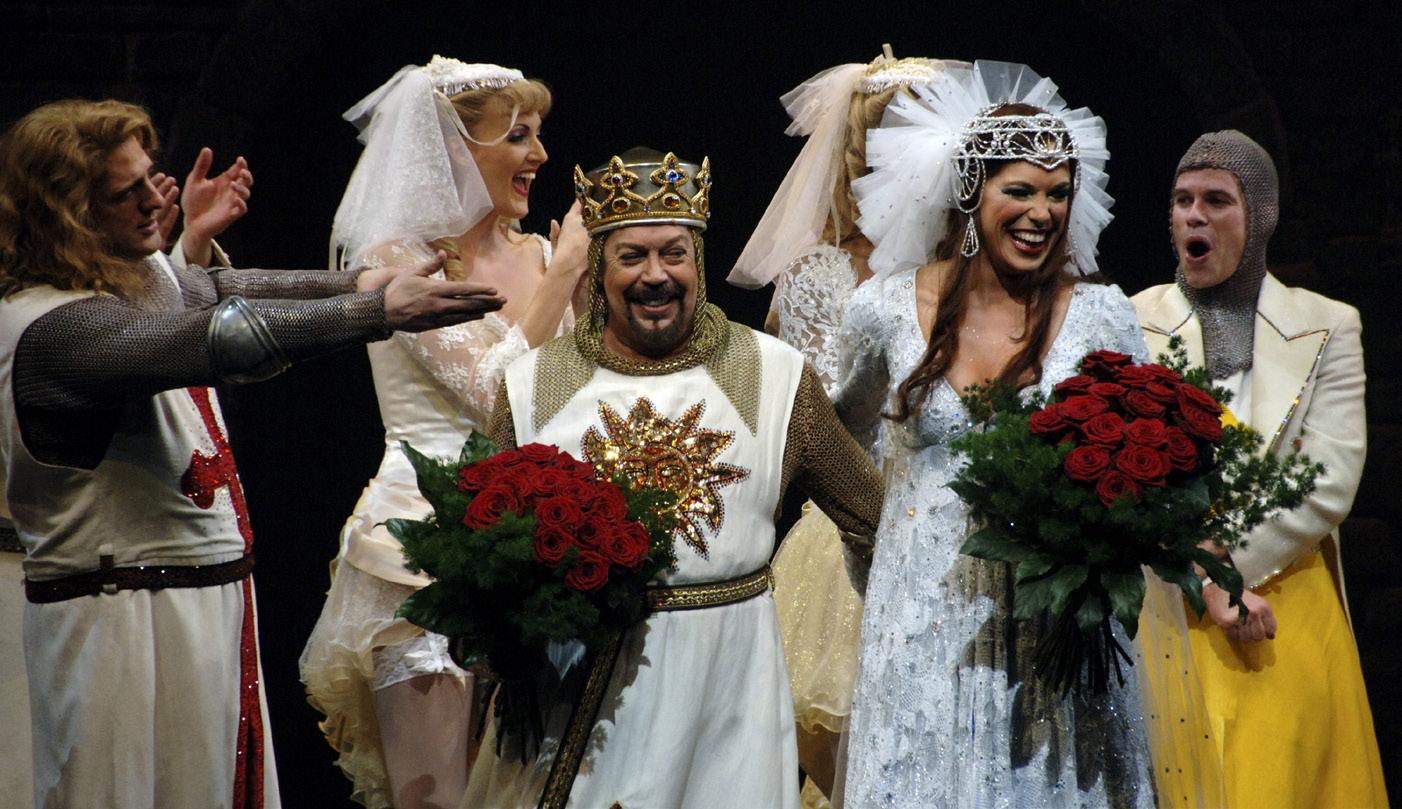
at the time, the producers paid more attention to her steely resolve and stature (she’s 6 feet 2 inches in heels) than the fact she was eight-and-a-half months pregnant with her daughter. (Waddingham has previously spoken about feeling like she was in the wrong place at the wrong time because every other actress auditioning for Septa Unella was over 70, “5 foot 2 and about 20 feet wide.”) Those eight episodes as a headwrap-wearing member of the Most Devout ended up becoming the most indelible role of Waddingham’s career—that is, until Ted Lasso came along.
“I would say it started with Game of Thrones in terms of recognition and a door opening, but I’m not going to lie, Jason Sudeikis then blew it off its hinges,” remembers Waddingham.
When viewers first met Rebecca, the statuesque divorcée was a sight to behold—a full-blown fashionista with clothes “tailored within an inch of their lives.” That was all by design. “I very much always saw that as her armor,” says Waddingham, who credits costume designer Jacky Levy with doing a lot of the heavy lifting. “I went off the basis that she in no way had ever wanted to be a football club owner. But if she’s going to walk into a room, she’d better at least give off the ‘don’t screw with me [vibe]’, even if no part of her is feeling it on any given day. Certainly through Season 1 and Season 2, I very much wanted her to be seen as an impenetrable kind of ice cream.”
Something definitely changed with Rebecca in Season 3, and not just in the breezy way she wore her hair or dressed at work. In Episode 2, Rebecca mustered the gumption to steal a star player named Zava (Maximilian Osinski) away from her ex-husband Rupert. Right before she pulled off the impossible, she shared a vulnerable moment with Keeley (Juno Temple) by recounting how her ex wooed her for weeks before she finally agreed to date him.
“Of all people that she’s going to surrender that information to, it had to be Keeley,” explains Waddingham. “She uses that parallel of surrender as her strength to go and get Zava.”
Even better, it started to look like our heroine was finally going to get her happily ever after this season.
Tim Curry and Waddingham in Spamalot
DEADLINE.COM/ AWARDSLINE 5
Jeremy Swift and Hannah Waddingham in Ted Lasso
Though she wanted to ignore the prognostications of her mom’s kooky psychic, Rebecca ended up having a romantic fling with a sexy, boat-owning Dutchman (Matteo van der Grijn).
“He is such a gorgeous gentleman. I had known of him from his musical theater background. So, he and I immediately had so much to talk about and immediately felt at ease with each other,” Waddingham says. “It’s a very difficult part to cast when the audience is so invested in Rebecca’s journey. Who could possibly be right for her, or who should be brought into her life for however long or short time? I just feel like they got it bang on.”
In other words, a perfect way to end a comedy that has yet to officially receive a fourth season, right? “I mean, who knows?” teases Waddingham, who prefers to focus on how good she’s got it now. (Sudeikis has been equally coy with journalists about the future of his Emmy-winning comedy). “The writer’s room, oh my god. They literally pull at everyone’s heartstrings as well as mine, at any given moment. I can’t speak highly enough about them, watching them completely twist and turn all of our hearts and heads.”


And oh, what they have done for her career. After wrapping her day job on Ted Lasso, Waddingham joined PBS Masterpiece’s Tom Jones, an adaptation of the Henry Fielding comic novel about an illegitimate young man who falls for a beautiful heiress. Waddingham plays Lady Bellaston, a conniving seductress who tries to undermine the title character’s relationship with the beautiful Sophie.
“This is probably a part that I’ve enjoyed playing more than anything because it’s such a marriage of my theater world and TV, says Waddingham. “The enormity and the grandeur and the brattiness of her. Oh my god, honestly, I just want everyone to watch it because it’s a refreshing moment for me to be absolutely vile. I feel like we’ve all got a little gentle bit of Lady Bellaston in all of us every now and again. When you feel like you’ve been usurped by someone, you know, you just feel like having a bit of a tantrum and spitting some acid while looking fabulous.”
After co-hosting the Eurovision Song Contest in early May, Waddingham is now turning her attention to a Christmas special she’ll sing in and executive produce for Apple TV+. Dubbed Hannah Waddingham: Home for Christmas, the special will feature surprise guests in performances and will be recorded live in
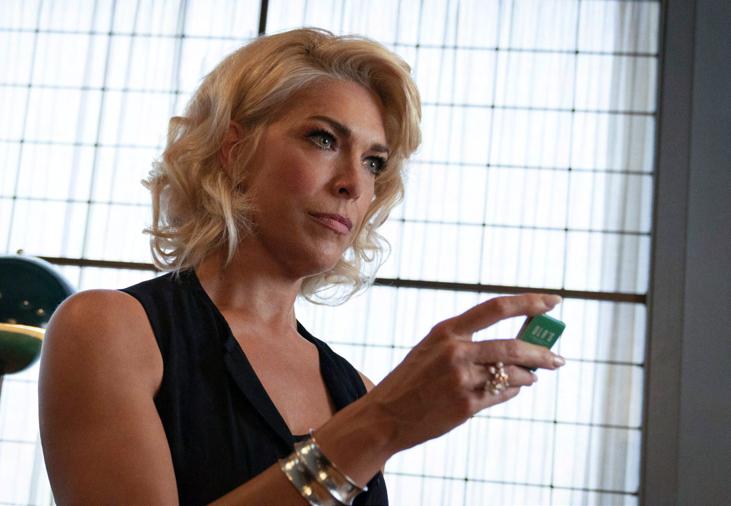
front of an audience at the London Coliseum. Waddingham—who boasts a four-octave range—will also sing and be accompanied by her big band.
“The month of May was like, ‘Hannah, sleep when you can, lady because May is a beast.’” But the actress is far from complaining, even though such gigs take her away from her beloved daughter and her “beautiful, golden baby” Emmy Award, that currently rests on a sideboard next to lots of family pictures.
“I do find that when people come in and say, ‘Oh, is that the Emmy? Can I pick it up?’ What I say is, ‘Yes, you can.’ What I really want to say is ‘get your dirty hands off, don’t touch my beautiful golden baby,’” laughs Waddingham.
“I mean, it’s just crazy. Everything that’s happened off the back of Ted Lasso has, I’m not going to lie, been quite a long time coming in my life,” says Waddingham, who wouldn’t mind “shoehorning” herself next into an episode or two of ABC’s Abbott Elementary and the Australian comedy Colin From Accounts. “Even though I’ve had a great career, where I find myself largely because of Ted Lasso, I could never have dreamt that it would all come my way.”
FT CLOSE-UP
A
From left: Waddingham; with Juno Temple as Keeley Jones in Ted Lasso
6 DEADLINE.COM/ AWARDSLINE APPLE TV+/RICH FURY/GETTY IMAGES
From left: Phil Dunster, Brett Goldstein, Waddingham, Jason Sudeikis, Juno Temple, Nick Mohammed and Brendan Hunt.

The Traitors EP Toni Ireland made a unique version of the reality competition for an American audience
stood out in the crowd. “It was really important that it looked really cinematic,” she says, “and having the mixed cast of reality stars and everyday people was essential.”
The Traitors brings together a group of everyday people and reality TV stars in an elaborate murder-mystery competition hosted by Alan Cumming.
to the overall game a bit more. Are there any traitors left?” This question led to a finale where the group needs to unanimously decide to either trust their fellow finalists and split the money or call for another elimination vote if they believe a traitor is still among them.
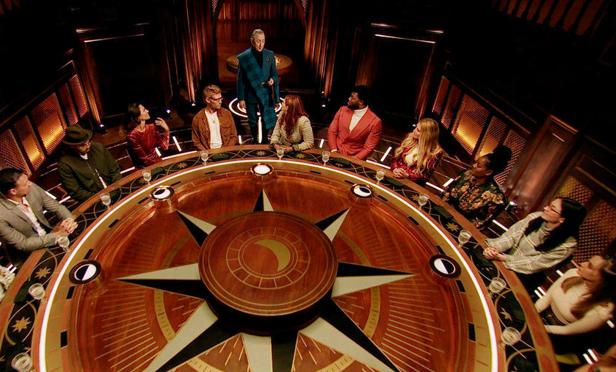
Charted Territory
Comedy
The positive response to the Dutch reality series De Verraders has brought different versions of The Traitors to many countries, but executive producer Toni Ireland says the biggest challenge for her was to ensure that the U.S. production
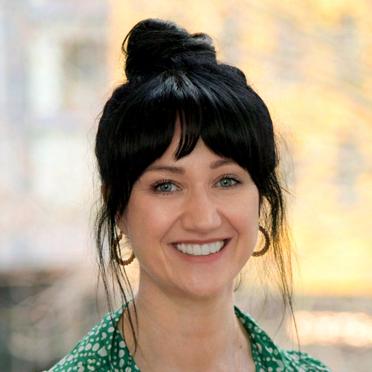

Deadly Deceptions Visual Writing
Perhaps the biggest change in the U.S. series was in how the game ended, which led to a shocking finale. “The end game in The Netherlands was a sort of prisoner’s dilemma of sharing or not sharing at the end, and we felt that we could develop something that spoke
A second season of the series is being planned now, and Ireland is excited to see a new set of contestants who think they know what to expect. “The next cast will be playing with prior knowledge,” she says. “It’s our job to put in a few twists and turns to make sure they don’t know everything about what’s coming.” —Ryan
Fleming
Barry cinematographer Carl Herse on working alongside Bill Hader for the final season
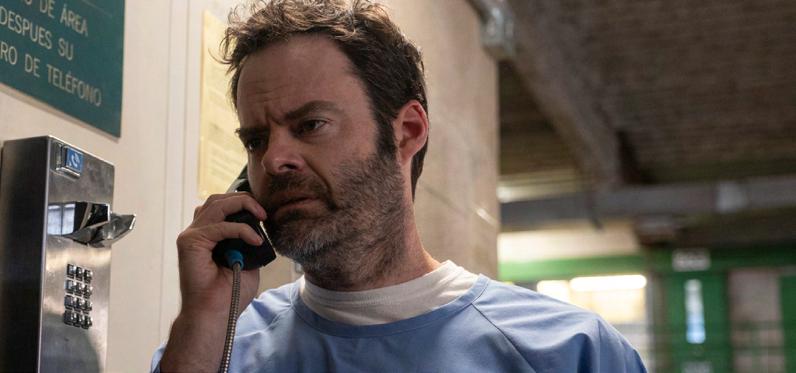
For the final season of Barry, cinematographer Carl Herse had the opportunity to work alongside only one director, Bill Hader, for the entire season. “Bill has a very strong visual component to how he wants to tell the story,” Herse says. “He can just pursue the vision that
he wants, and he’s really strong at taking a page of dialogue and reducing it down to an image.”
After an escape from prison midseason, the story jumps forward 10 years, which presented an interesting challenge for Herse, who needed to visually “express that time
passed, but still make the show feel like Barry.” Their solution was to focus on Barry and Sally, rather than all of the major characters, and build out from there.
Although ending the show is bittersweet for Herse, he says he couldn’t be happier with how it ends. “The final moments of our show do a wonderful job of not just wrapping up the story but being a thesis statement about what the themes of the show have been and what the story’s really been about.”
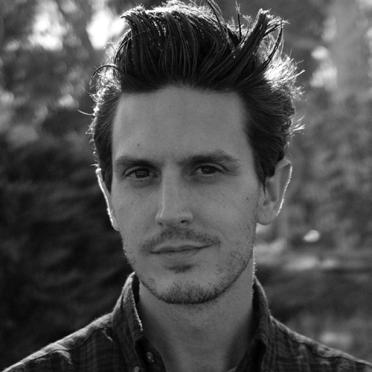 —Ryan Fleming
—Ryan Fleming
1 Jeremy Allen White The Bear ODDS 19/5 2 Jason Sudeikis Ted Lasso ODDS 39/10 3 Bill Hader Barry ODDS 9/2 4 Steve Martin Only Murders in the Building ODDS 13/2 5 Martin Short Only Murders in the Building ODDS 19/2
Series At press time, here is how Gold Derby’s experts ranked the Emmy chances in the Best Comedy Series, Comedy Actor and Actress races. Get up-todate rankings and make your own predictions at GoldDerby.com
FT QUICK SHOTS MERRICK MORTON/HBO/PEACOCK
The Traitors
Barry 8 DEADLINE.COM/ AWARDSLINE Comedy Series Actress 1 Quinta Brunson Abbott Elementary ODDS 18/5 2 Jenna Ortega Wednesday ODDS 11/2 3 Natasha Lyonne Poker Face ODDS 6/1 4 Rachel Brosnahan The Marvelous Mrs. Maisel ODDS 13/2 5 Christina Applegate Dead to Me ODDS 7/1 1 Ted Lasso ODDS 9/2 2 Abbott Elementary ODDS 11/2 3 The Bear ODDS 6/1 4 Only Murders in the Building ODDS 17/2 5 Barry ODDS 17/2
Actor
Comedy Series

MURDER, MISCHIEF AND MAYHEM
True crime stories are making a bid for Emmy documentary glory
 By Matt Carey
By Matt Carey
Gruesome tales of grisly murder. Horror stories of kids in cults. False confessions and authentic admissions.
True crime has taken over the documentary space, proving a reliable audience attractor for streaming platforms, network and cable channels. While it’s the most popular genre within nonfiction programming broadly speaking, whether that will translate to success with Emmy voters remains an open question. One thing’s for certain: there’s no lack of contenders—twisted tales dripping with blood.
Netflix leads the way with multiple suitors, among them Conversations with a Killer: The Jeffrey Dahmer Tapes, the grim story of one of America’s most notorious serial killers, built largely around recorded interviews between Dahmer and one of his young defense attorneys in the early 1990s. It’s directed and executive produced by Oscar-nominated and Emmy-winning filmmaker Joe Berlinger, one of the leading figures in documentary.
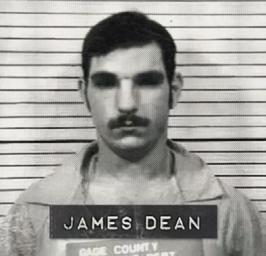

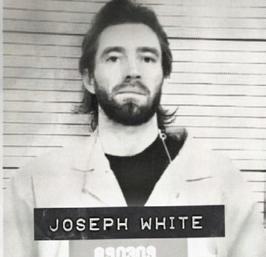

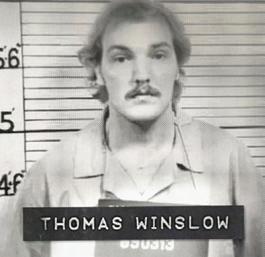

“As a storyteller, I thought the tapes provided incredible insight into Dahmer and this unique characteristic of him actually being very forthright,” Berlinger notes, contrasting Dahmer’s open admission of his lurid crimes to the obfuscation of serial killers Ted Bundy and John Wayne Gacy, subjects of earlier Berlinger docuseries for Netflix. “Both of those serial killers [Gacy and Bundy] were very unreliable narrators. So, you had to separate the truth from the bravado and the false information.”
Berlinger has directed films on many subjects, from the Armenian genocide to Metallica, but he’s become closely associated with true crime, beginning with his 1992 film Brother’s Keeper , co-directed by Bruce Sinofsky. He sees no reason the topic should be deemed less worthy of serious scrutiny than any other socially relevant subject.
“Unfortunately, serial killing is part of the human condition,” he says. “Doing bad things to other people is part of the human condition. People do wonderful things and people do terrible things, which is why I think we need to tell these stories, and why the criticism about not telling these stories I scratch my head over. Of course, you have to do it responsibly. You have to think about the victims. But greed, love, ambition, killing, I mean, these are all part of the human condition. So, why do we say we can’t tell these kinds of stories? It’s part of who we are, unfortunately.”
The Netflix Emmy contender Murdaugh Murders: A Southern Scandal, might be said to involve equal parts greed, love, ambition and killing. The three-part series directed by Jenner Furst and Julia Willoughby Nason takes on one of the most sensational murder cases in recent years, one that saw prominent South Carolina attorney Alex Murdaugh accused in the shocking deaths of his wife and son. In March, he was sentenced to life in prison for shooting his wife with a rifle and blasting his son with a shotgun.
Nason says true crime resonates with audiences in part because of the violent nature of American society.
“Everyone can relate to it unfortunately, with these mass shootings, et cetera,” she says. “I think that’s why true crime is so reliable as a medium of entertainment in the documentary golden age.”
One of the strongest true crime-related contenders comes from acclaimed filmmaker Nanfu Wang, who has twice been shortlisted for the Academy Award. She made her first foray into the genre with HBO’s Mind Over Murder , a six-part series about the ‘Beatrice Six ’ who were convicted of murdering a Nebraska woman in 1985. None of them had anything to do with the crime, yet five of the six confessed under pressure from an investigator and a police psychologist who used dubious methods to implant false memories of them participating in the murder. Even after they were exonerated, some of the Beatrice Six still felt convinced they had kill ed 68-y ear-old Helen Wilson.
FT FEATURE
HBO/NETFLIX
The ‘Beatrice Six’ from Mind Over Murder.
10 DEADLINE.COM/ AWARDSLINE
Conversations With a Killer: The Jeffrey Dahmer Tapes

“To me, it has always been a story about the malleability and fallibility of memory,” Wang says. “We’re looking at it through a criminal case where six people were wrongfully convicted for murder, but yet many of them remembered and still have a memory of being at the murder. And we look at how false memory formed and what it takes to change people’s minds.”
MTV Documentary Films competes for Emmys with The Fire That Took Her , the hideous story of Judy Malinowski, an Ohio woman and mother of two who became romantically entangled with a man named Michael Slager. During an argument outside a Speedway station, he soaked her with gasoline and set her ablaze.
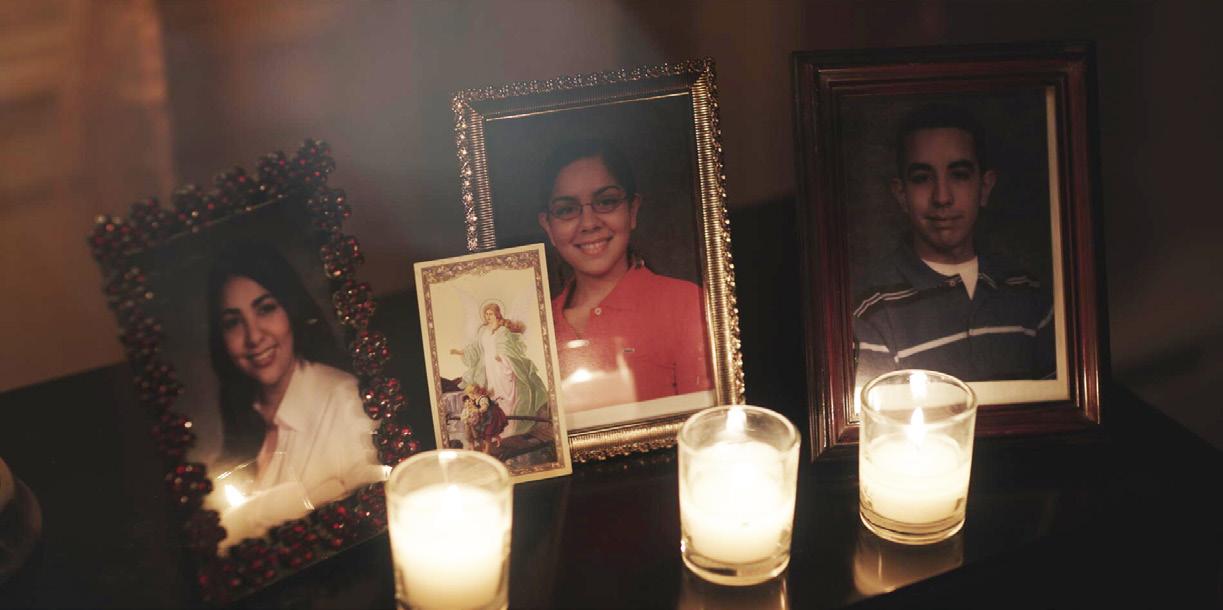
Malinowski, horribly burned, survived for nearly two years; Slager is serving a life sentence for killing her, the key evidence provided by Malinowski from beyond the grave. In the film directed by Patricia Gillespie, Malinowski’s mother explains that authorities “approached Judy about testifying to her own homicide. It was a longshot because it had never been done.”
One of the thriving sub-genres within true crime focuses on cults and cult-like institutions. The Netflix Emmy contender Keep Sweet: Pray and Obey documents the case against Warren Jeffs, leader of the Fundamentalist Church of Jesus Christ of Latter-day Saints (FLDS), an offshoot of mainstream Mormonism that clings religiously to plural marriage. Jeffs himself took at least 78 wives, two dozen of them under the age of 17.
Jeffs assumed command of the church after the death of his father, Rulon Jeffs, and wielded total control over his flock. In the four-part series directed by Rachel Dretzin and Grace McNally, one ex-FLDS woman says, “In our minds the police, even the President of the United States, had no authority over us. Warren Jeffs is our president; he was the prophet. And how could you place a human over god?”
Hulu’s Stolen Youth: Inside the Cult at Sarah Lawrence, delves into a bizarre story with origins at the titular elite private college in Yonkers, New York. In 2010, Larry Ray, recently released from prison, moved into his daughter’s dorm at Sarah Lawrence. That was odd enough, but things only got weirder as Ray began conducting therapy sessions with his young dormmates and in no time had gained psychological hegemony over several of them. Says filmmaker Zach Heinzerling, “Any number of individuals from very different backgrounds and very different circumstances ended up becoming sort of absorbed by his manipulative control.”
Ray convinced one his roomies that she had engaged in an elaborate poisoning scheme. To pay for her ‘crimes’, he induced her to become a high-priced call girl, with him as the main beneficiary of her millions in earnings.
Ray filmed many of his encounters with his vulnerable charges, during which they admitted their supposed misdeeds. He gave the videos to Heinzerling, believing they established his innocence.
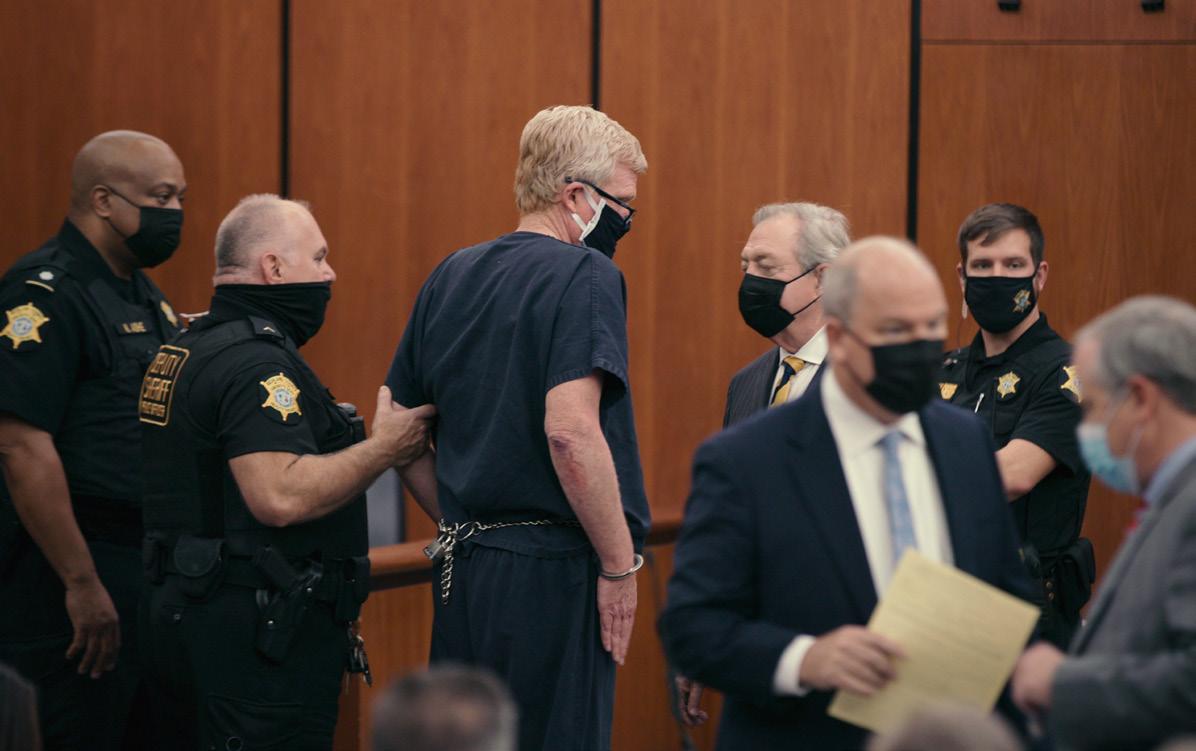
“He labeled them as confessions. Actually, they were forced interrogation sessions—a form of gaslighting, manipulation and control which was very obvious to anyone listening to them,” Heinzerling says. “The great irony is that all of these recordings that Larry either made himself or had the survivors make ended up making it extremely easy for the government to convict him.”
True crime docs go over well with viewers, but Emmy recognition has been fitful. Wi ld Wild Country, the 2018 Netflix multi-parter about a cult-like compound in rural Oregon founded by Indian guru Bhagwan Shree Rajneesh, won Outstanding Documentary or Nonfiction Series. Mega-hit Tiger King two years later earned six Emmy nominations but won zero. It was a similar story for last year’s The Tinder Swindler, a huge success for Netflix, which claimed five nominations but came away empty.

Many true crime films and series get no Emmy love at all. That was the case for HBO’s I Love You, Now Die, a 2019 docuseries about the notorious case of Michelle Carter, a Massachusetts teenager charged with urging her depressed boyfriend to take his own life. The series, directed by acclaimed true crime filmmaker Erin Lee Carr, earned excellent reviews, but that didn’t result in a single Emmy nomination.
“It’s difficult for true crime stuff to get nominated,” Carr acknowledged at the time. “And I hope that that changes.”
Whether it has changed will become more evident once this year’s Emmy nominees have been revealed. Nason, the co-director of Murdaugh Murders, sees no inherent Emmy bias against true crime and believes the genre deserves respect as substantive, not just entertaining.
“A lot of these true crimes have uncovered huge amounts of injustice,” she says. “And these documentaries essentially are challenging the system at play, challenging police departments, court systems, prison industrial complexes, domestic violence. I do think it has a huge part in social justice in a lot of ways, and that is something that really should be honored by any award vehicle.” A
FT FEATURE NETFLIX/HULU
Murdaugh Murders: A Southern Scandal Keep Sweet: Pray and Obey
12 DEADLINE.COM/ AWARDSLINE
Stolen Youth: Inside the Cult at Sarah Lawrence

THE ART OF CRAFT
How production designer Mark Scruton modernized “The Addams Family aesthetic” for Wednesday


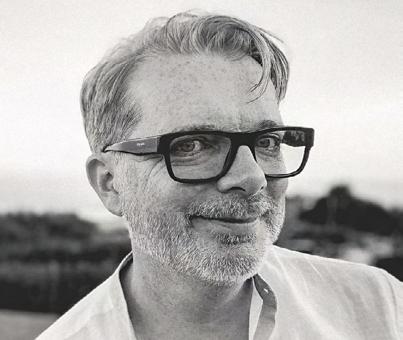
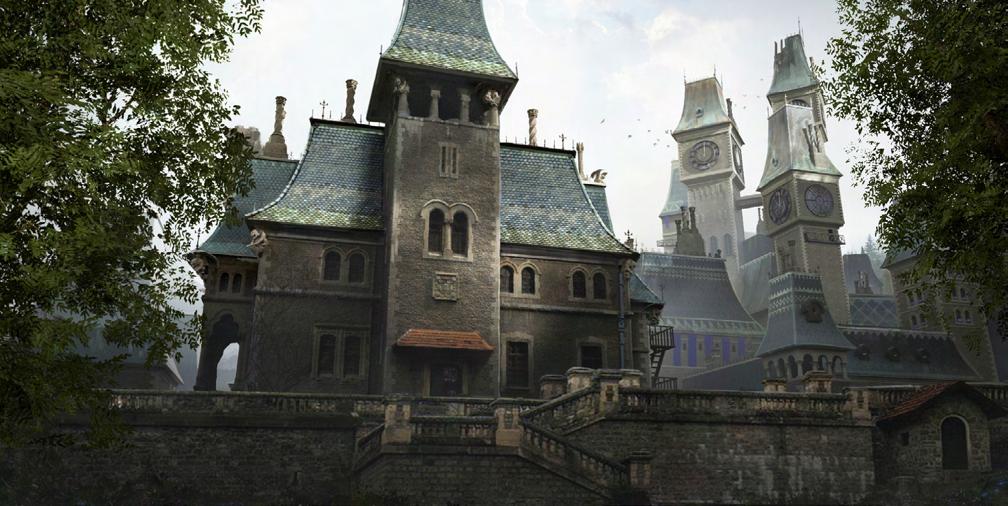 BY RYAN FLEMING
BY RYAN FLEMING
NEVERMORE
“Roof lines” were very important for the school, as Scruton says the drawn silhouette needed to have “Addams Family vibes”.

When the set was moved to Romania, the Ottoman influences of the structures gave Nevermore an “eclectic mix of styles” to match the mix of students.
Architectural moldings and brickwork were cast directly from the real location to recreate the indoor sets.
FT THE ART OF CRAFT
“It was always about silhouettes with Nevermore,” says production designer Mark Scruton. “If you just lit it from behind and you were left with a silhouette, would you understand what it was?”
COURTESY OF NETFLIX
Clockwise from above: concept drawing of the roof lines of Nevermore Academy; low angle view of Nevermore; Nevermore Academy layout.
14 DEADLINE.COM/ AWARDSLINE
Concept art of Nevermore Academy.

THE DORM
Scruton and the art department applied the color gels by hand to the large window to get a “clean split” in the light cast through glass.
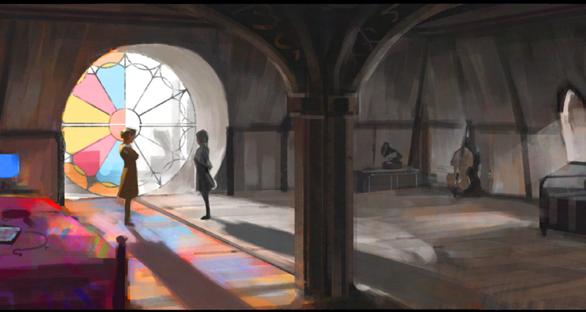
The composition of Enid’s half of the room was a challenge, as an overabundance of colorful items would create a “muddying” effect, so they needed to focus on accent colors.


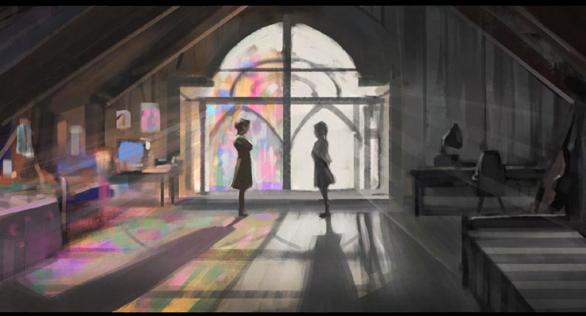
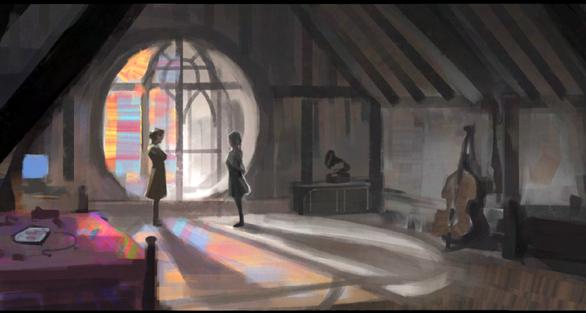
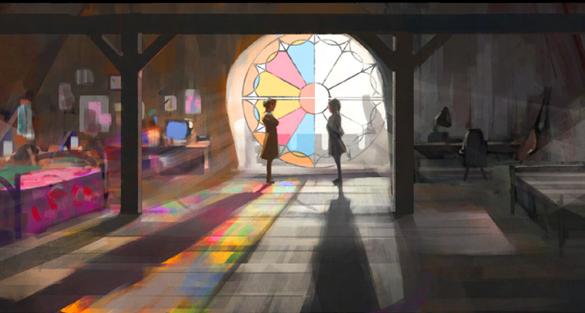
The items found on Wednesday’s side of the room were sourced from all over the world and originally bright and colorful. Scruton needed to desaturate the color by staining and dying the materials while maintaining the depth of texture.
Enid’s side was filled with miscellaneous items to fill the room with color, while Wednesday’s side only had items with a specific purpose, like the desk or bed.

COURTESY OF NETFLIX FT THE ART OF CRAFT
Different angles of the dividing line across the dorm.
From top: sketch of Enid's side of the room; Wednesday's side of the room.
16 DEADLINE.COM/AWARDSLINE
3D rendering of the balcony outside of Wednesday and Enid's dorm room.

NATASHA LYONNE + RIAN JOHNSON PHOTOGRAPHED EXCLUSIVELY FOR DEADLINE BY ANDREW ZAEH
During the pandemic, RIAN JOHNSON sought the comfort of his childhood favorite ‘mystery of the week’ TV shows, and so Poker Face emerged, his reimagining of a small screen detective: NATASHA LYONNE as Charlie Cale, a woman with an uncanny x-ray mind and Columbo-flavored charm. Along with a who’s who of guest stars, the writer-director and lead actor-EP dug deep into modernizing and paying tribute to a tried-and-true format. They describe its evolution to Antonia Blyth.
18 DEADLINE.COM/ AWARDSLINE
PROP STYLIST Anna Maltezos
PHOTO ASSISTANT Meredith Truax
DIGITAL TECH
Jack Mallett
NATASHA LYONNE
Hair: Peter Butler /Tracey Mattingly
Make-up: Alex Byrne /Walter
Schupfer Management
Nails: Sonya Meesh /Forward Artists

Styling: Cristina Ehrlich /The Only Agency
RIAN JOHNSON
Grooming: Melissa DeZarate /A-Frame
Styling: Mark Holmes /Art Department
In a studio overlooking Manhattan’s Fifth Avenue, Rian Johnson is strapped to a lie detector machine. Next to him at the controls sits Natasha Lyonne, twiddling the device’s knobs with all the sinister intent of a supervillain. This photoshoot tableau is, of course, ripped right from the Meet the Parents Ben Stiller-Robert De Niro interrogation scene. Next, in an homage to the pithiest of TV detective tropes, Lyonne will pose at a typewriter, fake-talking into a rotary-dial phone. The visual nod this time goes to Angela Lansbury as Jessica Fletcher in Murder, She Wrote.
In fact, the late, great Lansbury is connective tissue for Johnson and Lyonne. Lansbury and Lyonne appeared briefly together in Johnson’s film, Glass Onion: A Knives Out Mystery, on a Zoom call playing the mystery game Among Us with Daniel Craig’s Detective Benoit Blanc.
Little did we know back when that film premiered, that Johnson was sitting on an Easter egg with that scene. Only later, when he aired his debut television creation, Poker Face, would the presence of Lyonne in Glass Onion explain itself.
In Poker Face, Lyonne plays Charlie Cale, a woman who just knows when a person is lying. Her savant skill allows her to clean up at—you guessed it—poker, and in the process, she makes an enemy of an undesirable casino boss. But in classic ‘mystery of the week’ style, that’s just the ‘B’ plot rumbling in the background. As Charlie is forced to throw away her cellphone and go on the run, she cannot help but stumble upon liars at every small-town stop along the way. And where there are liars, there are, coincidentally, many murders for her to solve. From a couple of geriatric terrorists (Judith Light and S. Epatha Merkerson), to a tortured vegan BBQ chef (Larry Brown), a manipulative monster mastermind (Cherry Jones), and her victim (Nick Nolte) in an episode Lyonne co-wrote and directed, each episode is standalone satisfying and oftentimes hilarious in a way we haven’t seen since the likes of Magnum P.I., The A-Team or the original Quantum Leap


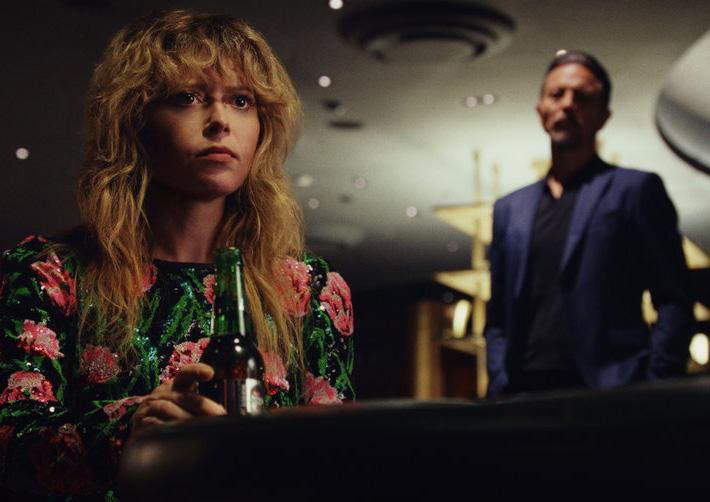
With its Columbo-identical yellow title cards, Poker Face immediately announces its heritage. And with her self-effacing sensibility, Charlie echoes that wrinkly raincoated detective played by Peter Falk. But also, as Lyonne puts it, Charlie is sort of like The Big Lebowski’s Dude, approaching her murder-mystery cross-country odyssey with signature swagger and a Coors Light in hand.
Part of the format’s appeal for Johnson lies in its revolving door of guest stars, and he recruited an impressive team of talent to fulfill the criteria. Some from his films, like Adrien Brody, with whom he worked on The Brothers Bloom, and Joseph Gordon-Levitt from his films Brick and Looper, Lyonne’s close friend and Russian Doll co-star Chloë Sevigny, starring as a dangerously embittered rocker, Dascha Polanco, Lyonne’s co-star in Orange is the New Black, Benjamin Bratt, Ellen Barkin, Hong Chau, Ron Perlman, Tim Blake Nelson, Stephanie Hsu and more.
Casting for the upcoming second season is ongoing, but there’s hope we’ll see more famous faces from Johnson’s films. As he says, “I’m calling every single one of them. I would love to get Kelly Marie Tran from Star Wars in there for an episode.”
When Johnson and Lyonne wrapped what Lyonne calls their “high concept day” shooting the accompanying photos for this piece, they sat down to discuss the fun and games of making Poker Face and its future.
Rian, why do you think you gravitated to bingeing Columbo during the pandemic?
RIAN JOHNSON: It’s funny, I didn’t really watch Columbo as a kid. It was a little too mature for me. I was much more into The A-Team and The Incredible Hulk. But I think a lot of people did this over the lockdown. I binged the whole thing, and that’s where this whole thing really started. It was comfort food. The thing that really hit me was how much it is, at heart, a hangout show with Peter Falk. I wasn’t watching each new episode really for the mystery plot. It was for Falk and the guest star. It was, “It’s Oh, Dick Van Dyke, this will be amazing. Oh my God, Johnny Cash and Ida Lupino in this one, this is going to be phenomenal.” And the ‘howcatchem’ format allowed them to give screen time to the villain and to have them be built into a substantial character and play out the dynamic between them and Columbo, which is one of the things I love. In a way, these type of shows have more in common with sitcoms than they do with Agatha Christie books, in that you’re coming back every week to get a hit of something familiar, to hang out with a character or characters that you like, and to get something new in the same shape that you’re familiar with every single time.
What does television mean to you as opposed to your connection to features?
JOHNSON: The same way that when I think about Star Wars, it takes me back to playing with Star Wars toys and seeing the movies and all of those tactile experiences and what that meant to me as a kid. When I think about TV, I think about sitting on the floor in front of my parents’ TV when I was a kid watching reruns during the middle of the day, and the relationship that I formed with those shows and what they meant to me, and how they mythologized in my head, and how they lived there.
There’s a very specific range of shows that we talked about, with so many of them shot on the
20 DEADLINE.COM/ AWARDSLINE
“In a way, these type of shows have more in common with sitcoms than they do with Agatha Christie books, in that you’re coming back every week to get a hit of something familiar.”
Following The Plot
 From left: Natasha Lyonne as Charlie Cale and Benjamin Bratt as her nemesis Cliff LeGrand; Charlie with the stray dog she picked up on the road, and in the Vegas trailer where she lived before she went on the run.
From left: Natasha Lyonne as Charlie Cale and Benjamin Bratt as her nemesis Cliff LeGrand; Charlie with the stray dog she picked up on the road, and in the Vegas trailer where she lived before she went on the run.
Universal lot and having a slapdash kind of quality to them, even the better ones. There’s something incredibly joyful about that for me specifically. And that’s what latched in my head: if I’m going to do a TV show, I don’t want to do a nine-hour movie. I want to make a TV show, and I want to make something that feels that way to me and hits that pleasure center.
Where was Poker Face in terms of development when you shot that Glass Onion Zoom scene?
NATASHA LYONNE: The running order is Rian shoots Glass Onion. Then Rian and I are having a lot of meetings and dinners and talking about the possibility of Poker Face. We end up selling it to Peacock while he’s in post on Glass Onion, and I’m in post on Russian Doll, I think. Good luck making sense of this. Suffice it to say that he already had a cut of Glass Onion by the time we shot the Angela Lansbury scene. He said, “Do you want to do this thing with me where we shoot this Zoom game during the pandemic with Daniel Craig?” Shooting it together was actually our first time working together, so we were excited about it. And he shot everybody separately because it was Zoom, meaning [Stephen] Sondheim and Kareem [Abdul-Jabbar] and Angela [Lansbury] and Daniel [Craig]. Then three months into shooting Poker Face, he was like, “We changed the dialogue for what Daniel is doing, so can I tweak it?” So, we actually reshot it while I was in my Poker Face trailer.
People had no idea of the subtext at that point.
LYONNE: Yeah. I remember seeing on Twitter after Glass Onion came out, “Why was Natasha there? It doesn’t make sense.” But of course, Rian and I already knew about Poker Face, so it was just preemptively planting yet another person who’s involved in detective business, whether that’s Angela Lansbury or Kareem Abdul-Jabbar writing all those mystery novels. I was somebody who was busy playing Charlie Cale at work on a daily basis.
You met through Rian’s wife, Karina Longworth because Natasha wanted to option an episode of Karina’s podcast You Must Remember This?
JOHNSON: Yeah. We had met through Karina a few times, and then I had this vague idea to do this kind of show in the back of my head. And I was like, “Yeah, but who can be Peter Falk today?” Then I watched Russian Doll and said, “Well, there you go, right there. This is it.” And not even like, “Oh, she’s acting like Peter Falk.” It wasn’t that at all, actually. It was finding somebody who had that charismatic draw of you can’t take your eyes off of her, and you just want to watch her. The answer to why viewers are going to keep tuning in is exactly that, is because it is to hang out with her. And I felt that watching Russian Doll, and that’s so rare. And it’s not about how good an actor someone is. It’s not about how attractive they are; it’s none of that. There is just an X-factor of somebody who you can tell has a soul on the screen that makes you lean forward and want to know more about them. So, I asked her if she wanted to get dinner, and then said, “I’m thinking of doing this type of show.” I think she thought it was just one of those bullshit Hollywood things, like, “Yeah, we should
work together.” I think she was very surprised when I dropped the scripts in her lap six months later.
Natasha, I remember interviewing you for Russian Doll, and you told me about the movies you watched over and over as a kid, and the male leads you identified with. With Poker Face, you have a protagonist who’s a woman, but she inhabits the kind of laid-back, confident space traditionally taken up by a male lead.
LYONNE: The secret to aging in Hollywood for women is to just start playing men [laughs], whether you write them for yourselves or find someone like Rian, and you get lucky enough that he writes it for you.
One of our shared favorite movies is The Long Goodbye. Elliott Gould’s performance in that... So, when we started having our conversations about The Long Goodbye, I’m like, “Baby, baby, I got you. In fact, let’s California split. Let’s talk about Gene Hackman, not even in French Connection, but in Night Moves.” We started talking a lot about The Dude [in The Big Lebowski]. Listen, there’s been so many great roles for men over the years, like Jack Nicholson’s done a wide spread of these pieces, to playing the Joker or starring in Wolf, a movie that doesn’t get mentioned often. They’re allowed to be lone wolves who have thoughts and just do their own thing. That really is historically a man’s game. It’s very Martin Sheen staring at the fan in Apocalypse Now and “The End” [by The Doors] is playing. I remember seeing that scene and being like, ‘This is the kind of acting I want to do someday.’ I wanted to be Brando with “The horror, the horror,” or Dennis Hopper being a photographer. And none of that was ever available to women. While I love Jessica Lange and Betty Davis and Barbara Stanwyck and, of course, Gena Rowlands and my favorite Giulietta Masina, where I really found my stride was sort of being without gender. I was allowed to essentially have an inner thought-life as opposed to this activated system of responses to a male protagonist.
JOHNSON: I will say that I think at least for me—I’ll talk about Russian Doll as opposed to Poker Face my impression is that all the things you said are correct, but I don’t see that as playing a man. I think that character has a lot of sexuality to her.
LYONNE: Well, first of all, thank you.
JOHNSON: Yeah. I think it’s very essentially sexy, but I think it’s seeing a woman in the role that you’re used to seeing men in and having that autonomy.
That’s exactly what I mean.
LYONNE: All my characters are sexy, baby. No, I’m just kidding around. But I just mean that they’re not following romance. That’s not dictating their journey. In other words, following their romantic life is not at the core. If Nadia [in Russian Doll] is having a sort of philosophical, existential psychedelic journey to wherever she needs to go, Charlie is actually this lone wolf who’s really fighting for the outsider, unlike Nadia, who’s so Lou Reed and a shoegazer in New York. I think Charlie has the sun on her back. She’s a desert rat, and she loves it, and she loves people. Their life choices are not run by chasing a boy.
How did you two come to that together? Was it a discussion that you had early on?
JOHNSON: I mean that specific aspect of it, I don’t think it was any kind of strategic thing we had a conversation about. It’s just kind of our combined taste.
Rian, you’ve said you wrote Charlie Cale for Natasha like “a bespoke suit”.
JOHNSON: Yeah. I literally built the show around Natasha. The reason for the show is seeing her in Russian Doll and thinking, “Oh, she could hold a show like this together.”
You made the Poker Face era interestingly mutable. There are digital watch alarms, Charlie has no phone, Ron Perlman’s character uses an ancient cassette player, there are retro vintage cars, but there’s also super modern technology too.
JOHNSON: Yes, Charlie is completely buried in her phone, and that has replaced human engagement for her to some point in the pilot. And the whole thing of her smashing the phone at the end is the completion of this little character arc in the pilot, but it also detaches her from that, forcing her to get to know people in every new spot she’s living in.
The bigger answer to your question is that it’s very character-based for me. It’s not like I want to be in a world without technology. It’s fun to me to explore character. Like the Nick Nolte character
Detective Duo
Lyonne and Johnson first met when Lyonne wanted to option an episode of the podcast made by Johnson's wife, Karina Longworth.
“One of the things I love about working with Rian is that confidence and resistance to traditional storytelling, essentially. You’re such a master of the classic form, it’s like you make it your bitch.”
22 DEADLINE.COM/ AWARDSLINE

who purposefully lives in the past, or Ron Perlman’s character. I guess a lot of the characters are people who live in their own little weird bubble. And that anthropological aspect of that is very Columbo, doing a deep dive into these little bubbles of workspaces or people’s lives.
The funny thing is, writing mysteries with Knives Out, I was kind of dreading like, ‘Oh God, is it going to be like in horror movies where they always have to figure out a way to not have cell service or something?’ The reality is with mysteries; I don’t think technology actually gets in your way the way it does with other genres. At least I haven’t found it to. So, it’s not that I feel like dodging around technology is something we had to do.
It felt like a nod to the ‘mystery of the week’ era though. Especially the digital watch. I miss those. JOHNSON: They say everything old is new again.
I was reminded of Knives Out’s Marta (Ana DeArmas) climbing the trellis when we see Judith Light’s character climbing the old folks’ home trellis in “Time of the Monkey”, Episode 5. Was that deliberate?
JOHNSON: No. It’s a coincidence, and it’s entirely just because it came up in the mechanics of that [storyline], and I didn’t even think about it until I was watching the cut put together, and I was like, “Oh, that’s right.” But it’s also a little bit of a fun trope. That’s one thing that I try and do in writing both the movies and the show is to not be afraid of tropes. I think in trying to do something in a way that feels invigorated and fresh, there can be a tendency to throw away anything that feels too much like a ‘been there, done that’ kind of thing. But I love the ‘been there, done that’ stuff. That’s the meat of it, and that’s the original gears that made the machine work, and that’s what I’m after. So, embracing trellis climbing, I think, and embracing magnifying glasses and embracing...
The old ice cube locked-room mystery trick? Except its dry ice you use to keep the trap door open in the “Exit Stage Death” episode with Ellen Barkin as your villain?
JOHNSON: One hundred percent. That’s the thing. You’ve seen it a thousand times. To me, that’s delicious, and I think not being afraid to lean into a good old-fashioned cliché and embrace that, I think it brings me great joy.
The episode where you turn a BBQ chef into a vegan because he saw Bong Joon-ho’s film Okja made me laugh out loud. What does Director Bong think of that?
JOHNSON: I remember I emailed Director Bong and asked his permission to use it. And I was like, “I’m not going to spoil it, but I think you’ll like what we use it for.” And he was like, “Yes.” It was very sweet.

Have you spoken to him since?
JOHNSON: I haven’t. I don’t think it is playing in Korea yet, so I’m not sure if he’s seen it yet. But I
should get in touch with him. That made me very happy when I came up with that. It was like, “Oh, this will be good.”
And Charlie’s ability to read lies is reminiscent of Marta in Knives Out too. Marta vomits every time she lies. Obviously, you need a device to make Charlie a ‘detective’, but what is it about lying that keeps coming up for you?
JOHNSON: Well, I mean, in both of them, they’re mechanisms, but they’re two completely opposite ends. Whereas with the Marta character, it was an obstruction. It was something to make her life
harder. It was a character we care about, and the only way they can get out of a horrible situation is by lying, and you take away their ability to lie in front of the detective.
So, it was an obstacle, whereas, in this one, it’s the exact opposite. It’s something to take the place of them being a detective and it being their job. And it’s something that explains to the audience why she’s specifically good at doing this, to give a little bit of a bridge into why she keeps getting into it every week. Now, we still—and this, to me, is a joyful thing because it’s one of the hallmarks of the type of mystery TV show that I loved growing up—require a buy-in from
24 DEADLINE.COM/ AWARDSLINE
the audience. There’s still the Jessica Fletcher element of it. Yes, every place that she goes to, someone gets killed, and she discovers it, and we’re all going to agree that that happens and put our arms around it and have a good time watching the show. So, it doesn’t completely bridge the gap, but at least it gives some reason why she’s engaging with it.
People think they’d love to have the ability to detect lies or force truth on people.
JOHNSON: No! Detecting lies, I think that would be hell. What was interesting about it to me was, I mean, first of all, having given her this gift for that reason, it presented a real problem. Which is, how is every episode not just over in five minutes? But that presented an opportunity—and this is one of the things I’m proud of, I think, working with the writers who were able to do this in the show— which was finding side doors into the gift. And in ways that explore with a little bit more nuance, the notion of lying, and the notion of what Charlie says in the pilot about how people lie constantly, but it’s generally not about big, nefarious things. It’s usually little white lies, and the notion of why somebody is lying about something is the actual key. So, that was a real beast to figure out in the writing room every day, but it ended up leading to something that was a little more nuanced and interesting and human than it just being a superpower.
I remember having a conversation about what it would be like if she was in a motel room, and she had a guy that she really liked, and he was sort of fucking with her about being really into her? And she knew that he was fucking with her, and how dark and what a bummer that would be as a woman, to know that the guy was being like, “Yeah, I’m super in love with you,” and that he was lying. I was like, that would really break her heart.
As much as I love that her life is not dictated by chasing romance, if there was a guy that was stringing her along, it would be fascinating to see her handle that.
JOHNSON: Well, that’s something I could see us getting into in the future. We did talk a lot in the writer’s room about what having this gift would mean to an actual human being. And I think the closest we got to really actualizing it in the show is with Clea [DuVall] ’s character, Charlie’s sister, and seeing a little glimpse of that, but we never really did a deep dive. I think that’s fertile ground for going forward.
LYONNE: Although I would say in “Escape from Shit Mountain”, which is easily one of the best episodes of the season, I think, what Rian and [the showrunners] Nora and Lilla [Zuckerman] did with it, it’s fascinating, right? Doesn’t that start with her really enjoying things with a guy, and the B-side of where that goes is the fucking darkest journey in the entire season. It starts at the highest point, and it literally ends at the lowest of the low.
JOHNSON: Yeah, absolutely. And we almost did that on purpose because we thought, ‘Let’s see her a little happy here for a sequence.’
LYONNE: But it does, I guess, set her up for the

DEADLINE.COM/ AWARDSLINE 25
“There is just an X-factor of somebody who you can tell has a soul on the screen that makes you lean forward and want to know more about them.”
SPOT THE GUEST STARS
Creator Rian Johnson recruited an impressive roster of guest stars for Season 1, including many from his own films. Expect more of his stars to appear in Season 2. “I'm calling every single one of them,” he says.


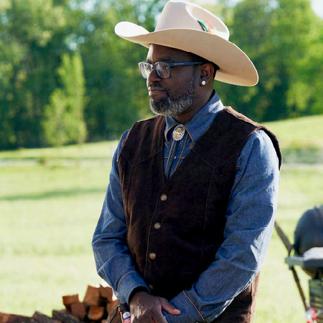

vulnerability of Stephanie [Hsu] ’s character coming in. It’s also interesting the way she plays with boys a little bit in the show, whether that’s Adrien [Brody], or I guess not Benjamin Bratt so much, but...

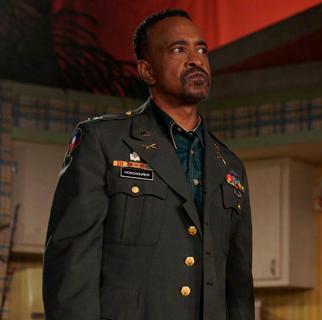







JOHNSON: And I think that’s something that could be very, very interesting. To figure out a way to explore what her gift would mean with someone you actually want to be close to and showing maybe why she isn’t close to people, which is what the finale is
about—why this life of unattached, keep-moving is the one that she’s chosen for herself.
She can’t get close to people. Imagine how disappointing it would be to know every time they lied.

JOHNSON: Right. Absolutely. I think there are good people, but good people disappoint you. That’s also why she has such a water-off-a-duck’s-back type vibe to her. I think it’s a survival mechanism. It’s almost like
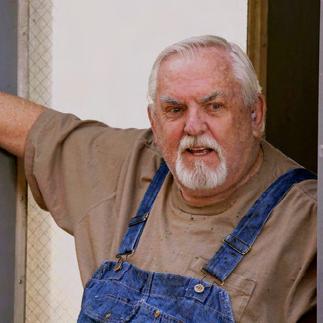

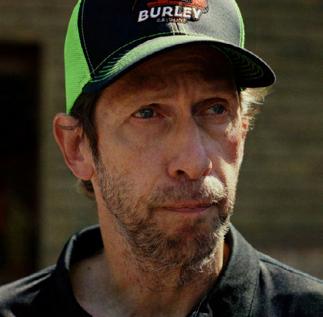
you have to adjust by having a tremendous amount of generosity for human weakness.
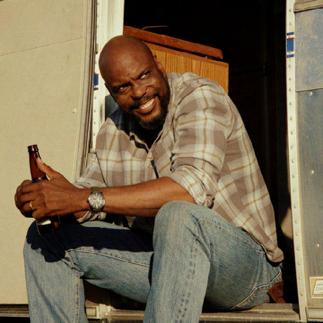
LYONNE: That’s beautiful, actually. The truth is that, and I would say it’s something that I identify with greatly and love about playing Charlie, is this idea that all of those human failings that she’s seeing is something that she’s not blaming humanity for. You’ve never put it that way before. Rather than holding people to account or blaming them for it, of course, she wants to
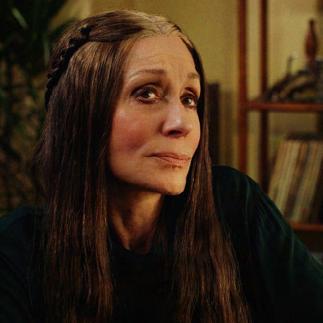
 Adrien Brody
Benjamin Bratt
Cherry Jones Chloë Sevigny Dascha Polanco
David Castañeda Ellen Barkin Hong Chau
John RatzenbergerJoseph Gordon-Levitt
Judith Light
Larry Brown Lil Rel Howery Luis Guzmán Nick Nolte
Adrien Brody
Benjamin Bratt
Cherry Jones Chloë Sevigny Dascha Polanco
David Castañeda Ellen Barkin Hong Chau
John RatzenbergerJoseph Gordon-Levitt
Judith Light
Larry Brown Lil Rel Howery Luis Guzmán Nick Nolte
PEACOCK 26 DEADLINE.COM/ AWARDSLINE
Ron Perlman S. Epatha MerkersonStephanie Hsu Tim Meadows Tim Blake Nelson

see justice around it. And especially for the little guy. There’s something really profound about not being in a state of judgment around that almost.

It feels like Season 2 will really explore the blessing-versus-curse personal side of her gift.
LYONNE: Rian and I did spend a lot of time talking about—and I don’t even know if we want to talk about it here because who knows if that’ll be the thing we ultimately want to commit to in a second season—but we did spend a lot of time just talking about a core injury or something, or when was the moment where Charlie decided this is a double-edged sword and this is also something that can make my life crumble, so I’ve got to sort of keep it, but put it aside.
JOHNSON: Something involving her father, and I think we will inevitably get into that. I feel like both of us were also wary of doing the equivalent of a superhero origin story where suddenly you do the flashback to the thing that’s the equivalent of being in the gamma-ray chamber, but emotionally. I guess for me, I’m willing to take the time to get to that, to figure out the version of it that’s nuanced enough and interesting enough. That’s the other tricky thing, figuring out a way to explore that in the context of a Poker Face episode, I think. But anyway, it’s exciting to think about it.
LYONNE: I mean, life is more of a series of shitty events that lead you to have a personality change, ultimately, in a weird way. Oftentimes, I think people want to be reductive and make it this one thing that happened. I would say also one of the things I love about working with Rian is that confidence and resistance to traditional storytelling, essentially. You’re such a master of the classic form, it’s like you make it your bitch, and it’s like you know the information enough to know that it might not actually be the most fun thing for the audience to find out this backstory in this first season. I love that. It makes it so fun for me that you have the confidence of storytelling to say, “It’s going to be baked into the DNA.” You know so much about a person by the way they carry themselves and the things they do and don’t say.
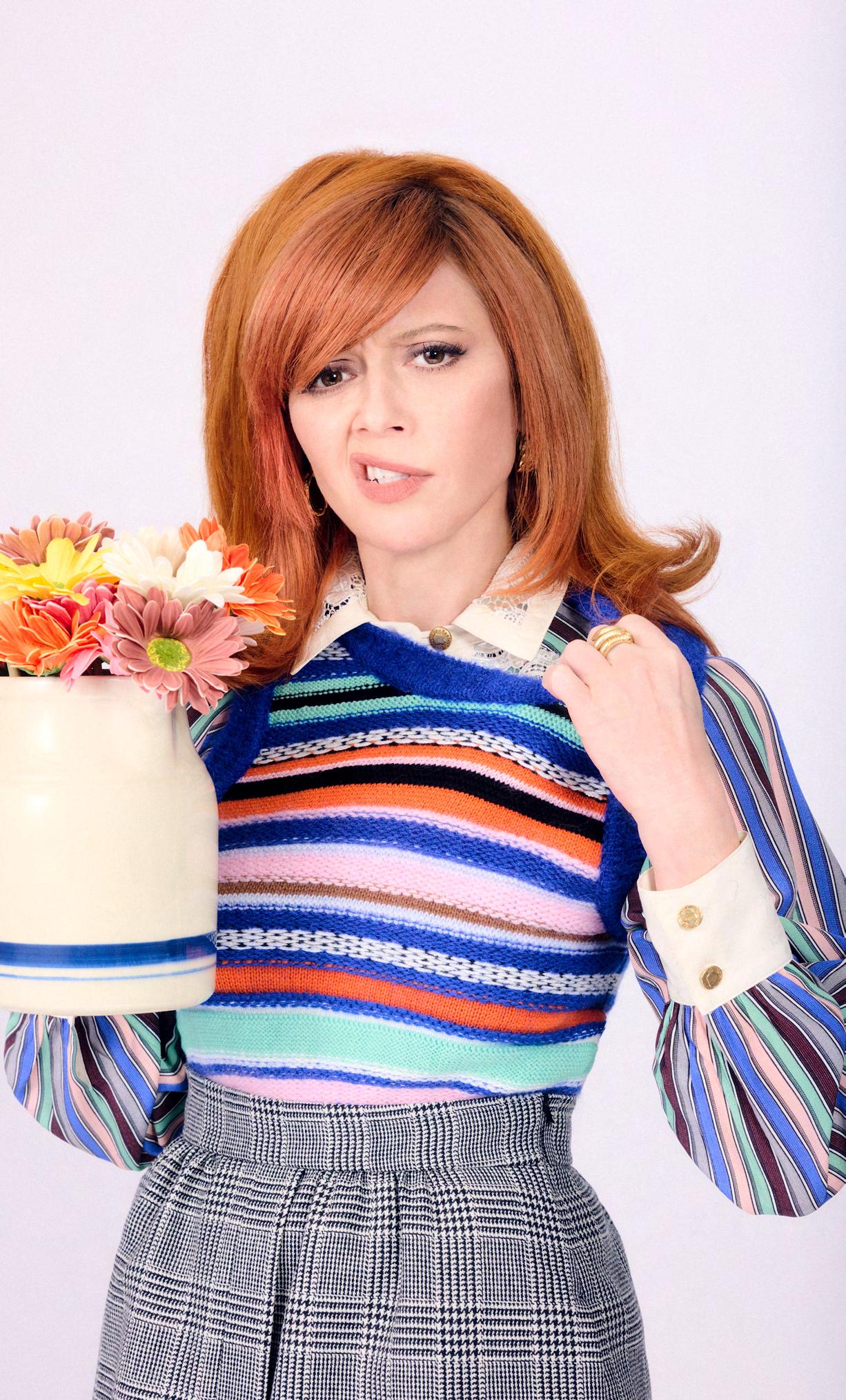
What was the evolution of Episode 8 that Natasha directed and co-wrote with Russian Doll writerproducer Alice Ju?
JOHNSON: I mean, Natasha knew she wanted to do one of the episodes, and so I had this notion of doing something like a Phil Tippett-type character and doing something very based on movie monsters and stop-motion animation and having fun with that. And I also thought tonally, the episode would very much be sort of a Vertigo, Hitchcock-stylized thing. So, I threw it to Natasha, and I was like, “I think this could be really fun for you to do.” So, she was in the writers’ room and she and Alice wrote it. I think Natasha, as good a performer as she is, at her heart she’s a director. I feel like everyone is pushing her to make a feature. I think that’s really where she comes alive and where she really shines. And knowing how good she is, as a performer, that tells you something, that now she’s even better as a director. So, it was also really fun because I think the crew and everyone had known her as a performer, and then when we got to Episode 8 and she stepped up
“The easiest way I can explain it is Hitchcock and Salvador Dalí having discourse around things. So, we were constantly having fun”
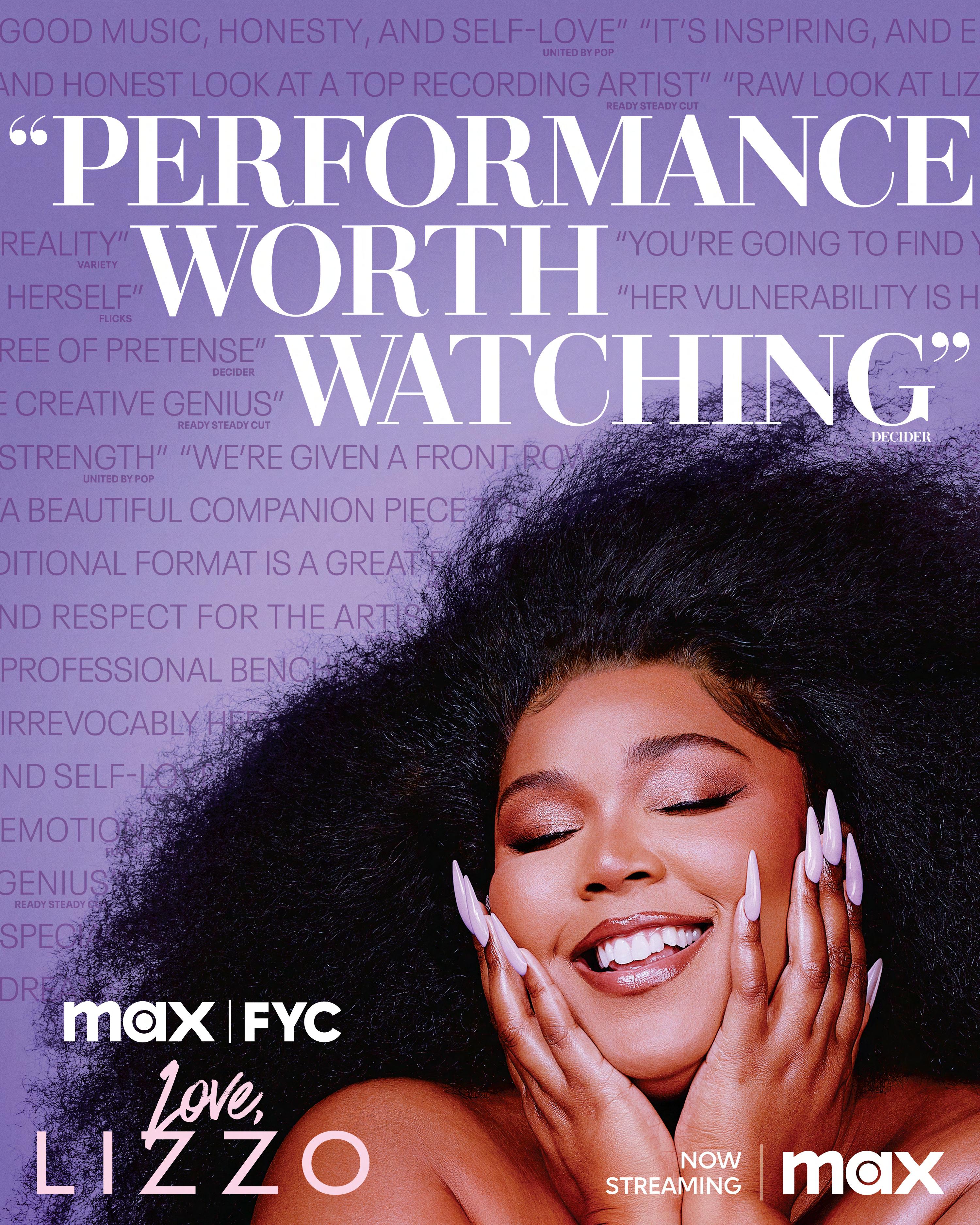
and took the wheel, everyone saw her for the first time, really, and that was pretty cool to see.
Natasha, Cherry Jones has spoken so highly of your directing ability, that essentially you were inspiring and protective at the same time.
LYONNE: For Cherry to say those nice things, really, it’s very moving to me, because I’m a workaholic, and so that’s where I guess I’m getting my meaning of life, which is probably not a great idea.
I watched that incredible documentary on Phil Tippett, and it was just really this gift of, this is not something you usually do. And then it set us up as creative working partners for this thing that just really made [Rian and me] laugh constantly. The easiest way I can explain it is Hitchcock and Salvador Dalí having discourse around things. So, we were constantly having fun and then you add [Nick] Nolte, and Cherry is extraordinary. But a big thing for Rian was this kind of, “Let’s lean in and not be afraid of Vertigo.” So that was really where it was coming from that I was asking of Cherry to take the risk, to be a Hitchcock blonde, and be a faraway, distant thinker who periodically whispers to herself. Even in the costumes—she likes to wear her silk robes around the house, even if she’s committing murder.
That is so Hitchcock. I want to be a woman that constantly wears a silk robe.

LYONNE: You can accomplish this goal. This is within your reach.
I will say that the joy for me in directing on this show was being able to text with Rian 24 hours a day. It gave me that additional confidence of, “Holy Shit, we really are getting it. The Nolte stuff is really working, the Phil Tippett stuff, the elements are gorgeous, and Cherry is doing it.” I’m sorry to be so almost emo about it, but if you’re obsessed with the arts in the way that I think we are, there’s something very peaceful about that. The inverse of it is a constant state of chaos: “We don’t know if it’s right, we don’t know if the choices are correct, we don’t know.” I’ve also been in those experiences with indecisive people, but the amount of fun that we were having getting to create this thing together was, I think, very rare.
And not to be weird about it, but I just think it’s worth mentioning because we’re talking about gender in some way. That is also a very feminist action, frankly. And obviously, Rian is married to one of the smartest women in the world, in my opinion, one of the coolest, and that’s how we even know each other. Karina is just an empirical genius. So, I do think that you see that in men who are not afraid of ‘big’ women and see women like that as a gift. Because boys rock, you know what I mean? It’s really fun to be able to play together in that way. I just want to make a mention of that because I think it’s so, so rare.
What’s next for you?
LYONNE: I really want to write and direct my first feature. That’s become my priority, probably because I’m out here aging, and [thinking about] mortality, and I feel like I’ll be mad at myself if I don’t do it. I’m just a movie lover that got ensconced in this television
30 DEADLINE.COM/AWARDSLINE
“If I’m going to do a TV show, I don’t want to do a nine-hour movie. I want to make a TV show, and I want to make something that feels that way to me and hits that pleasure center.”
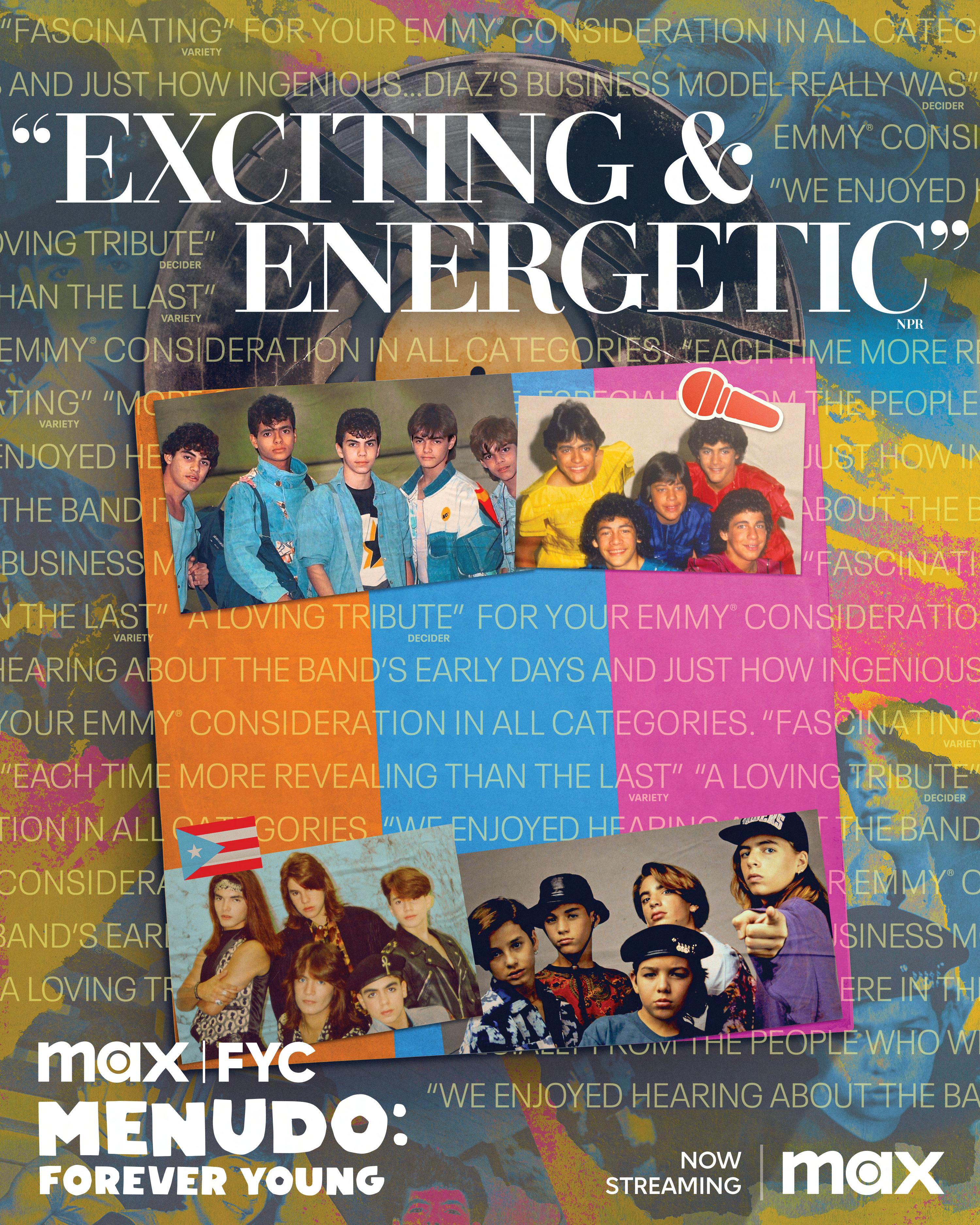
run from Orange is the New Black to Russian Doll to Poker Face. I’m so grateful, and it’s been such an incredible time, but it’s sort of left behind my true love, which is Once Upon a Time in America, All That Jazz
What about Russian Doll Season 3?

LYONNE: I think I’m seeing Russian Doll more and more as a Fire Walk with Me or something like the Twin Peaks journey, so you can have this kind of legacy to it. And then you’re allowed to kind of make a movie about it whenever you want, on your own timeline.
I’ve had a very weird path, and I’m very aware that this is a very special time for me. I’m very grateful that it’s finally here. So, I just want to learn to develop some self-respect around that and play like the big boys, which is to follow where my instinct and interest is leading me. My job is to keep my head down and focus on the work. That’s what I do. I work really hard, and I love what I do, and Poker Face is hard as hell. I’ve got to memorize 60 pages a week. You have all these brilliant actors coming in who want to do an incredible job. So, you have to help them find the key of the music that the tone of Rian Johnson is in, because if it’s a guest director or something, they want to do a good job. It’s almost like you’re also the mayor in a weird way.
And I love these jobs. But yeah, I think I just want to take a few years for me, now that I finally have them, to really say, what the hell do I want? I see other people have the self-confidence to do that, and I think for so many years, I was just going where it was warm and taking what I could get and being grateful to have a job at all. So, I’m trying to really get quiet and figure out what this new iteration means.
And Season 2 of Poker Face?
JOHNSON: That’s something that’s really up in the air. I mean, a lot of it has to do with what happens in terms of the writers’ strike, and there’s so much that’s unknown at the moment. Also, right now my priority is getting the next Benoit Blanc movie going.
Is that cast and ready to go?
JOHNSON: Oh, no. I’m still working on it. It’s very up in the air.
Do you have an endpoint in mind for Poker Face?
JOHNSON: No. Because this all comes from the notion of those shows that were meant to go forever. We’ll always find ways to keep the ball in the air, and that’s its own fun challenge. It’s figuring out how do we keep evolving and keeping it fresh, but the object of that is always going to be so that we can have mysteries of the week, and so that she can be in a different environment every week and we can keep doing what the show does well and keep doing it as long as people want to watch it. And again, to me, there’s something very comforting about that. It’s not like we have a four-season arc planned out and some big dramatic ending. No, as long as this is fun and as long as people keep watching it, let’s give them new mysteries to watch and keep doing it. ★
“I wanted to be Brando with ‘The horror, the horror,’ or Dennis Hopper being a photographer. And none of that was ever available to women.”

Gabrielle DENNIS
The genre-traversing star of The Big Door Prize and A Black Lady Sketch Show talks finding her identity
BY DESTINY JACKSON A A A A A
Gabrielle Dennis cannot stop laughing. In HBO’s Emmywinning sketch comedy series A Black Lady Sketch Show , Dennis plays more than a dozen characters to represent the Black female experience through absurdist humor. In Apple TV+ sci-fi dramedy The Big Door Prize , she stars as Cass—the wife of Chris O’Dowd’s Dusty and mom to their daughter (Djouliet Amara)—a homemaker looking for a sense of purpose in unique ways outside of her small-town life. Here, Dennis talks about how she got her start, the significance of Black identity and finding yourself.

You used to be a camera operator before switching to acting. Tell me about that time of your life and its influence on your career. Being a camera operator [after college] at a local news station, was very much me being one of a kind, while I was there. And it wasn’t that I was really thinking of it in the sense of, ‘Oh, I can be groundbreaking in this space.’ It was just more of, ‘How do I get to the next level?’ And for me, looking around, no one looked like me behind the camera, behind the scenes. The camera operators and floor directors were older, mostly white men. And so, there was this environment based on seniority, and I was like, ‘So I got to wait for one of these guys to either die or retire. I don’t have that kind of time.’ [Laughs] So that’s when I decided [to pursue acting].
I guess it was very naive or brazen of me to feel like I was deserving of more so quickly in that space. But I think it was just that hunger of coming out of the program at Howard University, and putting in all those hours and feeling like you were learning something and excelling in something, and then someone puts the brakes on that. It scared me a bit to the point of trying to go ahead and see this other fear that has been lying dormant for so long. It was like, ‘Heck, if this is going to be scary, why not go and pursue something scary but also something that I have a true passion for?’ So, I am grateful to this day that that job said ‘no’ to me for the promotion. When they told me ‘no’, I felt like it was the first of many great ‘no’s that I got in my career.
34 DEADLINE.COM/ AWARDSLINE
TINA THORPE/HBO
A Black Lady Sketch Show is groundbreaking because it’s the first show of its kind in the sketch comedy space. What has it been like being a part of this journey?

It’s been amazing because I’ve been able to have a front-row seat to the show growing. And I’ve had a frontrow seat of watching Robin [Thede] basically accelerate the careers of so many people or help add to the progress in their careers. It’s a show that’s been placed on a platform where it’s been nominated and has won Emmys. It’s exciting to be a part of a show where people on the other side of the camera are at home watching and there are little girls, young women and full-grown adults who are being instilled with new dreams or re-found dreams and are finding ways to be inspired. And it’s not just by the actors, but because we have all these amazing female Black women directors and writers.
It’s also exciting not just as a cast member, but also just to be a fan of what this show has and can continue to do for Black women in the industry. I’ve got to make great friends with such an amazing, talented cast and watch them grow and have a blast. I say this all the time, it’s also the hardest job I have ever had when it comes to acting. Because of the muscles it already takes in comedy, then compound that and up the ante with it being sketch comedy. And then, we’re doing dozens of characters— I always forget the count—but I’ve
done between 30 and 40 characters just in Season 4. And we’re squeezing those into a three-month shooting schedule. So, you’re really pounding the pavement, and it’s fun. But part of the fun is the challenge. It’s like, ‘How do I come up with another voice or posture or something that sets this character apart from the 200 other characters I’ve already done?’ So, being a part of the four seasons has definitely challenged me and has allowed me to grow as an artist. And it’s instilled a different level of confidence in myself, like the amount of insanity that we do on the show. There are things that you’d never think in your wildest dreams, I would do. So, to be able to do them and pull them off, then they become fan favorites that people discuss and resonate with, is really special.
How do you continue to elevate yourself in comedy, especially after being on the show for four seasons?
I love that I get the ability to grow. But also, as an actor and performer, our training involves everything from Shakespeare to pointe ballet. I went to a performing arts school and was trained as a triple threat. So, to be able to go to work and pull some of those tools out of my belt and do them on the grand scale of an HBO platform, it’s amazing.
This season, I do a ballet-dancing character. Where else would I get that chance on any other shows that I’ve done? I’ve gotten to play this gang leader who is very passionate about quality control and a great work environment. And where would I get
a chance to practice these accents and do all of that? I love being able to utilize all of my gifts.
The Big Door Prize is a comedy that leans into drama. What’s that genre switch-up like?
This is one of those shows where the writers do such a good job of reeling you in at the end of each episode. What I love is that this was something different than anything I’ve ever done. It was a nice opportunity to work in a space with Apple TV+, working with Chris O’Dowd and David West Read, who’s responsible for Schitt’s Creek. And what intrigued me most about the script was once I read it, I couldn’t really give a one or two-line blurb about what it was about. I had an emotional connection to it. I was interested to dive in and figure out what this warm and fuzzy feeling was and see if it would continue.
Then getting to speak with David to help develop this character from the novel the show is based on was exciting. There was something so different and magical about the process that I liked. Also, I’m trying very hard not to be boxed into just one thing. I would say that Jamie Foxx has been the epitome of what I think an ideal artist is. In performing art school, we did blind casting, we had Black Cinderella, white Cinderella, Asian Annie, Black Annie. So, for me, we were not taught to put limits on ourselves. So, I started feeling like, ‘OK, I haven’t done comedy in years.’ And then Robin came and snatched me out of that space to do sketch comedy. But for this, I was like, “I don’t want to just be known for one type of
comedy either.” I feel like there’s not another show on TV remotely like this.
Your character Cass is interesting. She comes across as a perfectionist, but while she maintains this façade, it seems she’s trying to really find her purpose outside of being a wife and mom. How do you read her?
Well, for me, I feel like Cass and I are both pretty adventurous. I feel like she has an adventurous spirit and energy in the sense that she was willing to try the machine and became a believer in it, and really wanted to see where it took her. But one of my favorite scenes in the show is when she opens the closet, and you see all these boxes of like, ‘Cass is this, Cass is that.’ She’s been scatterbrained all over the place in her life, trying to find herself.
I feel like I identify with that. I’ve done restaurant management, I’ve done dancing. I’ve done all these things in my background to finally get to where something really sunk in. And I feel like we all are chasing that thing, we’re finding ourselves in some way or another. And although I’m not a wife and a mother, I have found myself trying to make sure that I’m not only identified as one thing, whether it be just an actor or someone’s daughter or trying to be a full human.
And I think that’s Cass’ quest. There’s that parallel where she and I are trying to find growth in self, in trying to find pure purpose. And happiness really, for me, I think, is the biggest thing. There’s this scene where Dusty just asks her, “Are you happy?” And she has this pregnant pause, and I intentionally did that, because that is a triggering question to ask someone if they’re in a vulnerable moment and it could be just waterworks.
I think all of us struggle with that question of happiness at some point that this show’s existential themes and questions go through. Specifically with Cass, just the journey with her was really fun, to find that she’s this lost soul finding herself in a way. But there’s some beauty in that, because you want to root for her to find herself. You want to root for her to plant her feet under herself, for herself. A
DEADLINE.COM/ AWARDSLINE 35
From left: Gabrielle Dennis and Robin Thede.
Being a part of Sketch Show has definitely challenged me and has allowed me to grow as an artist.
Jason SEGEL
With Shrinking , the multihyphenate draws a tragi-comic tale of existential crises and cataclysmic therapy
BY ANTONIA BLYTH
A A A A A
In Apple TV+ series Shrinking , Jason Segel stars as Jimmy Laird, a therapist desperately in need of therapy. Following the death of his wife, Jimmy has dissolved into drugs and self-destruction, to the disgust of his teen daughter (Lukita Maxwell). And yet, he is curiously likeable and redeemable— such is the magic of Segel. Then comes Jimmy ’s revelatory move: he decides his patients need a dose of the unvarnished truth. Disaster and hilarity ensue. In tandem with Ted Lasso ’s Bill Lawrence and Brett Goldstein, Segel co-created and produces Shrinking . He stars alongside Harrison Ford, who apparently enjoys a little improv with the best of them.
You’re ramping up for Shrinking Season 2. Tell me Brett Goldstein is going to star in it this time?
I don’t want to give anything away, but everyone, myself included, is pushing really hard to have Brett on the show. I want to act with him so badly because he and I have become quite good friends during this process. I just think he’s brilliant. I think he’s funny. I also think that [his Ted Lasso character] Roy is a kind of gruff exterior. Brett’s a really gentle guy. He’s a sweet, lovely, gentle man, and so I’m excited to see Brett get to expose all sorts of different parts of himself. That sounds like a euphemism, but that’s

not what I meant [laughs]. In my head, when I look at Brett, I’m like, ‘Oh, he’s a romantic lead.’ I’m excited to see him do stuff like that.
Brett’s story about getting Harrison Ford on board is just comedy gold, where he goes to Harrison’s house and says Indiana Jones answers the door.
I believe that that happened in London. I think that Brett was shooting Lasso, and Harrison was shooting Indiana Jones. I went to Harrison’s house on my own once he signed on. All the way leading up, you’re like, ‘Oh, I’ve done this a long time. This’ll
be fine. This’ll be great, just a couple of actors talking shop.’ Then you pull up to Harrison Ford’s house, and suddenly, you realize you’re terrified. You look in the rearview mirror, and you’re drenched in sweat. Just when you start to dry off, the gate starts to open, and it’s too late. You don’t want him to see you drying the sweat, so you play it cool. There’s a reason he’s Harrison Ford. I did something with Robert Redford a few years ago, and it was a similar experience, where you’re like, ‘Oh, I get it. You’re the real deal.’ You feel it in the room, same with Sally Field, who I worked with.
In first creating Shrinking, Bill Lawrence was inspired by a neighbor's tragedy, a shocking starting place for a comedy. Why do you think he chose that?
Getting to rock bottom is drama. But rock bottom is actually a pretty funny place. The bad shit happened before, and now you’re at this place where even though it seems like the worst place, the only way to go is up when you’re at rock bottom. So, you don’t
know it at the time, but it’s actually a very hopeful place to start. If you start someone at the peak, I can tell you where they’re going: down. Starting someone at rock bottom is actually a recipe for feel-good.
The whole drama-comedy blend is such British humor to me, where you undercut and never let anything get too funny or too sad. Yeah, for me, it was Broadcast News I saw that movie just as I was getting interested in writing in my teenage years and, [it was] oh, this is the tone of life. It’s like where you’re laughing your way through really tough conversations. That scene between Albert Brooks and Holly Hunter. He basically says, “I’m in love with you.” And she says, “I’m in love with Tom.” It’s the most complicated, funny, heartbreaking, beautiful, honest… None of those punchlines are anything but true. And I think that that really inspired me. It’s like I’m not that interested in seeing someone be clever. When I get a script, and I feel like this is a smart writer, not a smart character, I am not
36 DEADLINE.COM/ AWARDSLINE
APPLE TV+

interested in it. People don’t talk that way. People don’t think that fast when they’re under duress.
I read that Bill had pitched a version of Shrinking years ago to Warner Bros. and they thought it was maybe a bit depressing? I didn’t know that. That’s funny.
How did you feel when you first read the premise?
Well, I guess what I felt was I worked really hard at comedy for 10, 12 years. And so, all modesty aside, I just feel as though I know how to do it, and I’m really interested in comedy. I have a lot of reference points lodged in this weird brain of mine, and I got some moves. I kind of know how to do it. Drama was something that I had been working really hard to feel that same way about. But then comedy found me. And I didn’t get a chance to hone those skills. There’s some probably innate talent threshold that you have to have to get a chance at any of it, but then I think it’s skill-based. I think this is study and practice and learning not to be afraid and learning not to show off when the camera’s getting closer to you, all these skills. So, I spent the past seven years trying to get good at drama, feel good about it and not feel afraid of it. So then, when this came to me, I felt like, now, what if we try to use all these things that we’ve been working really hard to get good at because the tone of this is all of it
Watching Shrinking, I thought, ‘My god, I’ve always wanted a therapist to tell me what to do.’ It’s the fantasy.
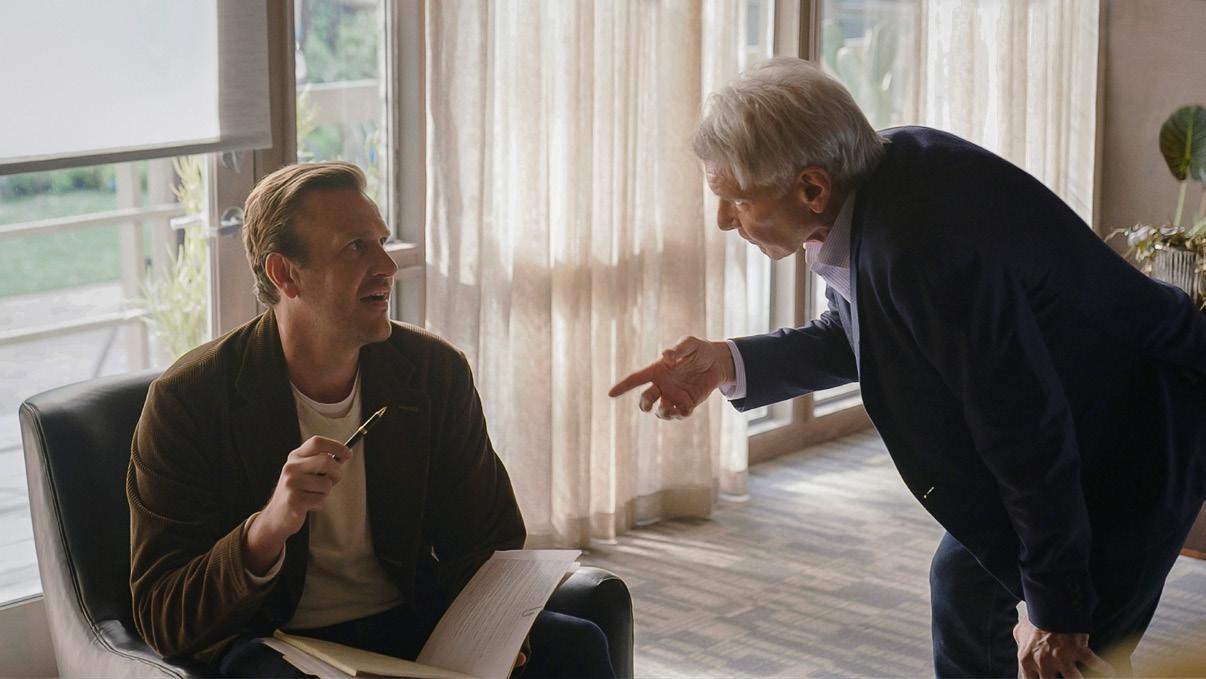
Totally. It’s like Jonah Hill said it really well in his documentary about [therapist] Phil Stutz, “You have all of these friends who you don’t want advice from telling you what to do, and the one person you do want advice from who’s not allowed.” It’s really true.
In the case of Jimmy’s patients, maybe a lot of them needed to hear the truth.
I think that guy, Phil Stutz, who I guess
I have to say it’s loosely based on, or is not actually based on him but…
...is very, very loosely inspired by? Yeah. He had that same frustration from years of real practice of saying, “This is a loop. This is just a feedback loop. And just because you can identify why someone is doing something, which is what a big part of therapy seems to be, it doesn’t necessarily actually help in changing the behavior.” It’s like, ‘Oh, great, got it. My mom said this when I was 15, that’s why I’m doing this. Now what?’ And what he did was come up with this system called ‘the tools’ where he said, “I’m going to teach you how to change this today, how to walk out of this room with some sense of hope that your behavior’s going to change.” And I think it’s like a revolution. That’s certainly what I’m looking for. Man, I just want to feel better in general. You know what I mean?
How do you get into a place where you are in the desolation of grief that Jimmy deals with?
I think that probably one of the reasons that I am funny is because I, as a default setting, struggle with happiness. I have a sense of impending doom. And I have to work pretty hard to counter that. I have all of these tools I have to do in the morning so that I feel OK by the time I take on the world. And I think that alone is frustrating and hilarious. God, I have to do so much work just to fucking get to the point of interaction with the world.
So that stuff has never been hard for me to draw on because I may just be more conscious of these feelings, I may have too much attachment to them, but my experience has been that we all relate. Almost everyone I talk to about it nods their head. And I don’t think they’re just being kind. I think they’re like, ‘Oh yeah, life is pretty hard. At least sometimes.’ So, I feel like I just have access to that part that we all really relate to, and luckily, I have a sense of humor about it. Otherwise, it’s really boring.
Were there some scenes that really affected you?
Yeah, there was a scene where I couldn’t stop laughing. Jessica Williams makes me laugh really hard. There’s a scene where we wake up in bed after having slept together. And it is this frantic scene of us each getting dressed and realizing everyone is still downstairs. And there are things that are not in the show, probably for good reason, that made me laugh so fucking hard. Jessica and I are both total weirdos and also totally committed, and it was one of the most fun days of my life.
Then I think the things that affected me most were these scenes with Lukita Maxwell, my daughter. That, to me, was the most important storyline in the thing. What I focused on, more than the therapy, more than Jimmy’s own grief that he was dealing with, is repairing this relationship with my daughter. Because that’s the ultimate betrayal
that Jimmy has committed. It’s like the film Force Majeure
Where the dad bails on protecting his kids in an avalanche?
Yeah. As we were writing, I referenced it in a more dramatic way because it isn’t funny with Lukita, it’s like the thing happened and Jimmy ran away. You’re supposed to sacrifice yourself for your kid. He backed out of the room and let her take the hit. When you see sadness in Jimmy, there’s nothing quite as sad as guilt. And it’s a really interesting version of sadness, right? Because it’s also secret. It’s sad and a secret combined. Jimmy bailed when it was time to do the thing, the one thing you’re supposed to do.
Brett Goldstein recently said how important it was that the actor playing Jimmy could bring likeability. Because in another actor’s hands, seeing him fail his daughter to that degree would’ve just ended it.
Well, I don’t know. I guess I like who I am... And I’ve had periods in my life where I bailed in ways that could potentially make somebody unlikeable. But there’s redemption on the other side by trying to make amends and trying to be better next time. So, I guess I have space in my heart for redemption. So that when I’m playing any of those moments, I don’t really view them as somebody becoming Darth Vader. It’s like,‘Oh, you’re going to have to fix that.’
Jessica Williams says she improvised at times. Did you? And did Harrison Ford?
Yes. With Harrison Ford, there was a moment when I saw him register and was like, ‘Oh, we’re doing this now.’ And he was good at it. He’s really, really good at it. There was a whole potato run, where I end up eating these potatoes. [He said] “Do whatever you want with them. Boil them, bake them.” That was a riff that came out of his mouth. He is really smart, he’s really funny and he really understands acting. A
38 DEADLINE.COM/ AWARDSLINE
APPLE TV+
From left: Jason Segel and Harrison Ford in Shrinking

Ebon MOSS-BACHRACH
The Bear star broke in with Gene Wilder and broke out in a Chicago kitchen with Jeremy Allen White
BY LYNETTE RICE
A A A A A
Before patrons of The Original Beef of Chicagoland ever get their delicious sandwiches from chef Carmy Berzatto (Jeremy Allen White) on FX’s The Bear, they have to go through manager Richie Jerimovich—an irritable clodhopper who’s both aggravating and engaging all at the same time. He’s played with affection and reverence by Ebon Moss-Bachrach, the blue-eyed breakout best known for his stints on Girls (as Marnie’s husband Desi) and The Punisher (as David Linus ‘Microchip’ Lieberman, the title character’s ally). Here, Moss-Bachrach talks about making it big on the comedy series from executive producer Christopher Storer (Ramy).
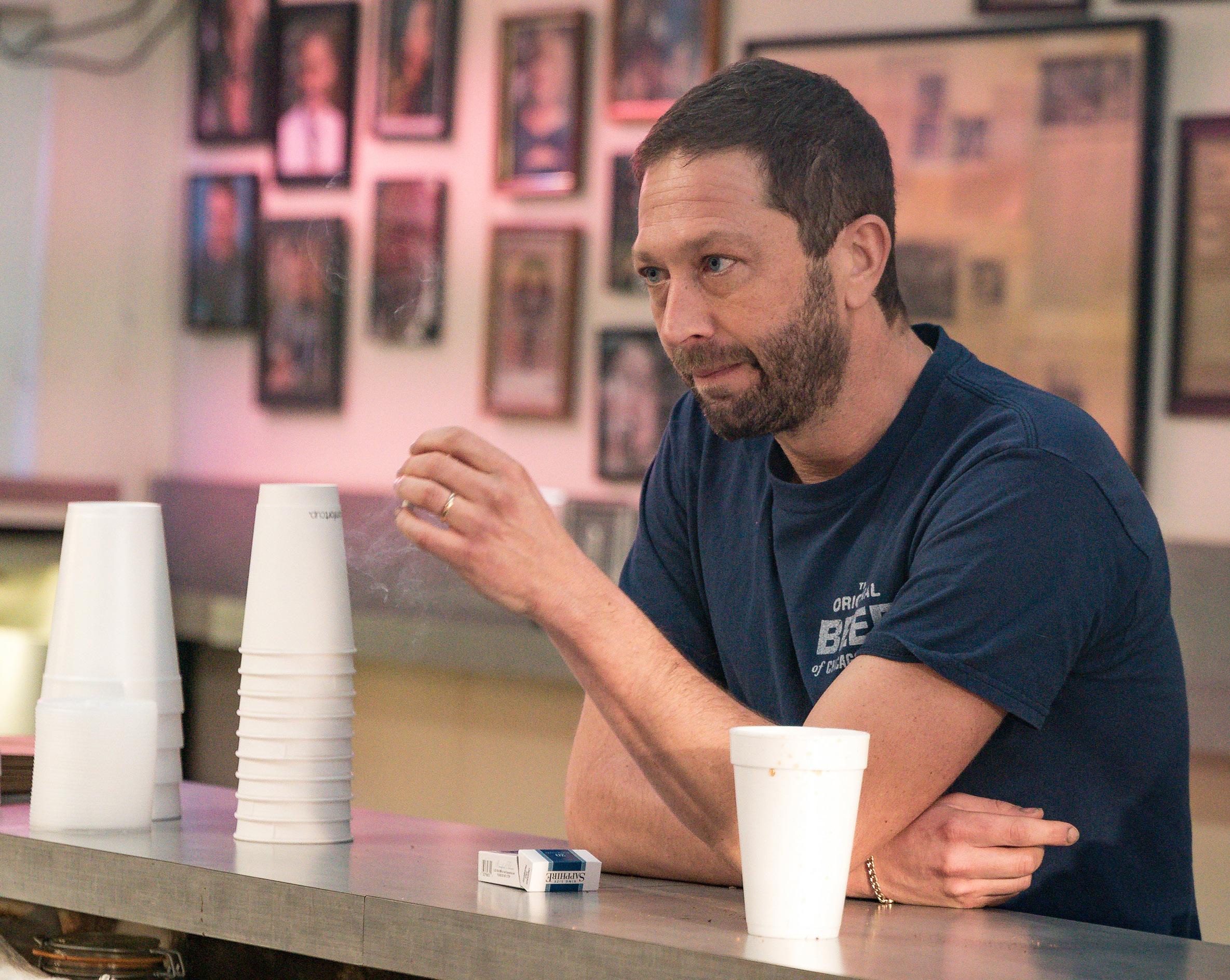
You grew up in Massachusetts. Do you remember what originally inspired in you the desire to act?
As a kid, I was always very much an escapist. I loved my sci-fi books and Flash Gordon and all that kind of stuff. I don’t know how much that played into my acting. I started to get more into it when I went to college. That’s when it became something I felt like I really wanted to do.
Did you study acting when you were at Columbia University?
I wasn’t in the theater department. I took an acting class my freshman year. That really opened my eyes to the full art, that it’s really a discipline that I could pursue and study with
40 DEADLINE.COM/ AWARDSLINE
MATT DINERSTEIN/FX

my heart and my soul until the day I dropped dead.
You share a last name with your mom, as well as your dad. Are you a feminist ally?
I guess. It wasn’t on me [laughs]. They made that decision for me. I was a prenatal feminist.
What was your very first job in Hollywood? Was it the TV movie Murder in a Small Town?
Yeah. My first job was with Gene Wilder. I remember going to the casting director on 53rd Street, maybe 54th Street, and there was Gene Wilder with his beautiful eyes glowing and his curly hair. He was like an angel. He gave me the job in the room while we were talking about something else. It was an OK movie, but it was six weeks where I got to spend every day with Gene Wilder, who was like the most wonderful, generous role model. I didn’t realize even at the time what an amazing gift that was.
When you were starting out, do you remember thinking, OK, this is what I need to do in my career to make it big?
I never wanted to make it big. All I wanted to do was regional theater and
plays. I started so young. I was like 20 years old and thought, ‘Well, if I can go and do plays in San Jose or Arizona and make 5,600 bucks a week, it’ll be great.’ I love this kind of itinerant lifestyle where I don’t know what I’m going to do next.
As your career progressed, did you find that you were getting specific kinds of offers?
For a long time, I was playing the best friend. I was getting a lot of best friends and brothers. And they all seemed to be a little bit nerdy.
When you joined Girls, which had already captured the zeitgeist, did you think to yourself, ‘Oh man, I’m going to be totally cool now?’ My character didn’t come on until the third season. I was friendly with Jenni Konner and Lena Dunham, so they wrote this part for me. It was supposed to be a couple of episodes at first. And then we were having so much fun, they just kept making the part bigger and bigger. I inherited this kind of cool, zeitgeisty thing. I never felt like I was pivotal in making it. I was just sort of tagging onto the coattails of this thing.
You participated in a much-talkedabout oral sex scene involving Allison Williams’ derriere. Can you recall the funniest thing that was said about it?
I remember meeting Allison’s dad [Brian Williams] not long after that and him being really cool. He came up to shake my hand and I probably turned
really red. I was proud of the scene. It’s good to push it and we definitely did on that day.
What was your initial reaction to The Bear? What made you want to do it?
It just felt so true to me. Richie definitely reminded me of a few people I’ve known over the years, people who I kind of love who were hilarious and tragic and big babies. I never read anything like that before, the writing was just so good. And Chris Storer had such a keen ear for dialogue and behavior. I didn’t really know much about kitchens, and I don’t really know much about Chicago, so I wasn’t even picking up on those things. It was just about relationships and the way people talk to each other and the things that people intimate but don’t say.
You’ve said before that what Richie brings to the restaurant is fairly unclear and vague. So why the hell is he still there?
I don’t know. It’s like your grandma’s pot. The soup’s gotta be cooked in that pot, you know? Otherwise, it’s not gonna taste the same. At the same time, you’re like, what the hell? What’s going on with this big pot? It’s ugly and it takes up a lot of room in the kitchen. Richie is very much the soul of the restaurant. He’s the front-facing part. He knows everybody’s name. He’s like community relations.
The way you guys scream at each
other is so funny. How do you remain in character and not bust out laughing?
It happens sometimes, but I’m proud of us. Jeremy’s a pro. He doesn’t laugh too much. And then you've got people like Matty Matheson [who plays the role of Neil Fak], who is like a complete liability to have to do scenes with. I have to look away from him, pretend he’s somewhere else. Because if I look at him, we’re just gonna start laughing.
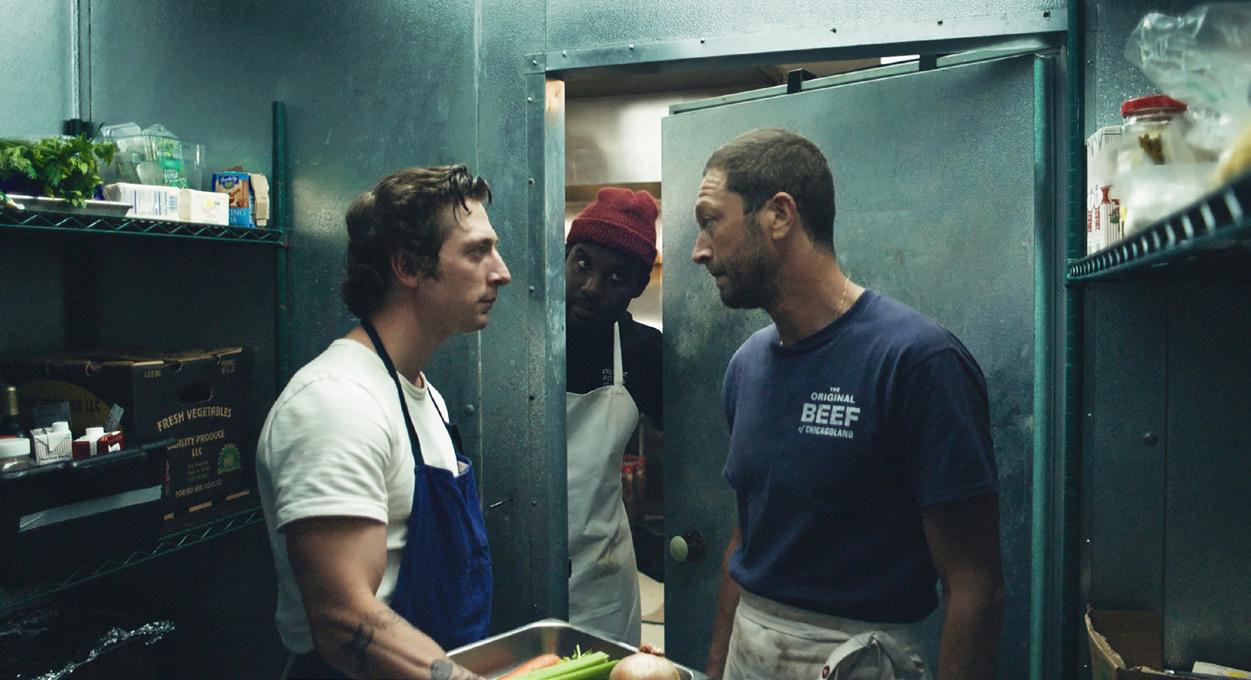
Now that you’ve been in Chicago for a year, what makes it the perfect home for the show?
Chicago is where Chris is from. It’s specific to him and to this story, which is personal in some ways. So it’s appropriate that it’s there. It takes on this identity of Chicago. I mean, it’d be nice to be in New York and sleep in my bed every night and be with my family, but it would feel so disingenuous. The culture of Chicago is so specific that it makes it a lot easier from an acting point of view to be there and to be eating that food and hearing the accents. It informs everything.
Are you treated like a god there now? Can you walk down the street without being mobbed by fans of the show?
I can walk down the street without being mobbed. I can’t say the same for my young friend Jeremy.
Does it feel odd to be called out for a breakout performance when you’ve already been doing this for so long? You don’t have too many options in Hollywood. You either get rich and famous really quickly or you have to find a way. My goal was to never become rich and famous. My goal was to be able to support myself and my family doing what I love to do. And I’ve been able to do that. So I feel totally great about my career, and I think people recognize that. It’s nice to be recognized for this show that I am really proud of. I don’t feel weird about it at all. But I also feel very similar to the way I felt a year ago before it even came out. Does that make any sense? A
42 DEADLINE.COM/ AWARDSLINE
FX NETWORKS
From left: Jeremy Allen White, Lionel Boyce and Ebon Moss-Bachrach.
You don’t have too many options in Hollywood. You either get rich and famous really quickly or you have to find a way. My goal was to never become rich and famous.

Sheryl Lee RALPH
BY DESTINY JACKSON
There’s nowhere else to go but up for multi-hyphenate Sheryl Lee Ralph. During Ralph’s 46-year career, she’s been a trailblazing force. Since her debut in Sidney Poitier’s A Piece of the Action or her lauded turn in Dreamgirls on Broadway in 1981, which landed her a Tony nomination, Ralph’s been making a major impression. These days, she's back to school on ABC’s mockumentary Abbott Elementary . Her role as the wise and wise-cracking teacher Barbara Howard earned Ralph her first Emmy win, as the second Black woman to win for Supporting Actress in a Comedy Series. She discusses the joy of playing Barbara Howard and their personal connection.
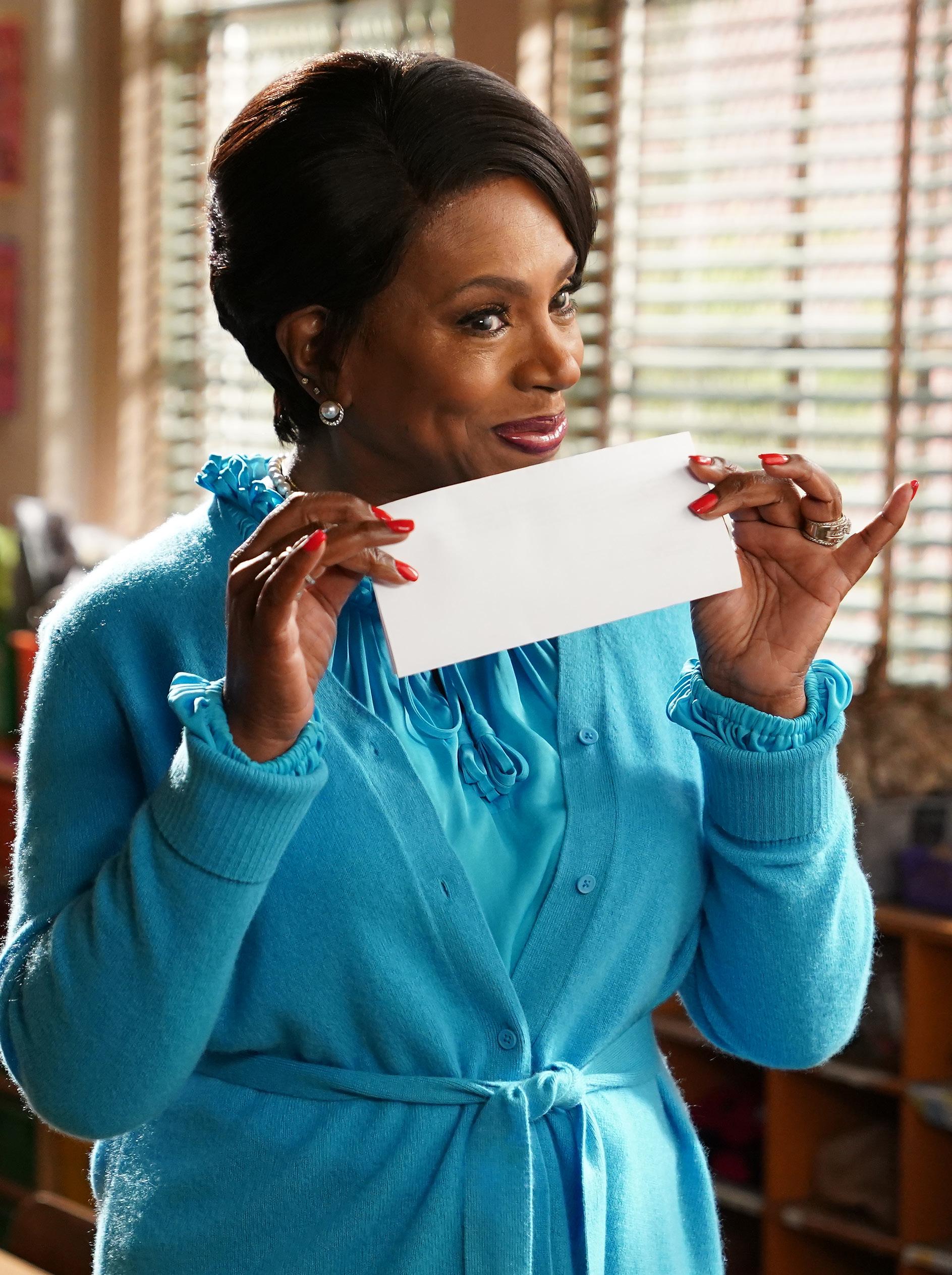
Barbara’s progression between seasons is more dynamic, from protecting Janine [creator Quinta Brunson] from her estranged mother to concealing her stressors from her colleagues. What storyline resonated with you most?
For me, this season was interesting because I am so well supported by a room of incredible writers. I thought
last year the work I was able to do was wonderful. And, of course, being recognized with the Emmy win. But to hear people say, “We thought you were great last year; how has it become greater this year?” I have to say there’s a combination between the writers, the actors, the storylines, and for me, it has been amazing to see all these layers pulled back. In the islands, we do many things intergenerationally, so the fact that I can have this relationship where I’m able to care and help this young woman find her way in life, I love it very much.
Also, I like to connect dots. So, I look back at my first job, a film called A Piece of the Action with Sidney Poitier. I played a young raw child of poverty named Barbara Hanley. And I always say Barbara Howard is a stellar committed teacher because she was Barbara Hanley. And in going through everything she went through via her own character development, she now has the ability to look at Janine and see herself and know, I have got to help this young person be all they can be. Because if Barbara Howard and Barbara Hanley could do it, she could certainly do it to help Janine. I tweeted once: it hurts my feelings when they hurt Janine or when anything happens to Janine because it’s like, I just want Janine to thrive. And that’s why I need her to get into therapy before she takes this relationship with Gregory further.
What are your thoughts on the Gregory-Janine season finale? Do you want them to get together?
I used to. But when all of it started to add up, and then that near kiss during that winter episode? My god, that was so beautifully written and directed. I know I’m in the show, but watching it, I was like, ‘Oh my god, this [would make] such a great movie.’ And the love between them? I just wanted to shout, ‘Yes, man, go on and kiss the girl.’ But that is not what happened. It didn’t work out that way. I honestly feel that these are two young people who definitely need therapy. I don’t know what the writers have planned, but if they were real people, I would say, ‘Look, you
44 DEADLINE.COM/ AWARDSLINE
GILLES MINGASSON/ABC
The Abbott Elementary actress on her emotional connection to the role of sage teacher Barbara Howard
A A A A A
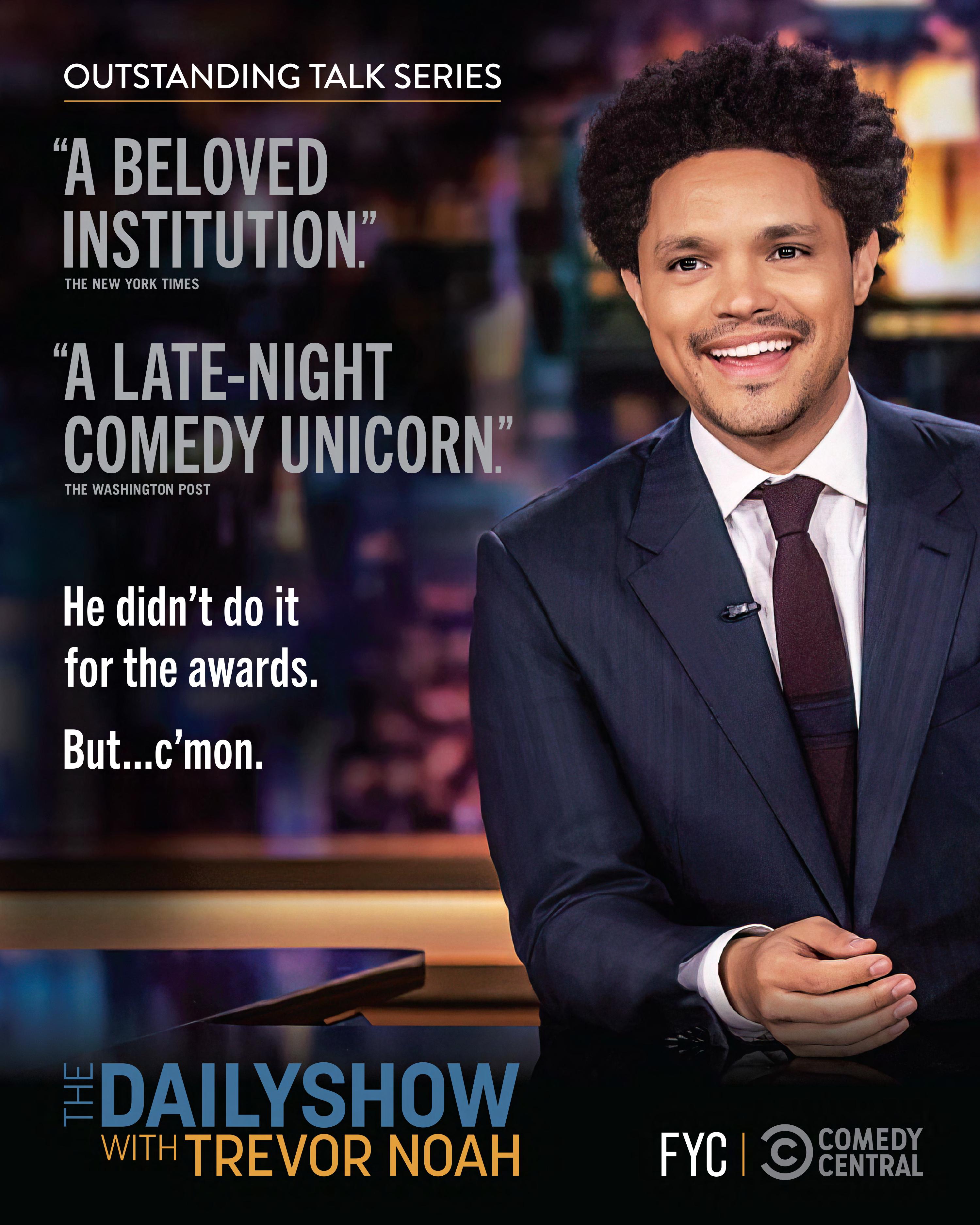
two young people, you need some therapy. You’ve got some issues that you need to work out, and that’s what you need to do before you take any of this further.’ Janine has mommy issues, and Gregory’s got daddy issues. Lord have mercy [laughs].
Going back to Sidney Poitier, you’re very forthcoming about rewatching your past work online. Not a lot of actors are comfortable doing that. Why are you?
You know something? I really don’t want to watch my old work. But it’s gotten to the point now, like the other night, I was sitting down flipping through channels, and it was like, ‘Oh, there I am. It’s Sister Act 2. Let me watch it.’ And then it’s just like, ‘Oh my gosh, I really love this movie.’ I love the relationship between Lauryn Hill’s character and my character. The mother was such a dream killer. And there’s so much about that in my book [DIVA 2.0: 12 Life Lessons From Me For You!]; don’t let somebody else’s lies or negativity become your truth. Don’t carry that with you. Know that a ‘no’ today can be a ‘yes’ tomorrow, and you’ve got to live your own dreams. So I think part of what I truly love sometimes about watching the work is, when I happen to see A Piece of the Action on TV, I’m just like, ‘Wow, my god, who would know that all these years later, I would still be doing the work that I love as an artist, as an actor, and that I would have grown so much as a performer.’
What has your life been like since winning your first Emmy? And do you have a contingency plan in place for the possibility of winning a second one?
Don’t put a Kinehora [jinx] on it! [Laughs] Everybody keeps asking me, ‘What are you going to do next?’ And I’m like, ‘Oh my God’ people, first of all, I was so frightened by the first one, I was speechless. I was shocked. I could not believe that it was happening to me. If it happened twice in a row… I’d probably stand
there looking like a fool. I don’t know if anybody is experiencing what I’m experiencing because it’s amazing. Once, I got off of a plane and walked through a crowd of people also getting off of a plane [internationally], and these people, in all the ways they could, were putting their words together to stop and talk to me about my role on Abbott Elementary. I was like, what in the world is this?
Recently, I was in the teacher appreciation room event with Becky Pringle, the president of The National Education Association in D.C. And just the way that teachers expressed what they felt about the character, what they felt about the show, it’s like getting caught in my throat, the things that they say to me, the way they express their feelings to me talking about their teacher, and then telling me about their Barbara Howard.
I’m like, my god, all of this and an Emmy too? I’m just the blessed one. God has been good to me by being able to let me be here at this point in my career to experience this. To have other younger actresses come up to me and say, “I see what it means, Ms. Ralph. I get it.” The whole Zendaya of it all or to the actresses in P-Valley, White Lotus, it’s just like, whoa, what in the world? At the beginning of last season, I would say that we are the number one television show in the world, and the more I travel, I realize we are the number one TV show in the world. People are watching, and
they love it. And it doesn’t get much better than this. And I’m so happy and blessed to be a part of it, I really am.
You’ve had such a storied career and are certainly reaping the rewards of that in this era, and you still have so much more left to do. But what do you want your legacy to be?
I think that legacy for me is so many things. My children—I have two children—and I wrote in my book, “I know that when I leave the world, I will leave at least two people who will be able to carry on in my name, to speak my name, the memory.”
Working with my daughter, who’s given me a renaissance in my whole look and what it is I present to the world on these different red carpets. And my son has helped me craft my message of inspiration through my social media and all of that. And what he has been able to do to develop his own nonprofit, working with the family around health and wellbeing, being able to carry on and raise up the conversation around education, and educating all of America’s children with my husband, Sen. Vincent Hughes, out of Philadelphia. All of that is legacy to me.
Now, when we start talking about what I want to do and lead in show business, I would like to continue to encourage young artists to find their voices and put it where it belongs. I made certain choices in
my acting career not to play certain roles because I wanted young talent behind me to realize that just because this is being offered to you, it is not who and what you need to put your stamp on. You can sit down and write, create and develop other layers of people of color. [Roles] for Black people during my time was just a ‘whore’, ‘a drug-addicted woman’, or ‘a big mama’ on the couch. That wasn’t for me. I wanted to be a different image. And after all of these years, the choices that I made in doing that, I’ve heard from the young artists that said, “I get it. I see it. I’m writing, I’m creating.” Which is why the whole relationship with Quinta is important for me, because, as an artist, when the next generation extends a hand and says, ‘I see you, I get it, auntie-mother, take this walk with me,’ that speaks volumes. To me, that’s legacy. That says that every choice I made was worth it, because here she is now, with an ability to actually take flight to higher heights because I know of those who came before me and just dreamed about this moment.
My god, I know the journey, I know the road. I know what it took and how for many, it was backbreaking; it was spirit-breaking for some of them. But guess what? I’m here. I see it. And I can say their names, I can talk about their journeys, and I can say to my next generation, my children, my nieces and nephews: fly, soar, your crown’s been paid for, so put it on. Take your wings and fly because that’s what we all put the work in for, for you to fly. So that’s legacy to me.
Now, if I get to make some great movies, I get to produce and take showbiz to different parts of the world and see us grow in places where they say we can’t grow... They still want to hang on to the idea that we can’t have too many people of color because they won’t buy it in other parts of the world. I say, children break these barriers because there are dark people on every continent, and they want to be seen too.

46 DEADLINE.COM/ AWARDSLINE
A
GILLES MINGASSON/ABC
Sheryl Lee Ralph in Abbott Elementary

Utkarsh AMBUDKAR
The Ghosts star recalls the roles that define his career and the big one that got away
BY LYNETTE RICE
Even if you haven’t watched CBS’ hit comedy Ghosts , chances are pretty good that you’d recognize Utkarsh Ambudkar—the actor-rapper best known for his breakout role as one of the Treblemakers in Pitch Perfect and as Mindy Kaling’s younger brother in The Mindy Project . But playing Jay Arondekar—the unseeing husband of Rose McIver’s Sam who can see the spirits who live inside their hotel—is his biggest achievement yet, and a job that should keep him busy for a long time. Here, the Maryland native talks about his start in rapping and acting and what’s so brilliant about playing a guy who can’t get spooked by spooky roommates.

What happened while growing up in Baltimore that made you want to devote your life to acting and rap?
I wasn’t like a tough kid, so I wasn’t gonna scare anybody around me. I think being South Asian in Maryland
48 DEADLINE.COM/ AWARDSLINE
BERTRAND CALMEAU/CBS
A
A A A A
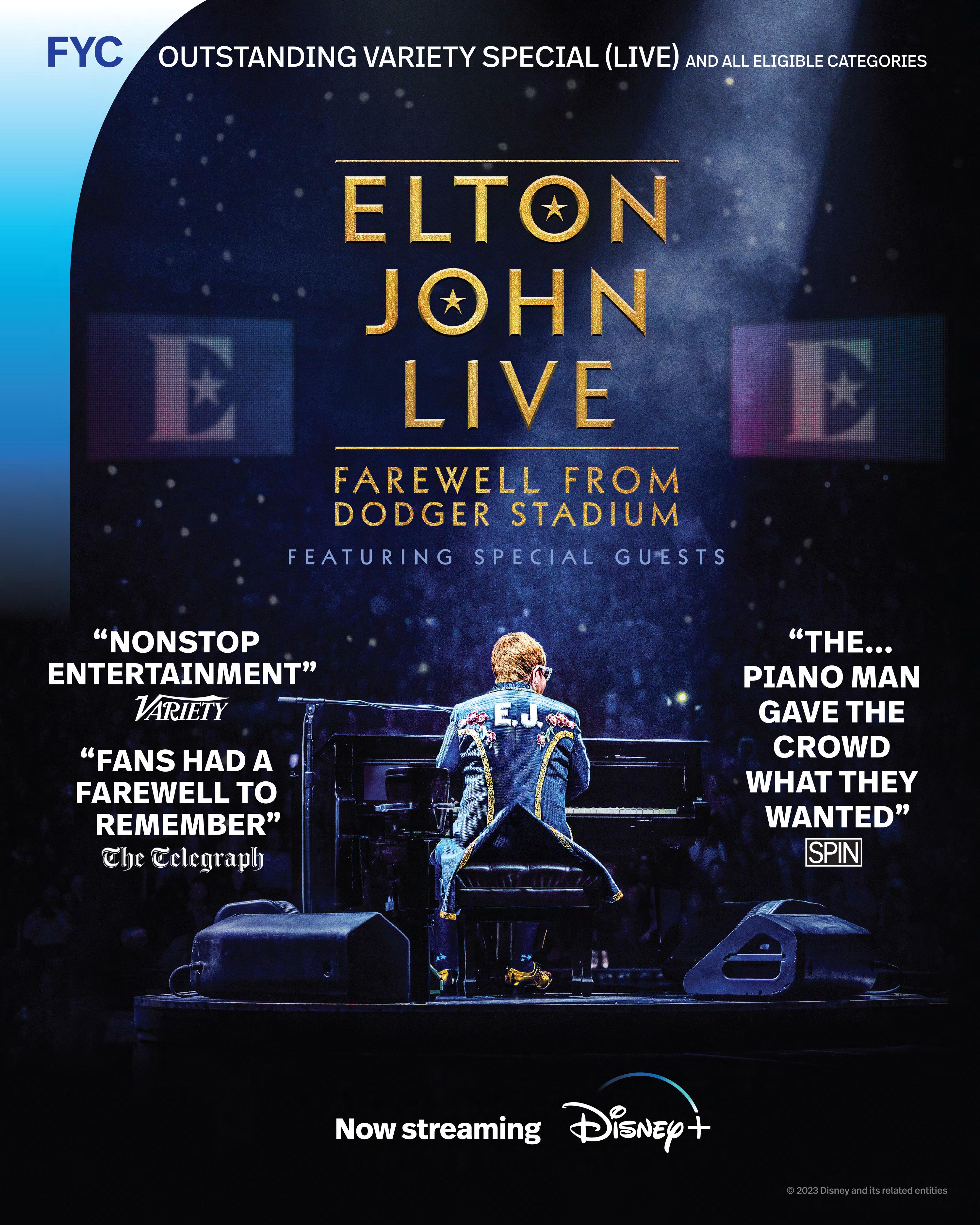
in the ’80s was still very much a new ethnicity to America. So a lot of people didn’t know what we even were. I had to find a way to fit in. One way was to entertain my friends. I had a proclivity at home for making my family laugh, and my mom and dad were very keen on pop culture. We had all the records, and we watched a ton of Bollywood movies, which are very over the top but beautifully made. I was the only kid who was making up songs on the spot and doing voices and making people laugh. And then, when I was nine or 10, we would sneak out and listen to the new Dr. Dre record, the new Snoop Dogg, Tupac or Notorious B.I.G., basically what is now considered the second golden age of rap. I feel like I got confidence and joy at Wootton High School in Rockville, Maryland. I could go on stage and do a Shakespeare play and start improvising. No professor was gonna start yelling at me if I started adding monologues on stage, which I would do frequently because I would get caught up in the moment. I had a ball. I would get such a rush off of that, and the audience would love it.
How was your time studying at New York University?
They still didn’t really know what to do with an Indian, if I’m being honest. They were very much like, “Well, I guess you could play the Prince.” I remember a teacher—and I won’t say his name because he’s passed on, and he was an incredible teacher—but the only note that he ever really gave me was that my brown skin looked really good under the lights. I started to take rap and freestyling really seriously. It felt like a place where I could really embody all of who I wanted to be. I could be the minority, the South Asian. I could be cool, I could be vulnerable, I could be political. And in New York City, you go to an open mic in the East Village every Monday and Wednesday night. On top of that, I could get into any cypher, which is like just a group of dudes rapping on a corner.
What was your first job?
My first real job was assistant
directing a play at the Hip Hop Theater Festival in D.C. that Chadwick Boseman wrote. He was such a brilliant guy. The Hip Hop Theater Festival was just a bunch of broke dudes doing comedy raps. Little do I know that I’m walking into a room with Tommy Kail, Lin-Manuel Miranda and Christopher Jackson. The amount of Tonys, Grammys, Oscar nominations and Emmys that are in that group! So we’ve all just stayed together. I joined Freestyle Love Supreme [the improvisational hip-hop group formed by Miranda and Anthony Veneziale], and then I remember we were in Seattle doing a show at some festival, and I get a call from my new agent at Gersh about Pitch Perfect. I end up being featured on every song as a vocalist, which for a first movie or a second movie is pretty freaking cool. Then Mindy Kaling sees Pitch Perfect and goes, ‘Oh, I have an idea for a rapping brother.’ I am flabbergasted. So Mindy kind of broke me into television.
Is there something in those last two decades that you wish would’ve gotten more attention than it did?
The one thing that I wish more people could have seen because I think it’s really, really good is Brittany Runs a Marathon [in which he played Brittany’s boyfriend, Jern]. It’s such a feel-good movie. And star Jillian Bell is so freaking funny. She’s my favorite. We’ve done four movies together,

and it’s always the best working with her. In the way that people respond to Ghosts, I think the same people would love Brittany Runs a Marathon
Can you remember when Ghosts launched? Did any fear pulse through your veins about this show working because it’s so freaking hard to launch a comedy on a broadcast now?
I don’t think so. Honestly, like when we did Pitch Perfect, you knew that something really, really good was happening, and people watching it knew it was gonna be good. Like, there was no question watching Rebel Wilson and Adam Devine, hearing the music, we were like, ‘Oh, this shit is gonna be good.’ Ghosts is the same way. When you see Rebecca Wisocky, Brandon Scott Jones and Devan Chandler Long, you’re like, ‘Oh!’ it was almost an immediate acceptance of like, ‘Wow, you’re here.’ It’s a successful show and these people are good and you found a spot to land. I’m married with two kids and one on the way. My priorities are different.
The writers could have made your character, who runs a bed and breakfast with his wife Sam, a disbeliever when it came to the ghosts. But they didn’t. What can you do with a character if he doesn’t believe his wife? He’s just always the antagonist and then the audience is like, “Fuck that guy.” Now, he’s either along for the adventure
and pushing the adventure forward. Jay is sort of the glue guy. I’m there to facilitate, as much as I can, the ghosts’ stories and Sam’s story, and be the audience’s window into this world.
So the second season ended with this pretty fun cliffhanger. Jay and Sam see a burst of light out of the mansion and think someone is going to be sucked out [Ghost-speak for a soul finally moving to the next dimension]. Does that mean it's time to thin out the ghosts on Ghosts?
I hope not. Anytime you lose a character, it feels like you’re losing a family member. So as a fan, I don’t really want that to happen. I don’t know who’s getting sucked off. I really hope it’s not one of our main ghosts.
Tell me about the Disney+ movie World’s Best. What’s it about?
It’s about a young boy named Prem [newcomer Manny Magnus], who’s a math wizard. But he doesn’t want to be because he’s an outcast in school. He learns that his late father was a world-famous rapper and he wants to change his identity, so his father [played by Ambudkar] starts to visit him as an imaginary friend and teaches him how to become this great rapper. He has to realize that changing his entire identity may not be the best thing. It’s a family story about growth. I’m really proud of it.
You’ve had a charmed career. Does it feel that way?
My mistakes have been huge. LinManuel originally wrote the role of Aaron Burr with me in mind for Hamilton. And I played that role in the first iterations. I’m sober now for eight and-a-half years, but my sobriety, or lack thereof at the time… I mean, I dropped it. Lin put it in my hands and I let go of it. [Ambudkar was replaced by Leslie Odom Jr.]. So, I understand what I have. Charmed? I guess if you look at it that way, it is charmed. They didn’t kick me to the curb. They loved me enough until I could love myself, and that’s really special. A
50 DEADLINE.COM/ AWARDSLINE
BERTRAND CALMEAU/CBS
Utkarsh Ambudkar and Rose McIver in Ghosts
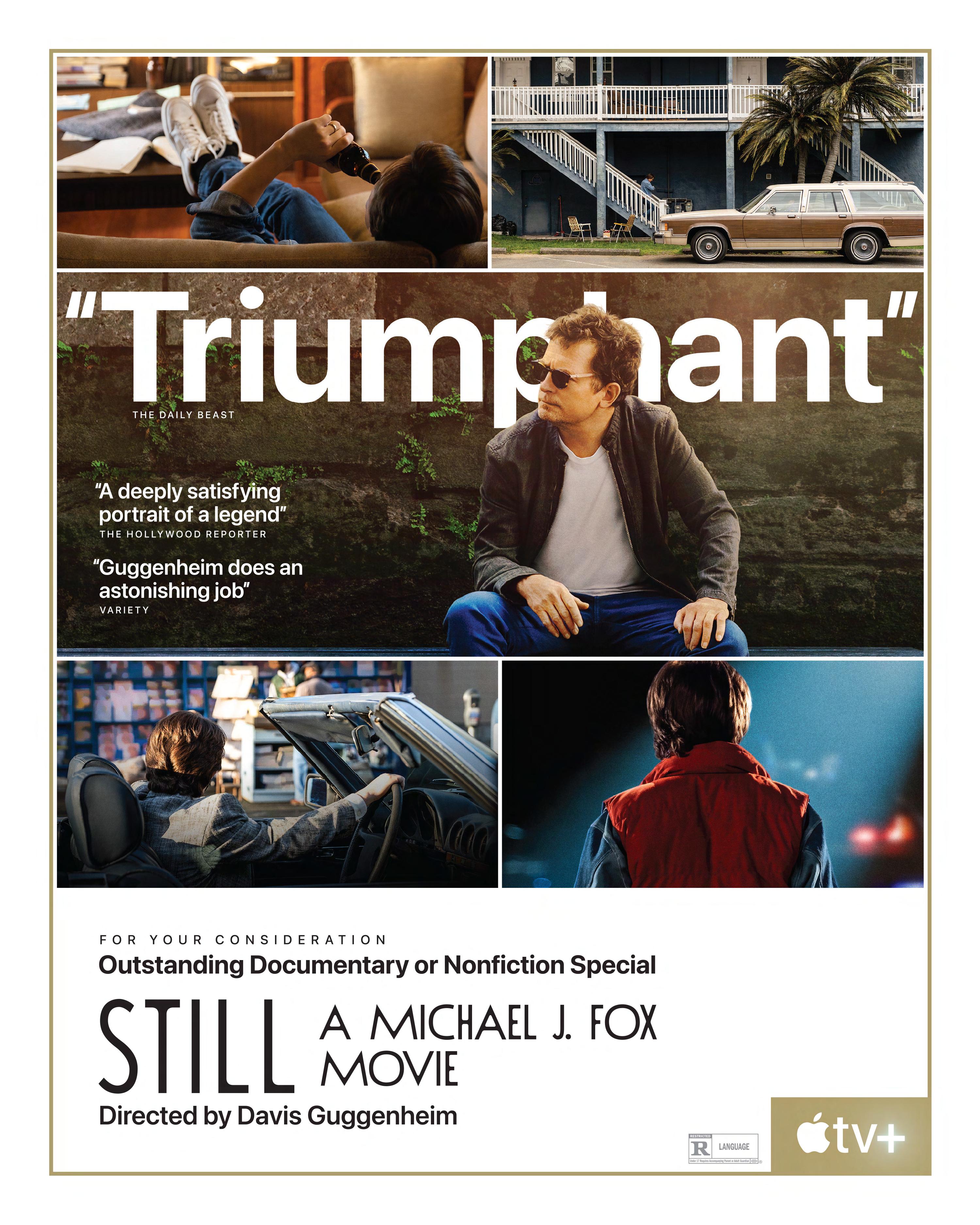
Main Title Sequences
Narrative Portals
Main title
designers Andy Hall , Nadia Tzuo , Katrina Crawford , Mark Bashore and Kirk Shintani blend new ideas with old inspirations
By Ryan Fleming
Often overlooked thanks to the ‘skip intro’ button, a great main title sequence serves as an entry point into whole other world. And this Emmy season has its share of series based on previous properties, which presents the main title designers with the challenge of linking existing inspirations with new stories.
The Last of Us maps out a fungal network across the world in an evolution of the opening credit sequence from the 2013 video game. Inspired by Tolkien’s original works, The Lord of the Rings: The Rings of Power blends magic and science to create cymatic patterns. As a Game of Thrones prequel, House of the Dragon mirrors the previous show’s camera movements, but with a new focus on bloodlines.
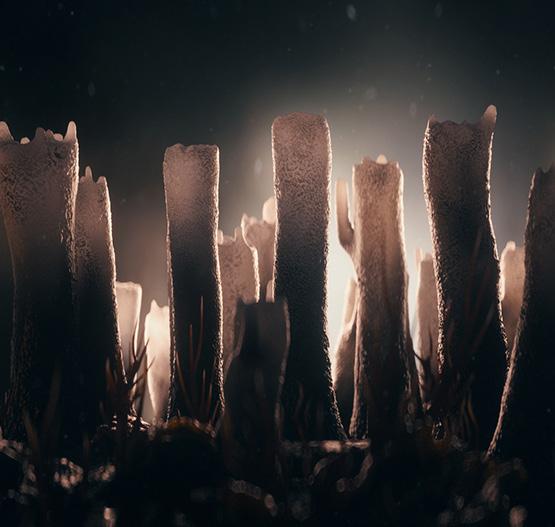
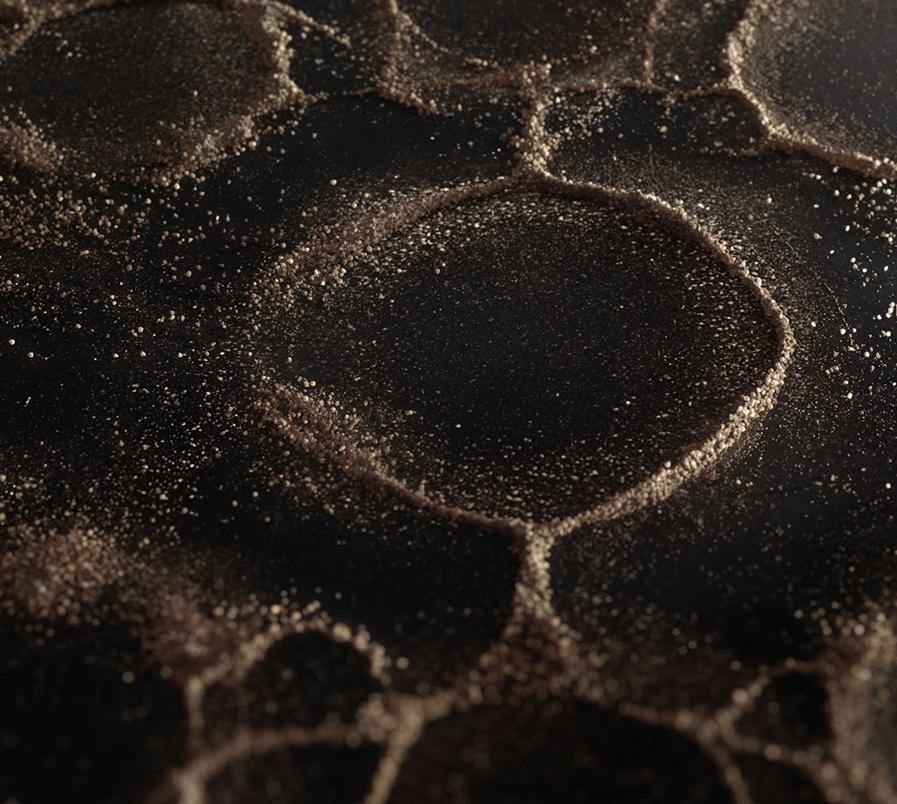
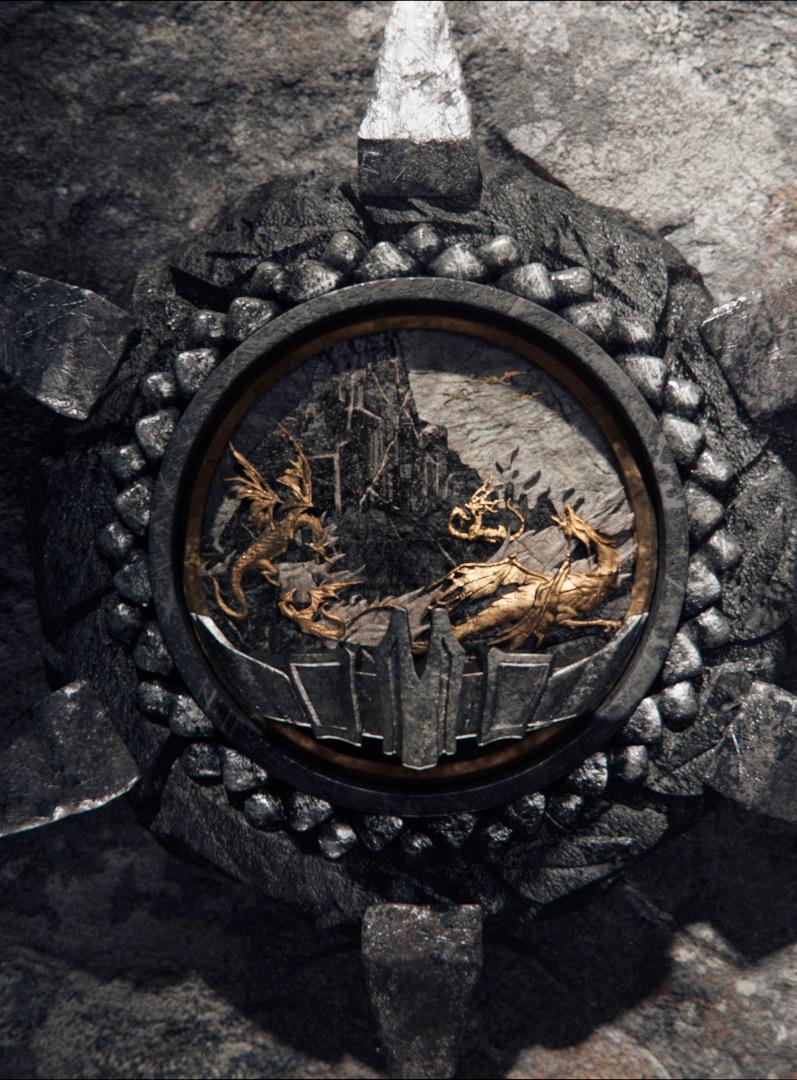
52 DEADLINE.COM/ AWARDSLINE
CRAFT SERVICES HBO/PLAINS OF YONDER/PRIME VIDEO
The Last of Us
The Lord of the Rings: The Rings of Power
House of the Dragon
The Last of Us
Following the 2013 video game, which had its own opening title sequence, it was important for creative studio Elastic’s main title designers Nadia Tzuo and Andy Hall to set their design for television apart.
“They wanted it to evolve in the same way that the show evolved beyond the game and be able to stand on its own merits,” Hall says. And those unfamiliar with the game, in which mankind is hit by a lethal fungal infection, needed to have that context. “They wanted it to set up the tone and the idea of what the show was about, but not rely on what people’s associations of the game was.”
While the video game’s title focused on the human impact of the fungal spread, The Last of Us series creators Neil Druckmann and Craig Mazin were looking for a title sequence that explored the growth of the infection itself. “They didn’t want to see any dystopia-cliché in the title,” Tzuo says. “They only wanted to see the fungus—how it grows, how it spreads and how it resembles a developing species.” The theme shows the fungus spreading and evolving into forms resembling manmade structures. “It’s like they’re thriving at the same time the human civilization is on a decline.”

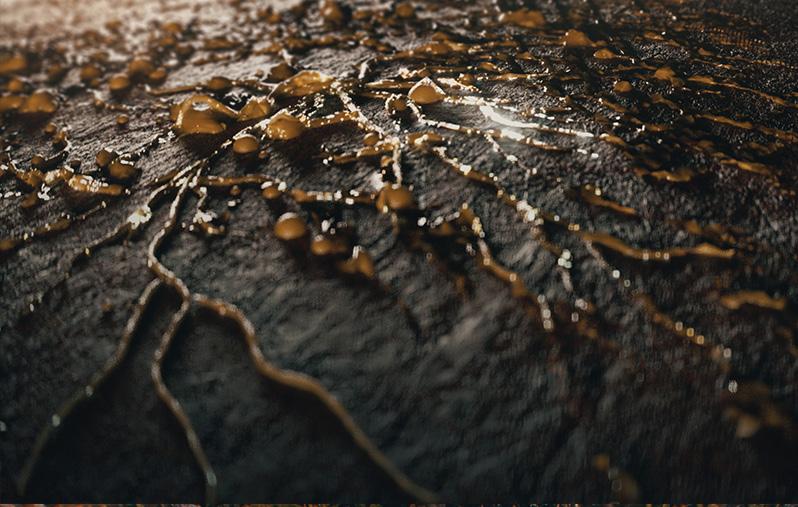
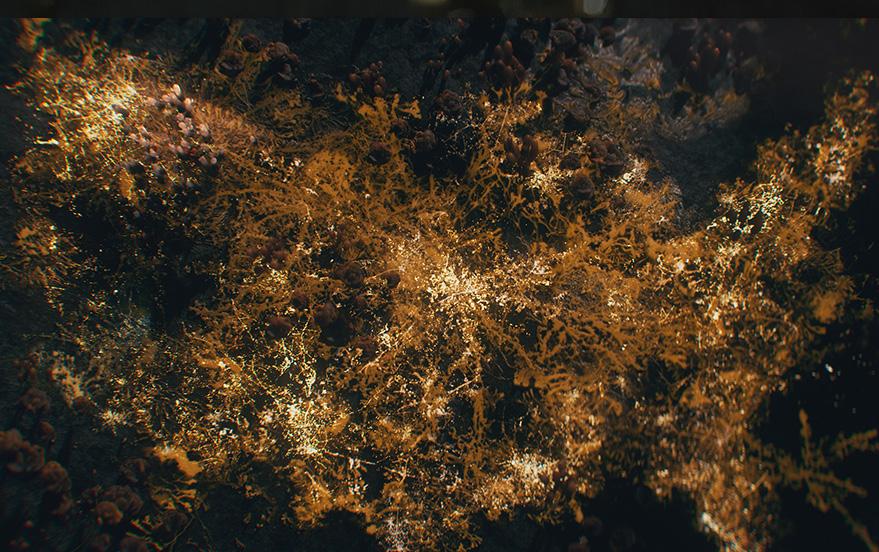
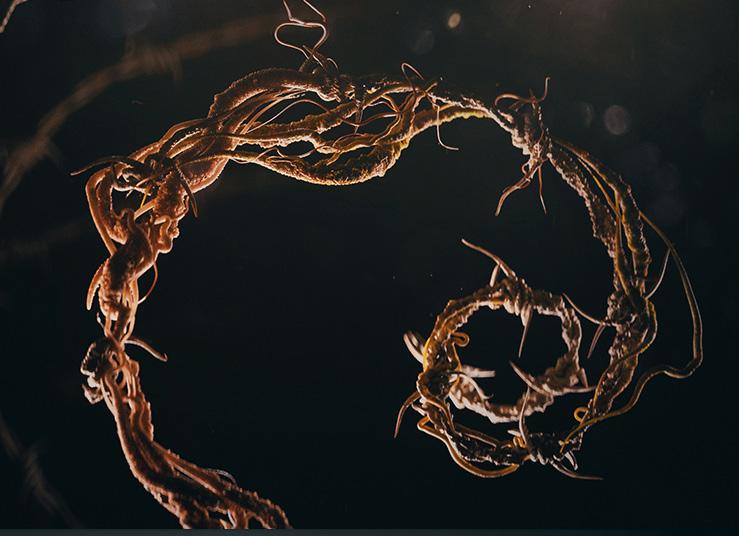
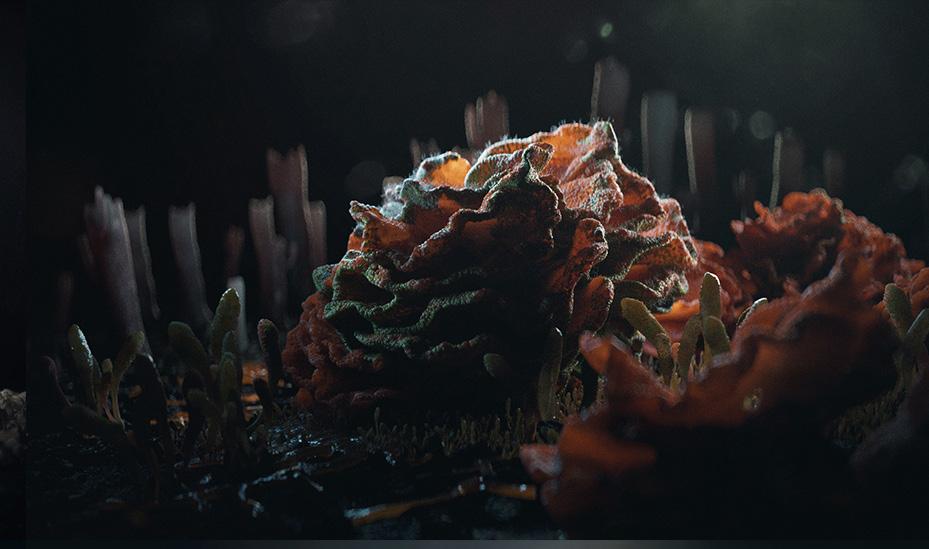
To achieve the appearance of organic growth, Hall and Tzuo did extensive research into how fungus grows. “We got elements from the show in terms of the aesthetic,” says Hall, “but Craig always wanted a look at the unique influence of nature.” This research allowed them to include a color palette mirroring the “acidic nature” of the fungus and to use the color to influence how certain things appear onscreen, such as creating a growth pattern that simulates a map of the United States.
The final product looks deceptively simple, though the process was actually complex, which Hall says is indicative of nature itself. “It’s what nature does so brilliantly,” he says. “It makes the complexity look simple in a way that is elegant and beautiful and refined. That’s always what we are trying to do.”
“Most of the time, our job is to simplify the concept down to, ‘What’s the spirit of the show?’” says Tzuo. “The title sequence is really like a book cover and it gets the audience prepared for the show and sets the tone for the story.”
DEADLINE.COM/ AWARDSLINE 53
The main title sequence charts the growth of the Cordyceps fungus.
Main Title Sequences
The Lord of the Rings: The Rings of Power
For The Rings of Power main title, Plains of Yonder designers Katrina Crawford and Mark Bashore looked to Tolkien’s creation myth of angelic figures singing the universe into being. “Tolkien felt that music was almost the center of the universe,” Bashore says. “That was perfectly in sync with our view of filmmaking, which is that audio can be more important than visuals.” The goal was to blend audio and visual together for the main title theme, having the music seemingly create the imagery.

“The idea of music creating something brought us to cymatics,” Crawford says. Cymatics is the natural phenomenon of complex patterns emerging through the displacement of small particles on a flat surface when vibrations are introduced. As the song changes in the main title, the particles shift into new patterns created through the vibrations. “It’s hypnotic and beautiful,” she says, “always shifting and changing… representing elements of transformation.” Using cymatic patterns created the perfect solution of something almost magical that is grounded in reality, which creates a portal into the world of Tolkien for the viewer.


With such a storied world, it was essential for Crawford and Bashore to design patterns that would give a new viewer an idea of what they were coming into, but also convey a deep appreciation of Tolkien by layering in hidden meanings for the fans. “It’s beautiful for everybody, but it’s pretty deep in its meaning,” says Bashore.

“Ideally, we want to make it meaningful to everyone, whether they have knowledge of Tolkien’s world or not,” says Crawford. Given only 90 seconds to convey those ideas, she says the biggest question is how do they bring someone into a new world in a limited amount of time? “We’re not novel in saying that for us title sequences are a bit like a portal, right?”
Creating that portal is always a challenge, but Bashore says that’s why he loves designing the entry point into these worlds. “The psychology, mood and inner logic of a show really compressed into an abstract film is very fun to do and a huge challenge,” he says. “Some people don’t care about the titles and they hit the skip button, but we have found that a lot of people really do watch them, and I think viewers feel it when you do it right.”
54 DEADLINE.COM/ AWARDSLINE
PLAINS OF YONDER/PRIME VIDEO
Carefully crafted vibrations caused small particles, like sand, to make patterns.
CRAFT SERVICES

Main Title Sequences
House of the Dragon
Since Elastic’s Kirk Shintani was an integral part of designing the main title sequence for Game of Thrones , it made sense for him to return to design a new one for House of the Dragon . “Originally, we tried to find a balance between the story we needed to tell but we also had to be really aware that it needed to have some tie to the original show,” says Shintani. Set nearly 200 years before the events of the original series, House of the Dragon focuses mainly on House Targaryen and its line of succession once the king dies. “The concept boiled down to the family tree and how we show the relationships between the different members of the warring families.”
Though the design of the new main title sequence was more focused on a singular family line, it was important to incorporate some nods to the original. “There is a big thing that maybe people don’t consciously think about as Game of Thrones ,” he says. “There is a specific language that we’ve built with these flyover cameras, moving from place to place, and that’s something we definitely wanted to keep in the show.” While the camera movements originally tracked locations on the map of Westeros,

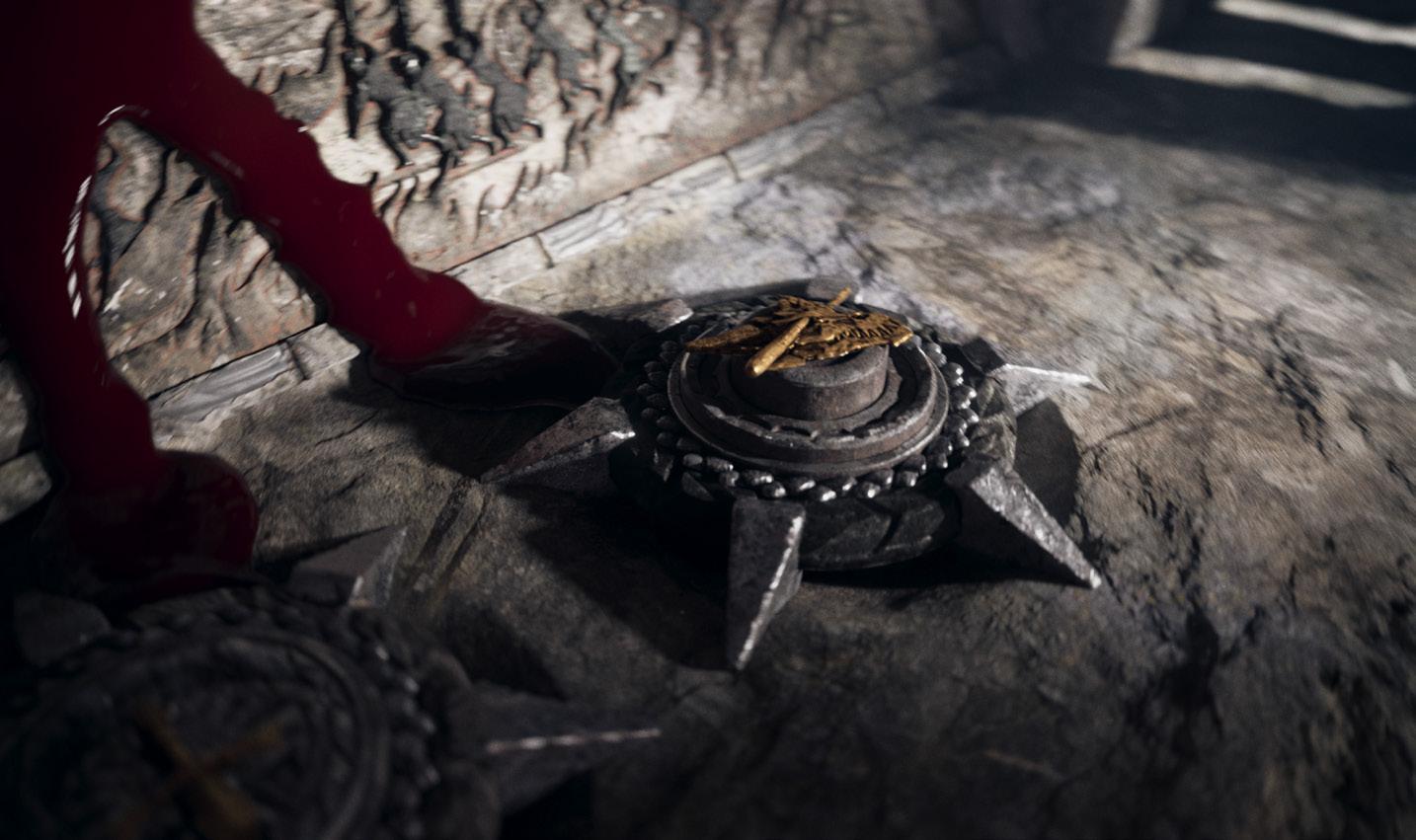
the new movements follow the bloodline of the Targaryen royal lineage.
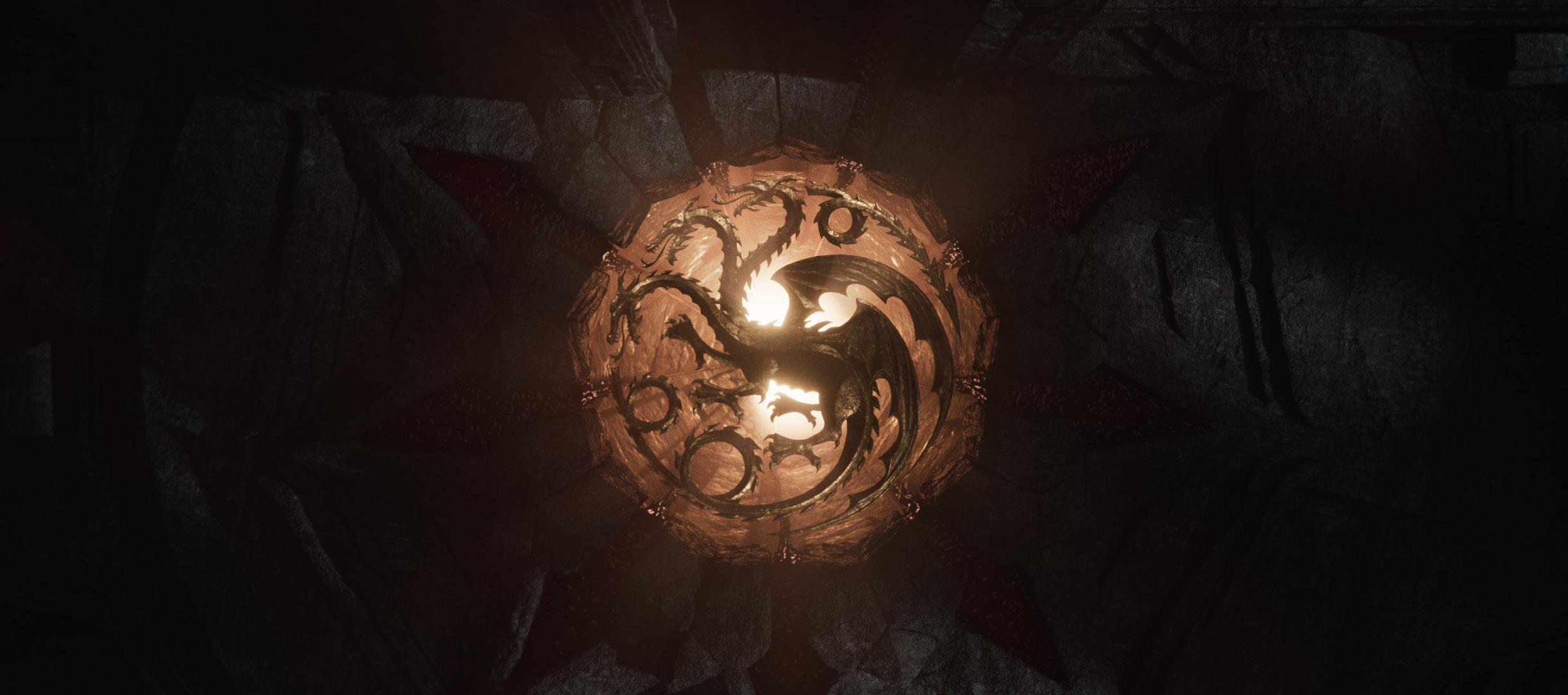
“The world map was very much intentional of showing people where you are in each episode,” he says about the original Game of Thrones title. “Whereas for this one, the world’s already been defined and the key locators that we’re trying to explain aren’t locations, it’s the people’s positions in the family line.” The camer a follows the blood flowing through a labyrinthine structure, as it passes through sigils of different family members and creates a root-like formation of the family tree.
The initial challenge Shintani faced on the project was how to make the design feel like Game of Thrones without becoming a copy, but the focus quickly became about creating a main title that truly spoke to the story of House of the Dragon , and expanding upon that world. “One of the things that we really want to emphasize with our main titles, specifically speaking about House of the Dragon ,” he says, “is that we wanted to be able to lean on the idea that the title changes every episode and gives the viewers something else to look forward to. We really wanted to add to the narrative of the show in our own little way.” ★
56 DEADLINE.COM/ AWARDSLINE
HBO
The flow of blood creates the family tree of House Targaryen.
CRAFT SERVICES
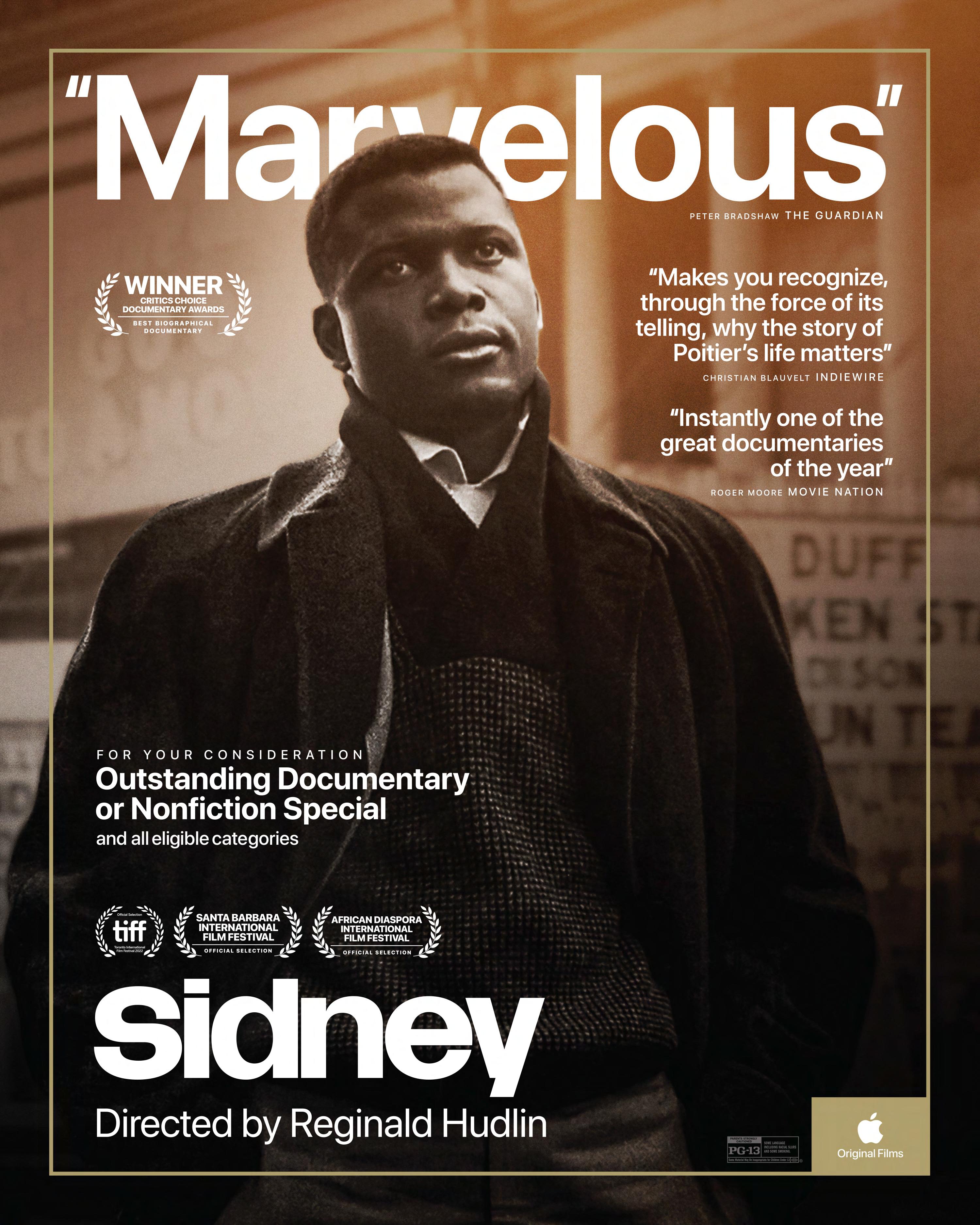
Jason Segel
Jessica Williams
Christa Miller
Brett Goldstein
Portrait Gallery / Comedy
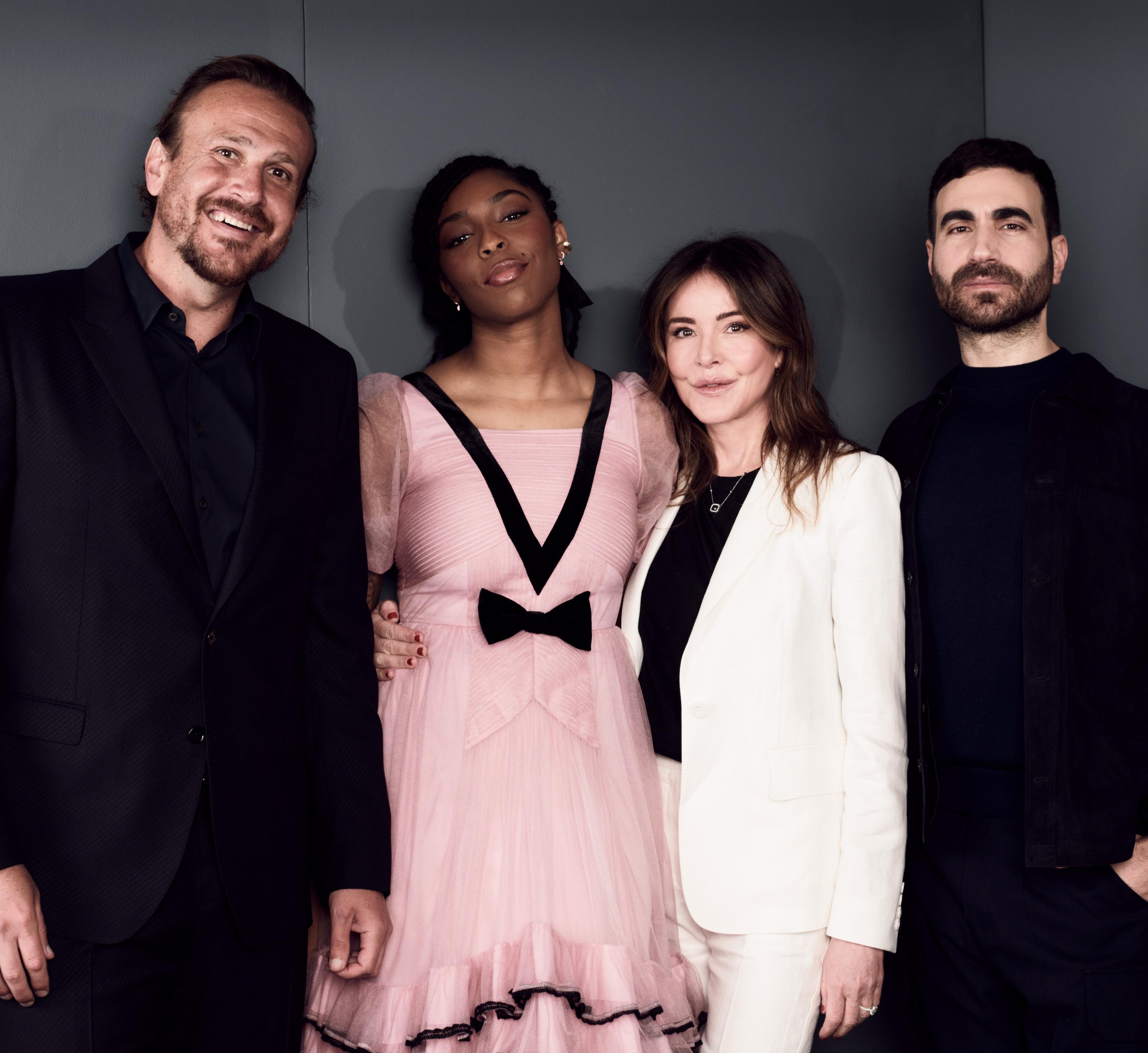 Over two days at the Directors Guild of America, the cream of the Comedy crop gathered for Deadline's flagship celebration of TV.
Photographs by MICHAEL BUCKNER
Over two days at the Directors Guild of America, the cream of the Comedy crop gathered for Deadline's flagship celebration of TV.
Photographs by MICHAEL BUCKNER
58 DEADLINE.COM/AWARDSLINE
SHRINKING

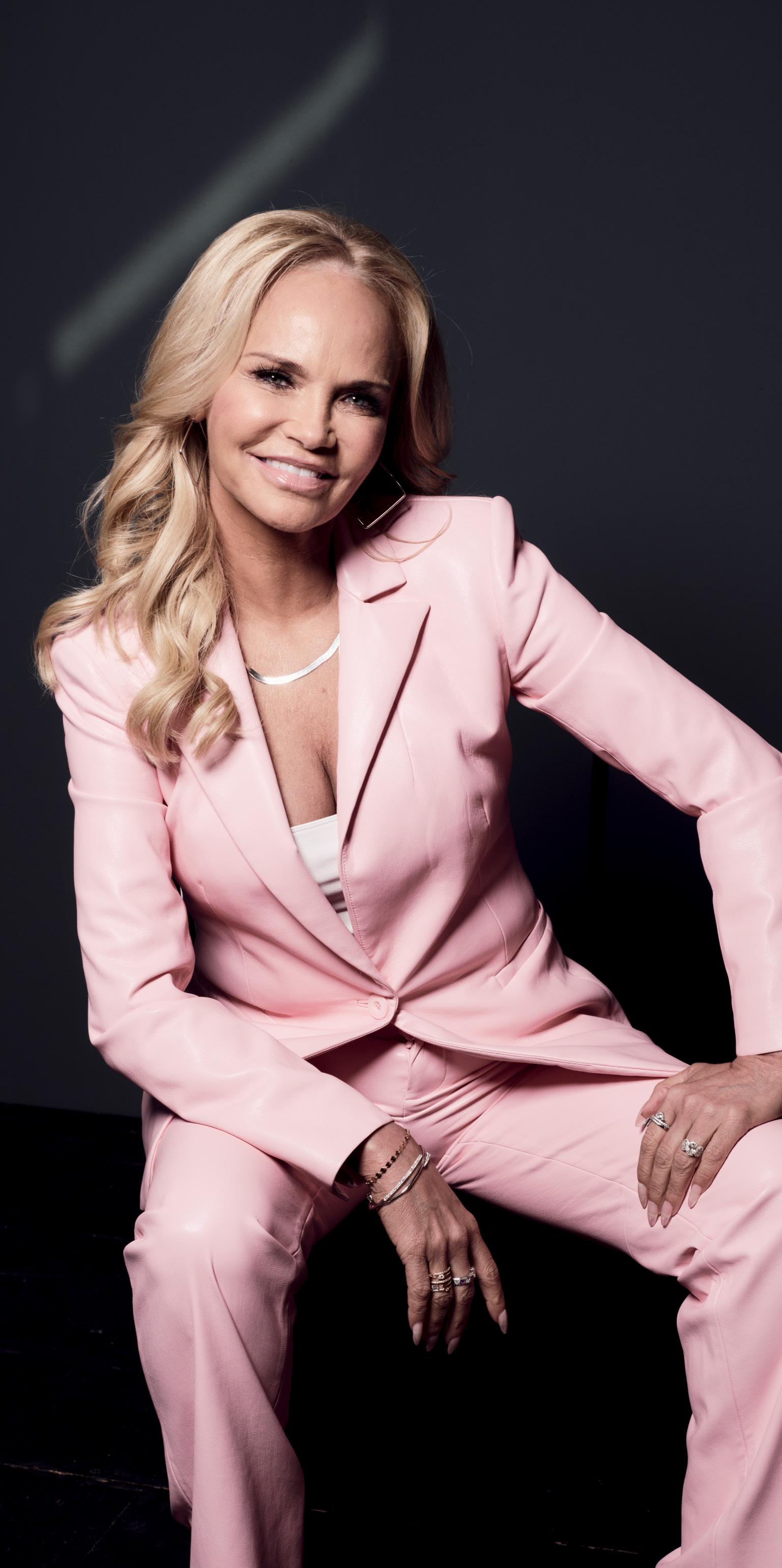 Natasha Lyonne POKER FACE
Natasha Lyonne POKER FACE
DEADLINE.COM/AWARDSLINE 59
Kristin Chenoweth SCHMIGADOON!
 Steven Yeun
Steven Yeun
60 DEADLINE.COM/AWARDSLINE
Ali Wong
BEEF
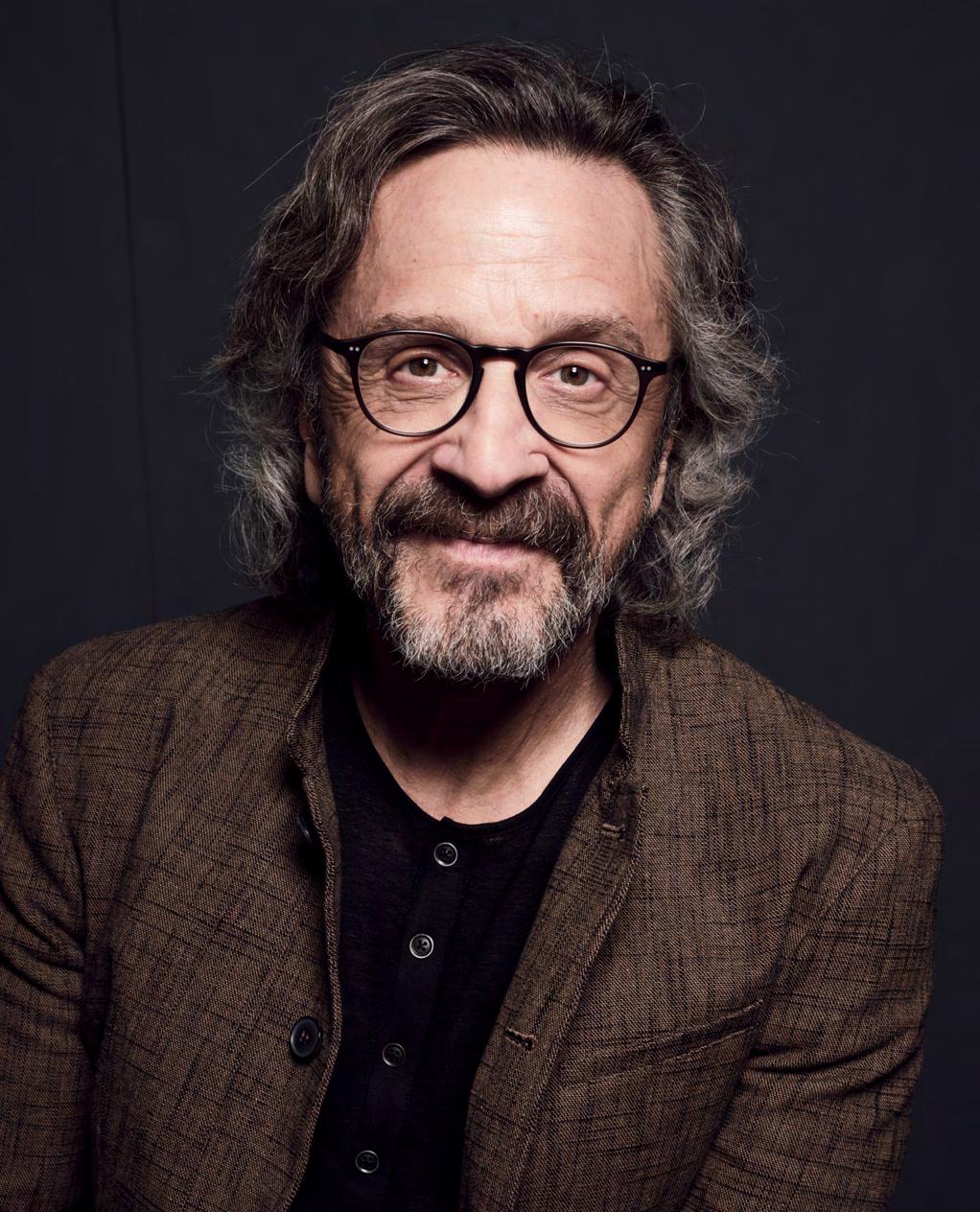
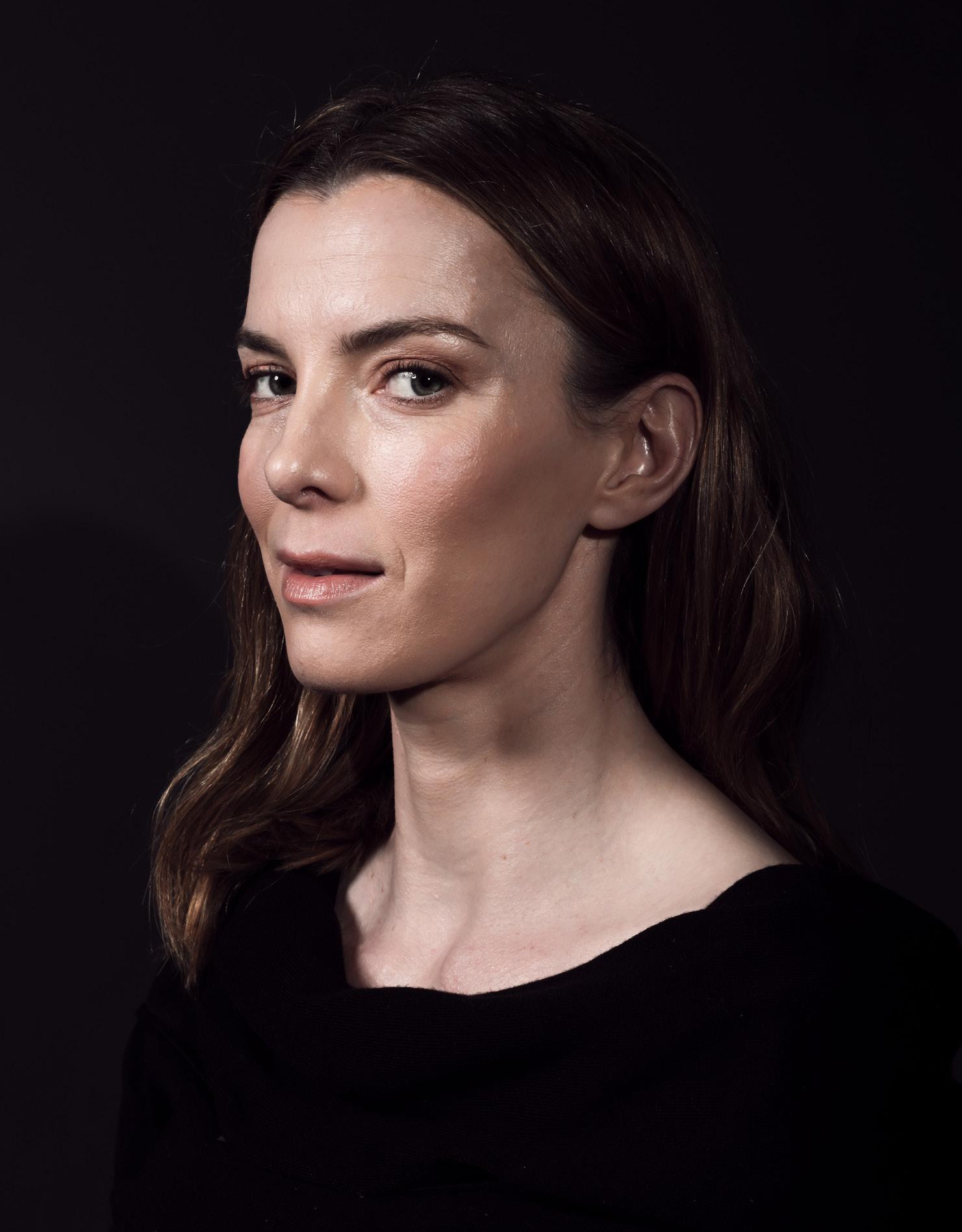

 Betty Gilpin
MRS. DAVIS
Marc Maron
MARC MARON: FROM BLEAK TO DARK
Joel McHale
ANIMAL CONTROL
Kathryn Hahn
TINY BEAUTIFUL THINGS
Betty Gilpin
MRS. DAVIS
Marc Maron
MARC MARON: FROM BLEAK TO DARK
Joel McHale
ANIMAL CONTROL
Kathryn Hahn
TINY BEAUTIFUL THINGS
Michaela Jaé Rodriguez
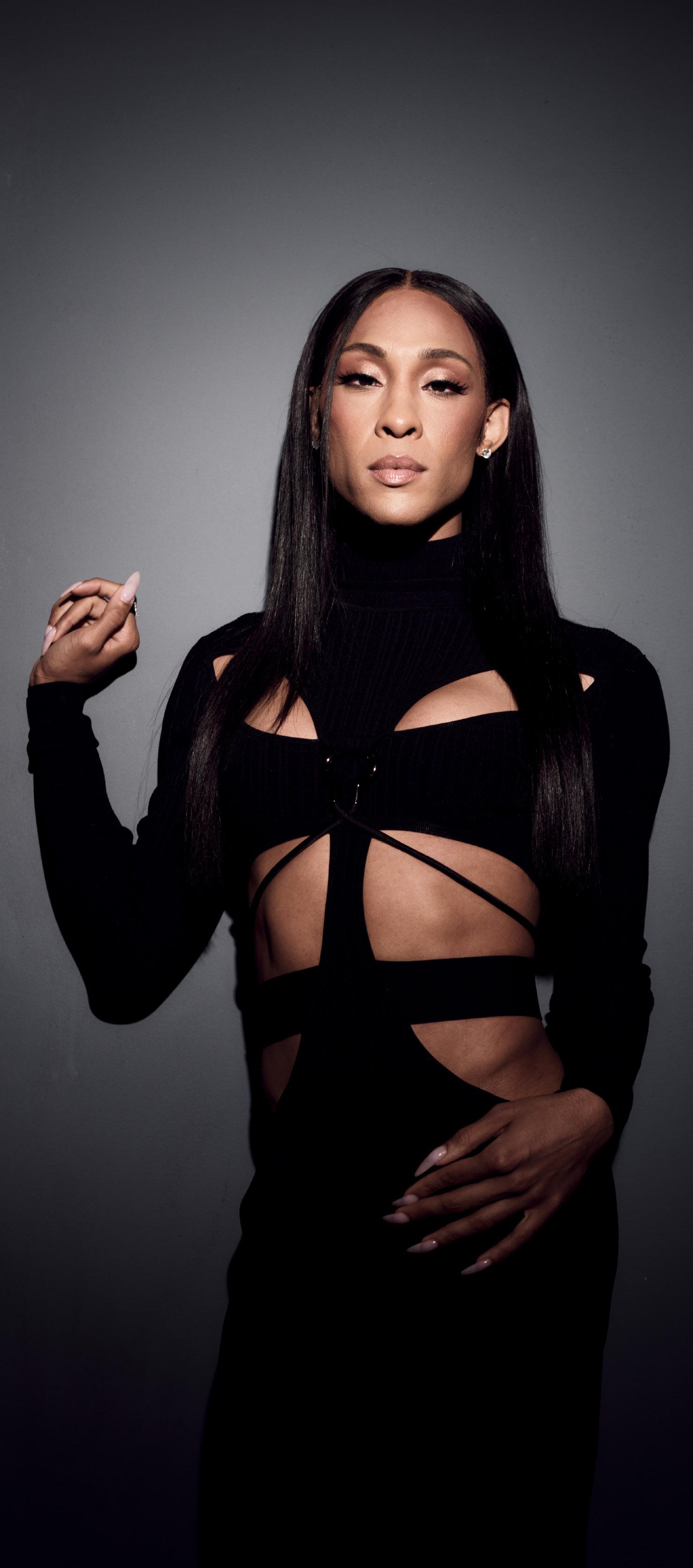
Elle Fanning THE GREAT

LOOT 62 DEADLINE.COM/AWARDSLINE
HISTORY OF THE WORLD, PART II
Sheryl Lee Ralph

Quinta Brunson

Lisa Ann Walter
ABBOTT ELEMENTARY
Ike Barinholtz
DEADLINE.COM/AWARDSLINE 63
WEIRD: THE AL YANKOVIC STORY
Tricia Fukuhara
Marisa Davila
Ari Notartomaso

Cheyenne Isabel Wells
GREASE: RISE OF THE PINK LADIES

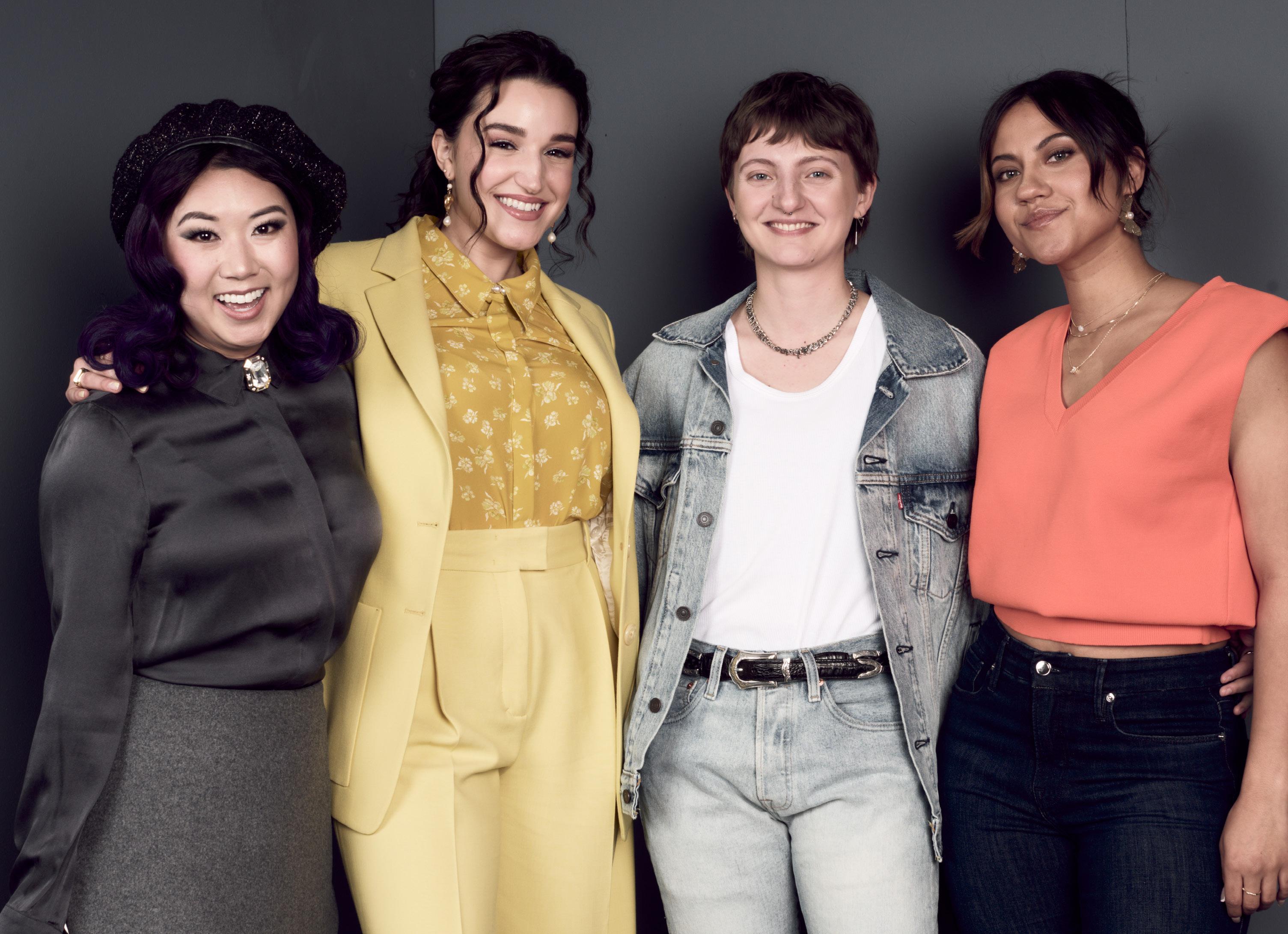
Eric Appel
64 DEADLINE.COM/AWARDSLINE
Janine Nabers
Dominique Fishback
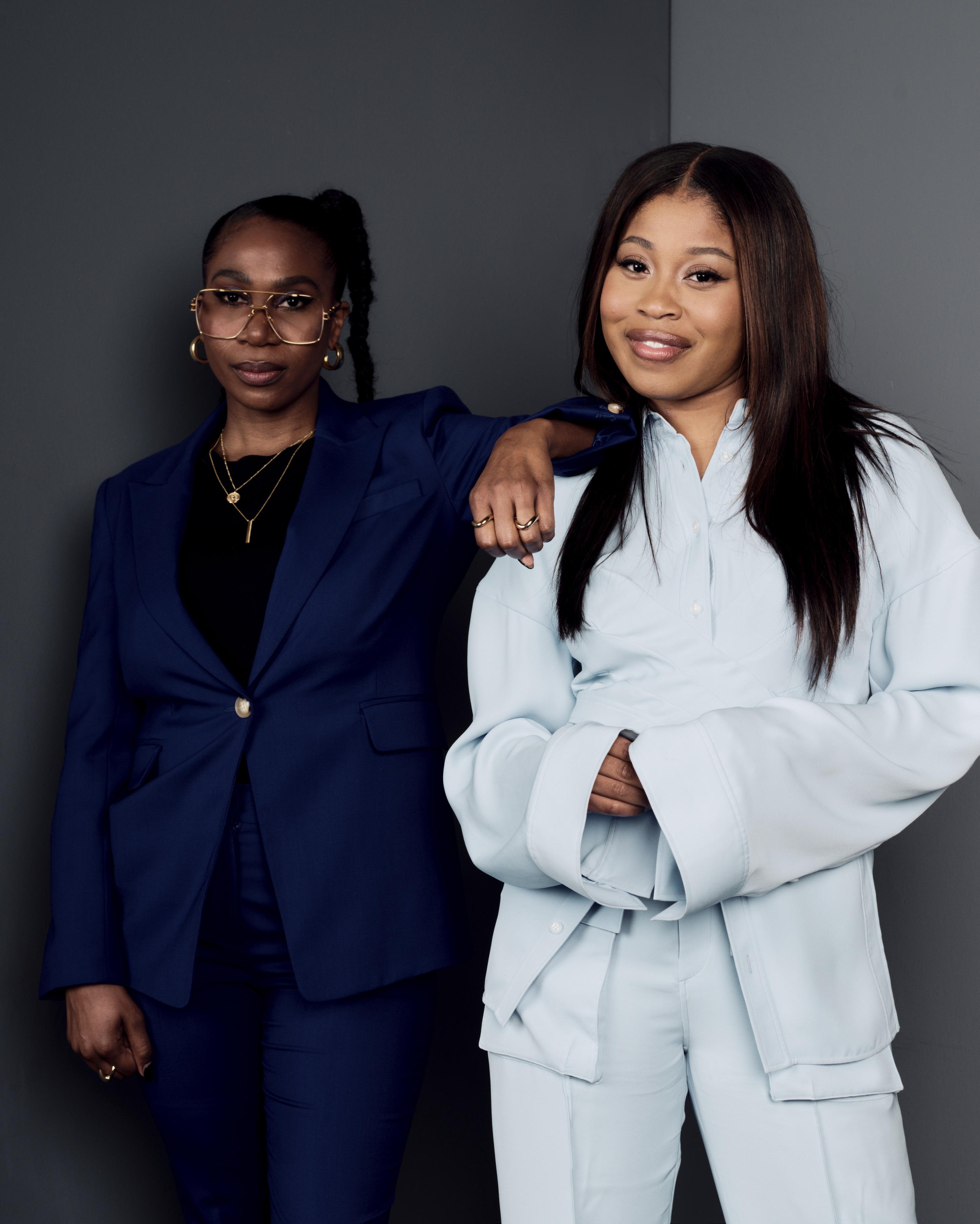
SWARM

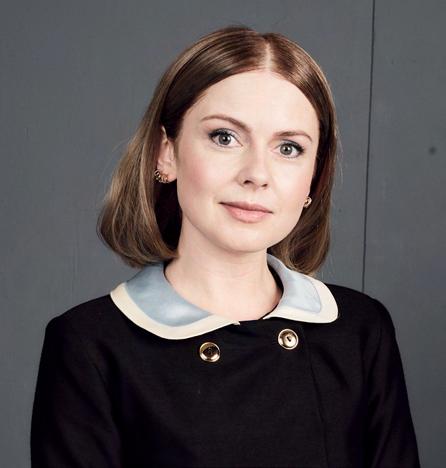

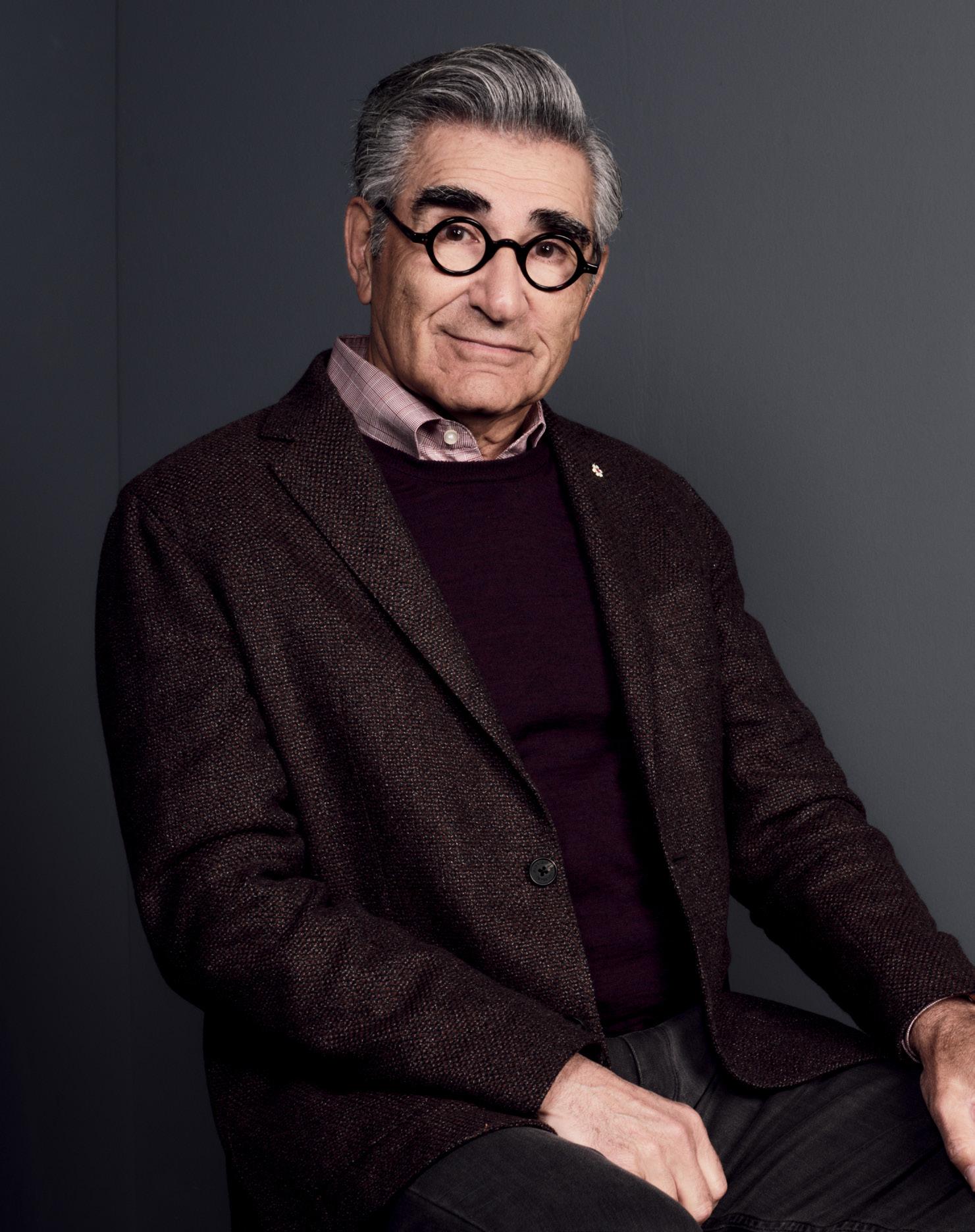

PARTY DOWN
Zoë
Chao
Kerry Washington UNPRISONED
Eugene Levy
THE RELUCTANT TRAVELER WITH EUGENE LEVY
Rose McIver Utkarsh Ambudkar GHOSTS
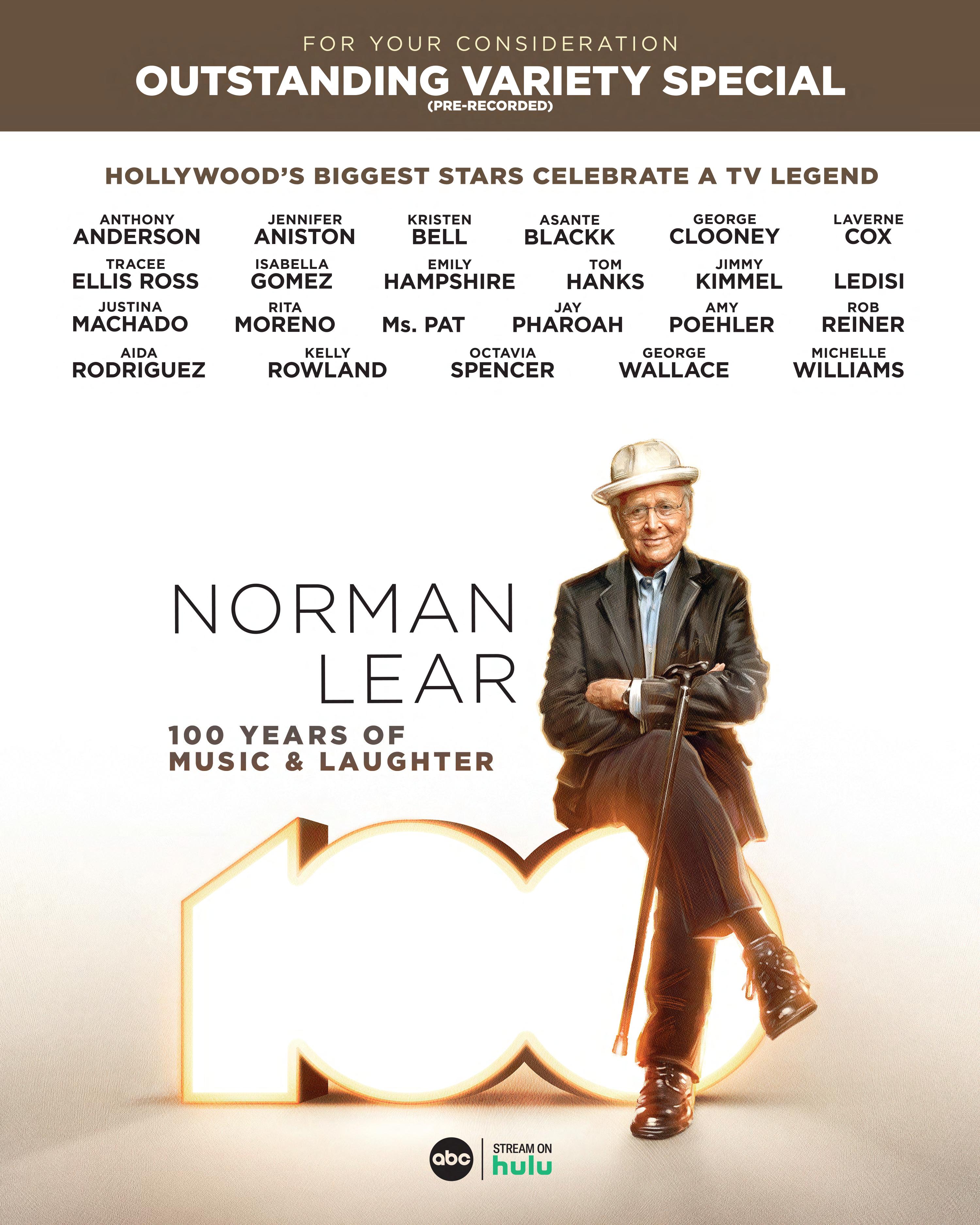
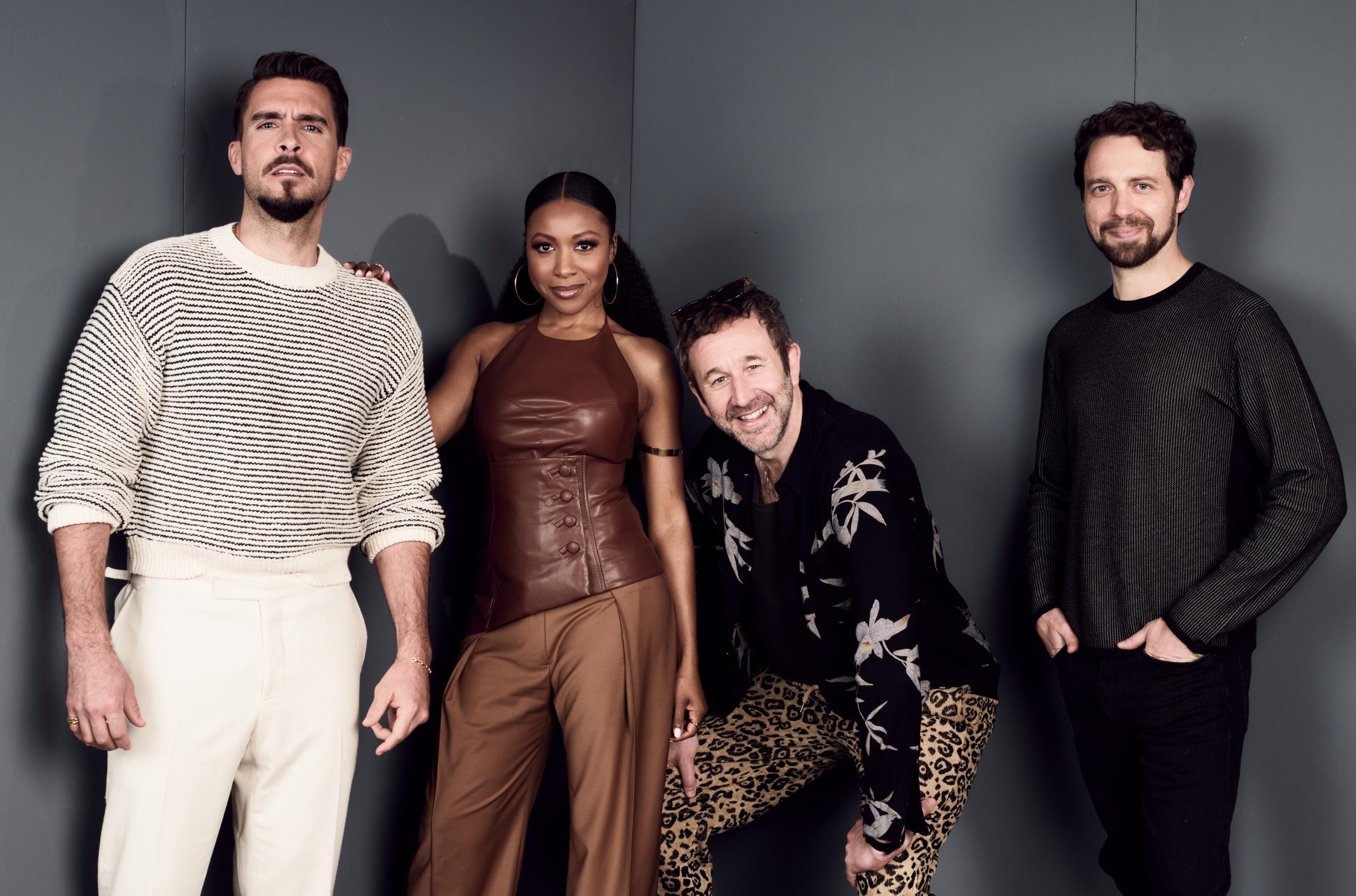

Josh Segarra Gabrielle Dennis Chris O'Dowd David West Read THE BIG DOOR PRIZE Mohammed Amer MO 68 DEADLINE.COM/AWARDSLINE


May 9, 2023 Royce Hall, UCLA Deadline Sound & Screen: Television
70 DEADLINE.COM/AWARDSLINE MATT WINKELMEYER/DEADLINE VIA GETTY IMAGES
David Johansen


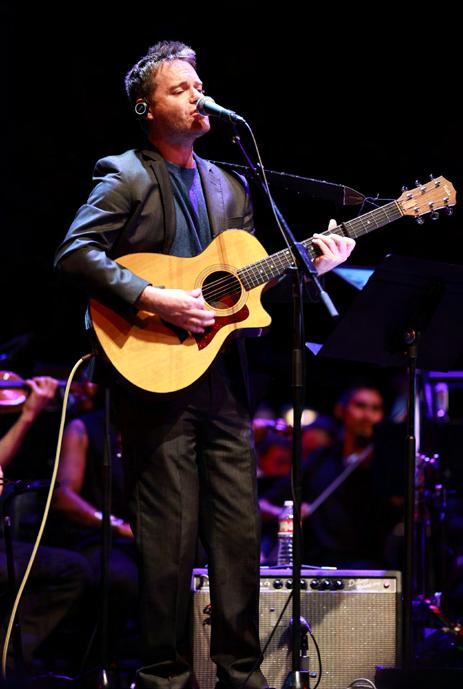
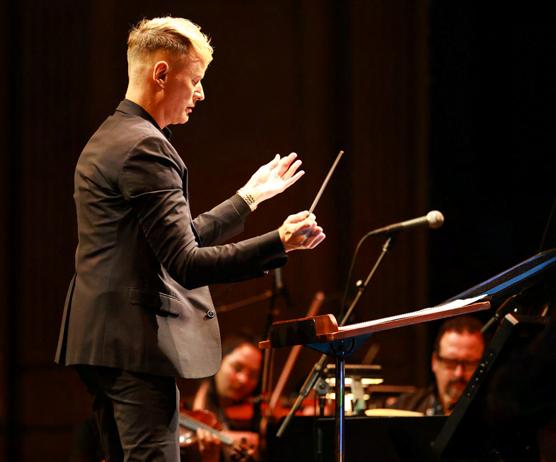
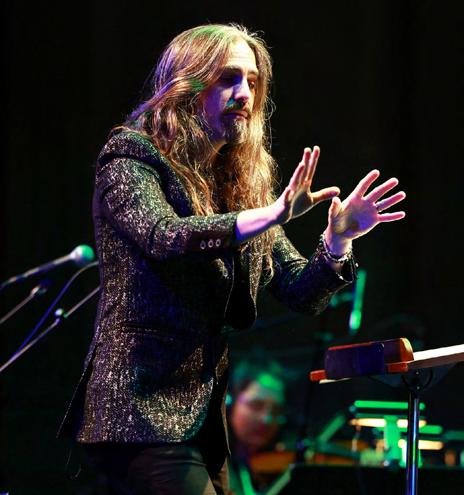
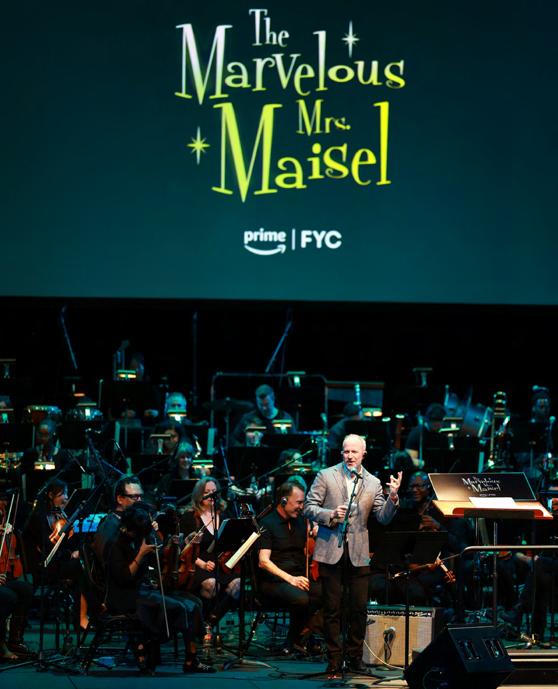
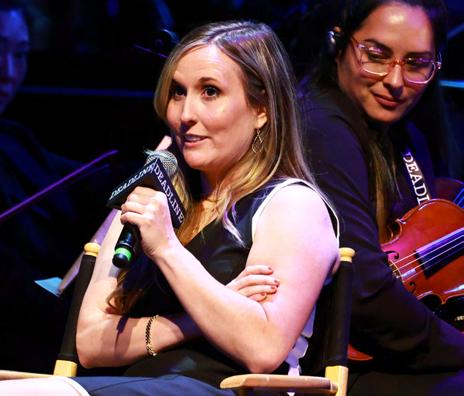

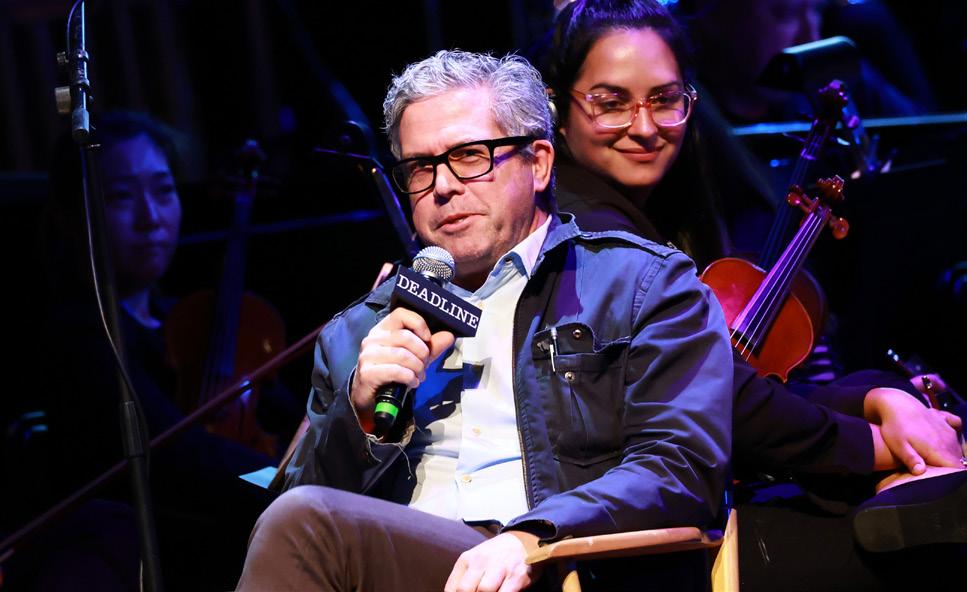

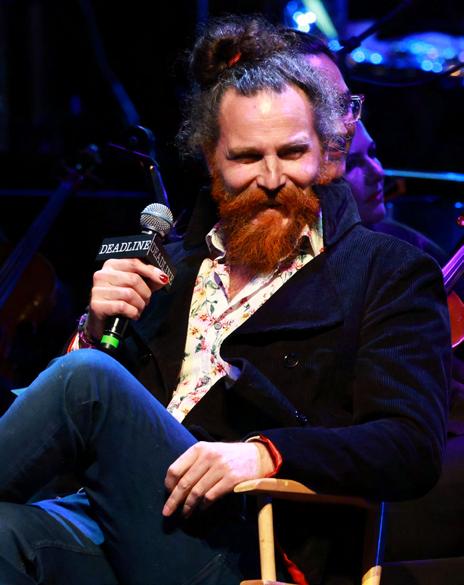
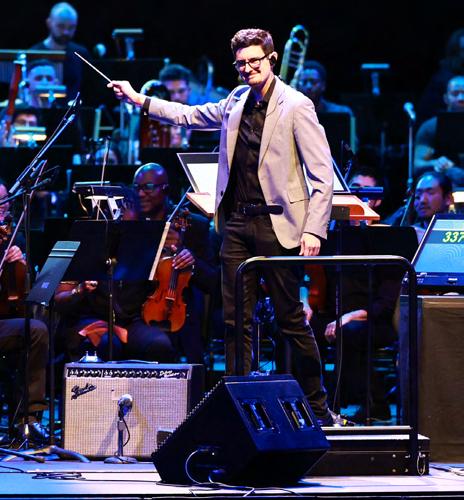 1. John Powell
2. Brian Tyler
3. Tim Phillips
4. Bear McCreary
5. Jack Douglas and David Johansen
6. From left: Siddhartha Khosla, Anna Schubert and Stephen Tucker
7. Tom Howe
8. Curtis Moore
9. Rachael Moore
10. Cristobal Tapia de Veer
1. John Powell
2. Brian Tyler
3. Tim Phillips
4. Bear McCreary
5. Jack Douglas and David Johansen
6. From left: Siddhartha Khosla, Anna Schubert and Stephen Tucker
7. Tom Howe
8. Curtis Moore
9. Rachael Moore
10. Cristobal Tapia de Veer
Deadline Sound & Screen: Television May 9, 2023
Hall, UCLA 1 2 3 4 5 6 7 8 72 DEADLINE.COM/AWARDSLINE 9 10 11 MATT WINKELMEYER/DEADLINE VIA GETTY IMAGES
11. Jarryd Elias
Royce

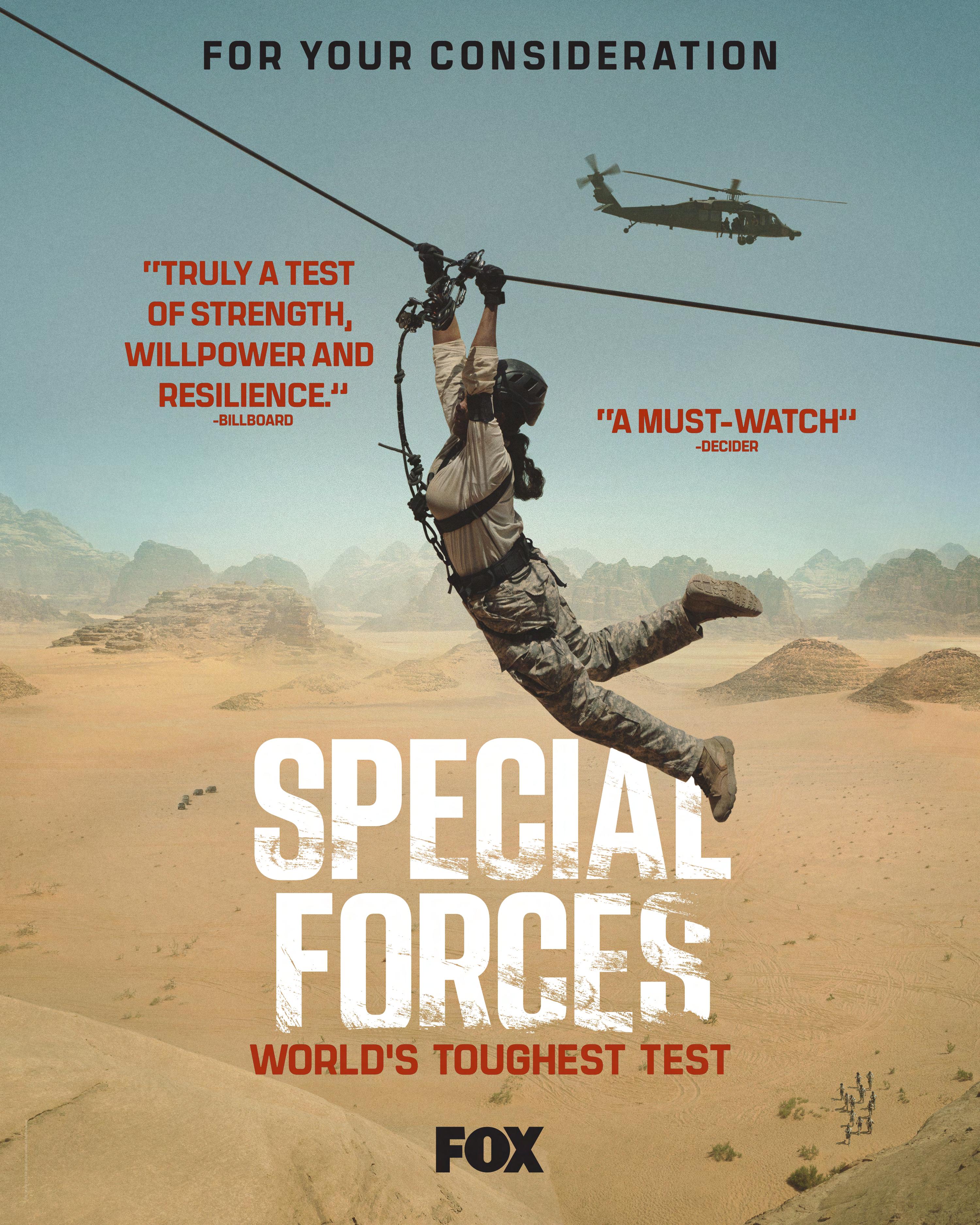






 By Lynette Rice
How Hannah Waddingham went from the stage to the locker room in Ted Lasso
By Lynette Rice
How Hannah Waddingham went from the stage to the locker room in Ted Lasso










 —Ryan Fleming
—Ryan Fleming

 By Matt Carey
By Matt Carey














 BY RYAN FLEMING
BY RYAN FLEMING














 From left: Natasha Lyonne as Charlie Cale and Benjamin Bratt as her nemesis Cliff LeGrand; Charlie with the stray dog she picked up on the road, and in the Vegas trailer where she lived before she went on the run.
From left: Natasha Lyonne as Charlie Cale and Benjamin Bratt as her nemesis Cliff LeGrand; Charlie with the stray dog she picked up on the road, and in the Vegas trailer where she lived before she went on the run.






















 Adrien Brody
Benjamin Bratt
Cherry Jones Chloë Sevigny Dascha Polanco
David Castañeda Ellen Barkin Hong Chau
John RatzenbergerJoseph Gordon-Levitt
Judith Light
Larry Brown Lil Rel Howery Luis Guzmán Nick Nolte
Adrien Brody
Benjamin Bratt
Cherry Jones Chloë Sevigny Dascha Polanco
David Castañeda Ellen Barkin Hong Chau
John RatzenbergerJoseph Gordon-Levitt
Judith Light
Larry Brown Lil Rel Howery Luis Guzmán Nick Nolte











































 Over two days at the Directors Guild of America, the cream of the Comedy crop gathered for Deadline's flagship celebration of TV.
Photographs by MICHAEL BUCKNER
Over two days at the Directors Guild of America, the cream of the Comedy crop gathered for Deadline's flagship celebration of TV.
Photographs by MICHAEL BUCKNER

 Natasha Lyonne POKER FACE
Natasha Lyonne POKER FACE
 Steven Yeun
Steven Yeun



 Betty Gilpin
MRS. DAVIS
Marc Maron
MARC MARON: FROM BLEAK TO DARK
Joel McHale
ANIMAL CONTROL
Kathryn Hahn
TINY BEAUTIFUL THINGS
Betty Gilpin
MRS. DAVIS
Marc Maron
MARC MARON: FROM BLEAK TO DARK
Joel McHale
ANIMAL CONTROL
Kathryn Hahn
TINY BEAUTIFUL THINGS





























 1. John Powell
2. Brian Tyler
3. Tim Phillips
4. Bear McCreary
5. Jack Douglas and David Johansen
6. From left: Siddhartha Khosla, Anna Schubert and Stephen Tucker
7. Tom Howe
8. Curtis Moore
9. Rachael Moore
10. Cristobal Tapia de Veer
1. John Powell
2. Brian Tyler
3. Tim Phillips
4. Bear McCreary
5. Jack Douglas and David Johansen
6. From left: Siddhartha Khosla, Anna Schubert and Stephen Tucker
7. Tom Howe
8. Curtis Moore
9. Rachael Moore
10. Cristobal Tapia de Veer

